LAWYER UVA
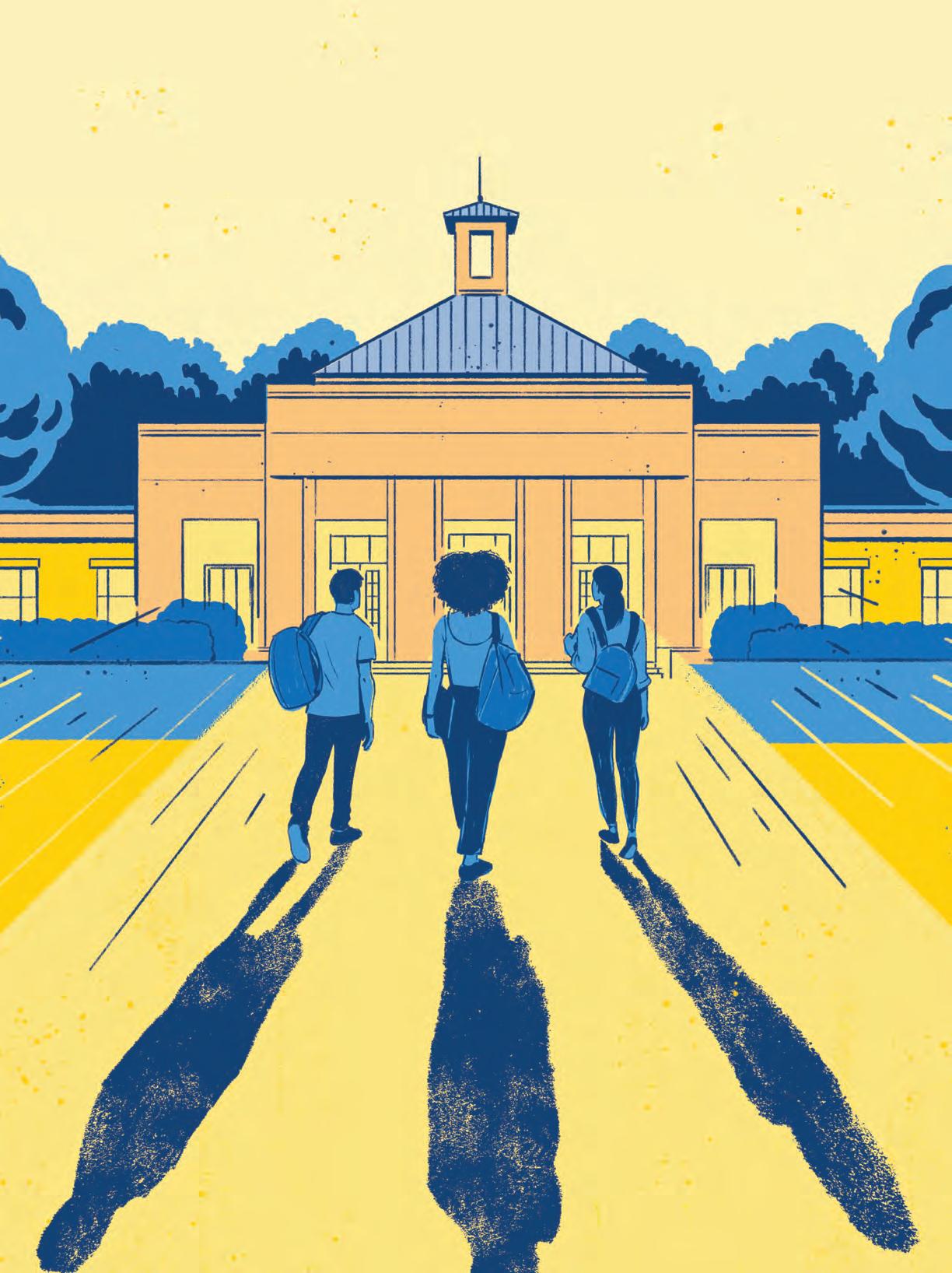
FALL 2022
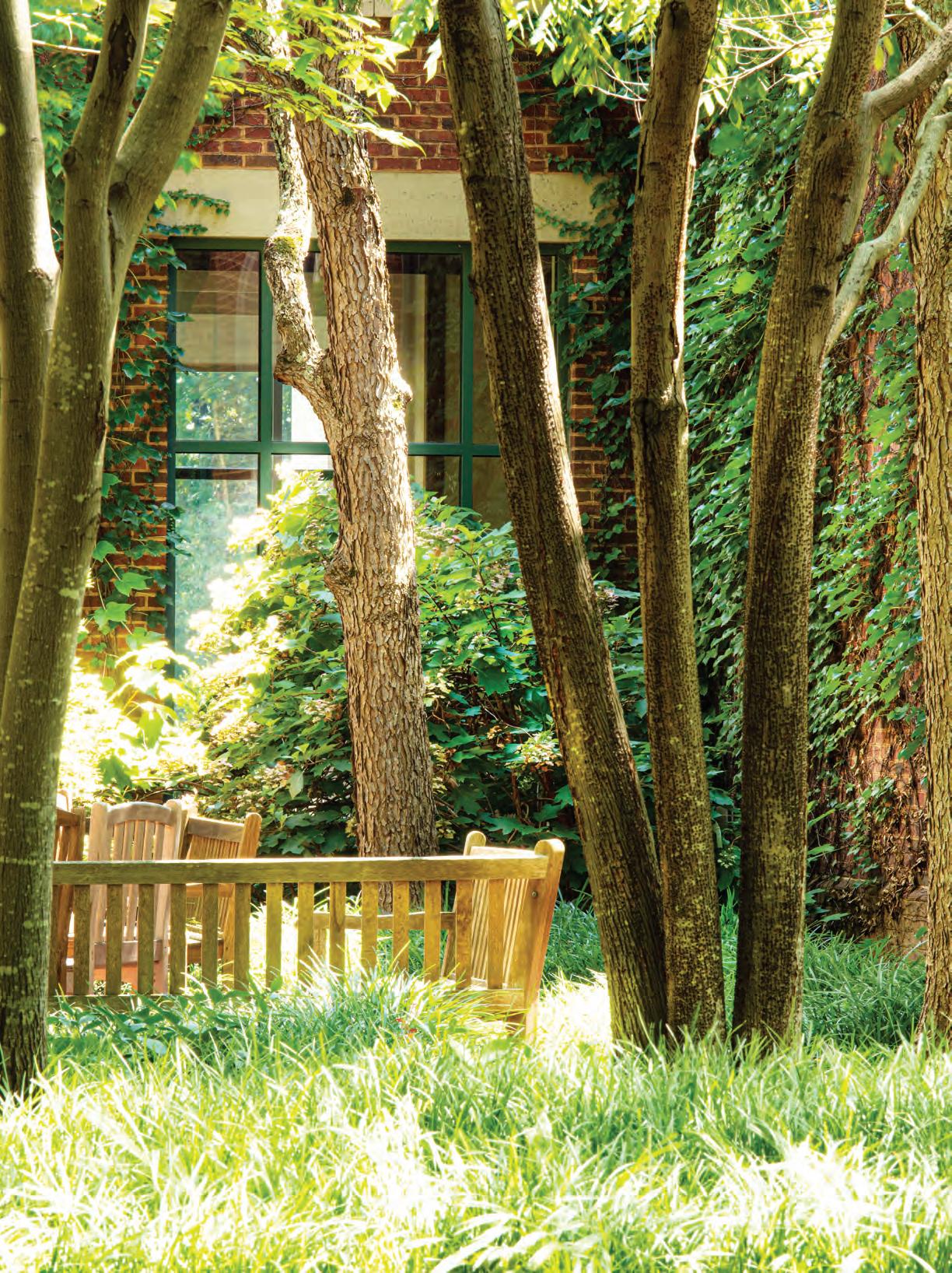 ROBERT LLEWELLYN
From Dean Risa Goluboff
ROBERT LLEWELLYN
From Dean Risa Goluboff
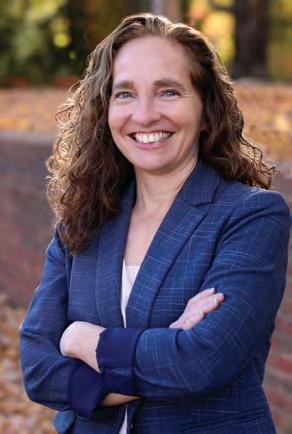
IT HAS BEEN A JOY THIS FALL to return to visiting some of the thousands of UVA Law alumni and friends spread across the country. Stops have included Seattle, the San Francisco Bay Area, Los Angeles, Atlanta and Washington, D.C. I look forward to seeing even more of you as far as Florida and Texas this winter and spring. The enormous pride and pleasure I take in the reach of our alumni network is magnified by the privilege of meeting you in person.
In my travels, I frequently speak with alumni about what changes here at the Law School. The essentials of a UVA Law education remain unaltered: We continue to value intellectual rigor and the free exchange of ideas within a close-knit and collegial community. We a lso continue to prepare g raduates for a lifetime of professional success, public service and leadership. What has changed is who has access to that education. Who can become a U VA lawyer has expanded dramatically over the course of our 200-year history. Likewise, the amount and types of support we provide students has grown immensely.
There is perhaps no better example of how we perpetually strive to become the best version of ourselves than our new Roadmap Scholars Initiative. This t wo-year program helps talented first-generation and low-income college students chart their course to elite law schools and beyond. It introduces these promising f uture lawyers to the law and the legal profession, and provides the financial, academic and mentoring support they need to succeed in both applying to and attending law school. Our cover story describes this bestin-class program and profiles many of the ter rific students in the first cohort we welcomed to Charlottesville in June.
The Roadmap program is one of the many ways we are expanding access to UVA Law and the legal profession. We have also increased funding for scholarships, summer and post graduate fellowships, and loan forgiveness. The wrap-around support we provide our Roadmap Scholars parallels what we offer every U VA Law student, which includes financial aid coun seling that begins at admission and includes budgeting and other financial planning skills; personalized career counseling that extends past graduation as recent alumni seek career changes; and co-curricular programming from leadership training to academic support to faculty, peer and alumni mentoring. Together
with our unique intel lectual community and extraordinary faculty, this support both facili tates a n unparalleled student experience and helps transform our students into exceptional lawyers.
The hallmarks of both our singular student experience and our scholarly excellence are in f ull view in this issue of U VA Lawyer. You will meet Associate Professor Alison Gocke, an expert in energy and environmental law, who joined us this fall along with Elizabeth Rowe and Amanda Frost (profiled in the spring issue). You will read about the new Center for Empirical Studies in Law, a record-setting 1L class, recent successes in several of our 24 clinics, four consecutive years of more than 100 clerkship placements, and myriad other student, faculty and alumni achievements.
As always, we owe our successes to you, our alumni and friends, wherever in the world your careers a nd lives have taken you. The UVA Law community begins on our Grounds, but you carry it with you when you g raduate, and you bring the world back to us when you return. Thank you for the countless ways you support our institution, and for making it pos sible for a new generation of UVA Law students to flourish and succeed here and everywhere.



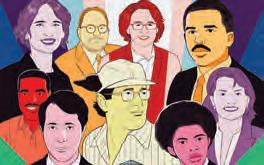

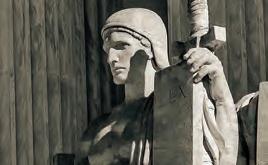
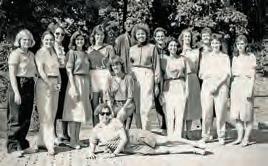
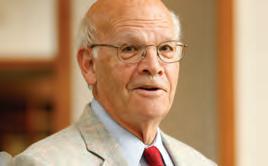
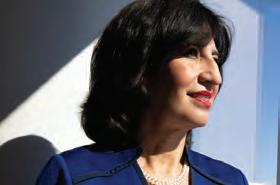
2 U VA LAWYER | Fall 2022 UVA LAWYER FALL 2022 VOLUME 47 | NUMBER 1 DEAN’S MESSAGE 1 QUOTED 4 DISCOVERY 6 SHARING 22 INSIDER 23 5/10/15/25 32 FACULTY NEWS 57 VITA 73 CLASS NOTES 83 ALUMNI BOOKS 96 IN MEMORIAM 98 THE LAST WORD 100 FEATURES DEPARTMENTS CONTENTS EDITOR-IN-CHIEF Mary M. Wood ASSOCIATE EDITOR Melissa Castro Wyatt PHOTO EDITOR Warren Craghead CLASS NOTES AND ALUMNI BOOKS EDITOR Denise Forster CONTRIBUTING EDITOR Mike Fox CONTRIBUTORS Marian Anderfuren Mark F. Bernstein ’89 Julia Davis Mike Fox Jane Kelly Katelyn Waltemyer ART DIRECTION & DESIGN Bill Womack | Helios Inc. PRODUCTION ASSISTANTS Kirsten Niemann Allison Profeta | Helios Inc. COVER ILLUSTRATION Alex Fine ADDITIONAL PHOTOS Dan Addison UVA Communications Jesús Pino Aguilar Photography Ian Bradshaw Tom Cogill Tom Daly Julia Davis Juliet Hatchett ’15 Robert Llewellyn Sanjay Suchak PRINTER Progress Printing Plus PRINTED IN U.S.A. Sizing Up the Supreme Court Term Planning Her ‘Rewirement’ A Roadmapto Law School Taking Pride Breast Cancer Bonds Two Alumnae Swimming in the Celebrity Fishbowl 24 28 37 44 50 54 New Look at History of Virginia Law Women 56 In Memoriam: An Advocate and a Mentor 71 Right Place,Right Time 73
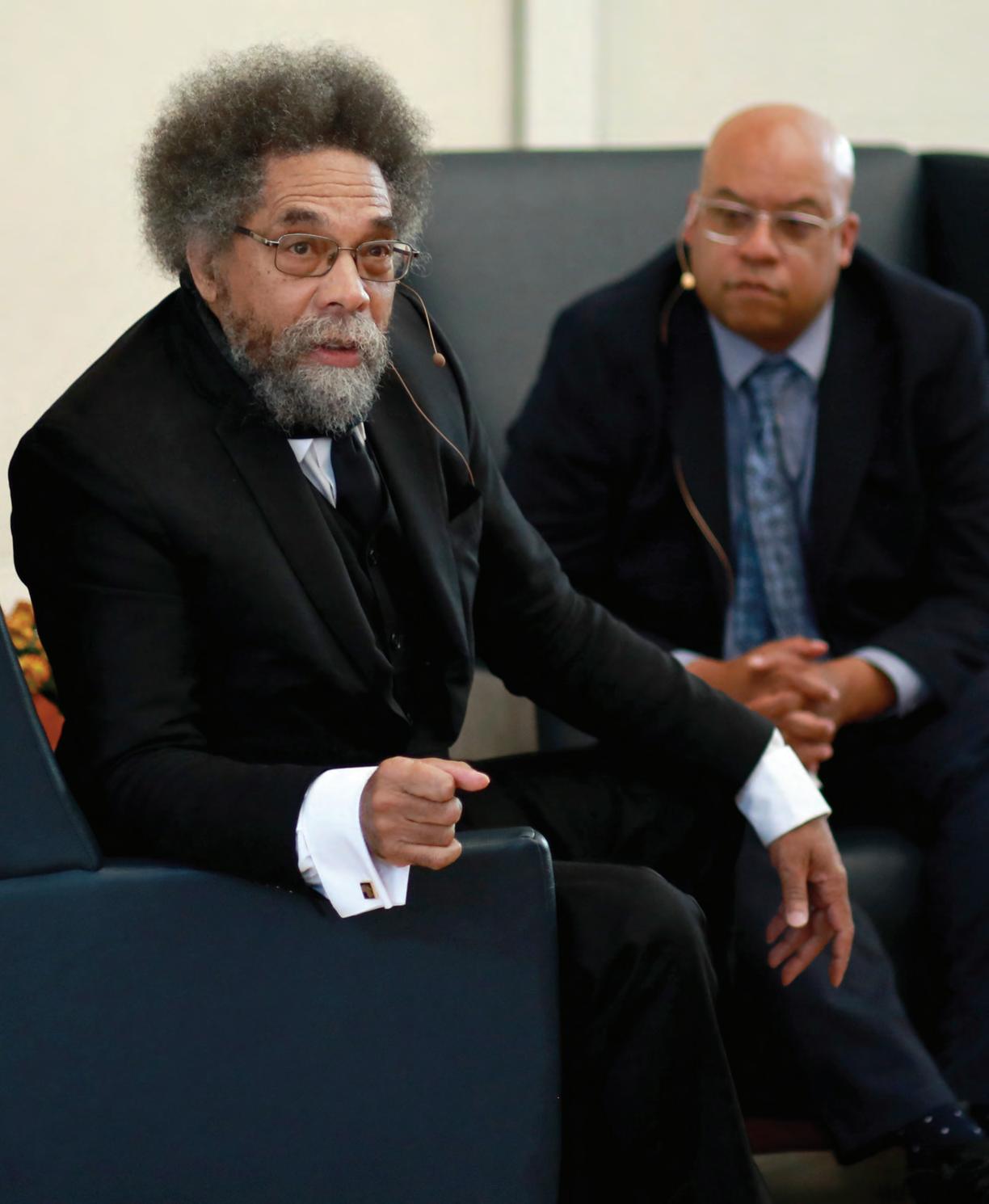
Fall 2022 | U VA LAWYER 3 SNAP SHOT
❱ Philosophy professor and author Cornel West joined a conversation with Mark C. Jefferson, assistant dean for diversity, equity and belonging at the Law School, on Oct. 13 for the Meador Lecture on Law and Religion.
JULIA DAVIS
to make predictions about what Elon Musk will do.”
—PROFESSOR GEORGE S. GEIS (The Street)
“She’s brilliant and humble, open, honest, and she has the deter mination and perseverance to succeed at anything she does.”
—PROFESSOR KIMBERLY JENKINS ROBINSON , discussing U.S. Supreme Court Justice Ketanji Brown Jackson, her Harvard Law School roommate, following Jackson’s confirmation (UVA Today)
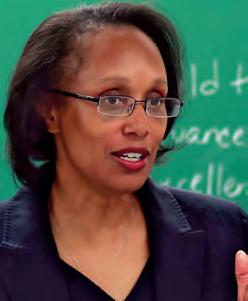
“On the surface, ‘bees are fish’ looks absurd. Because no one thinks bees are fish. But that’s not what the court is saying.”
—PROFESSOR LAWRENCE B. SOLUM , on a California appeals court ruling that bees can be listed as threatened or endangered under the state Endangered Species Act (Bloomberg Law)
“Companies insist that the world will be far better off so long as they can collect, use, and share intimate data, but as far as I can tell, they haven’t provided much proof of concept.”
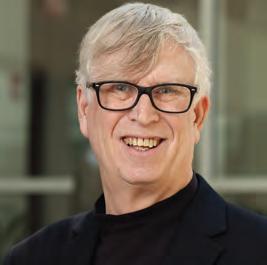
—PROFESSOR DANIELLE CITRON , in an article adapted from her book (Wired)
“If we do reduce the cases down to the bottomline numbers, we see that the court that we have now, under Chief Justice John Roberts, by far the most pro-business court in the last hundred years.”
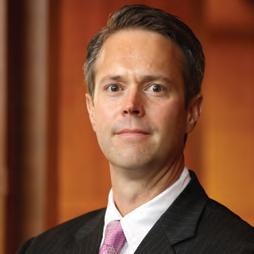
—PROFESSOR MITU GULATI , discussing his new co-authored paper (The Indicator From Planet Money)
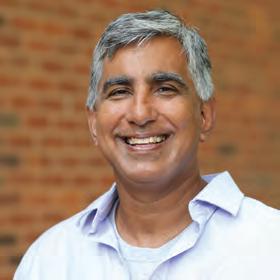
“We’re looking at the impact on reproductive rights, the impact on the physician/ patient relationship, and the impact on other aspects of state support for families and potential legislative responses. Suddenly, the decision has made people think much more about these issues and what these issues mean in a larger context. We’re still figuring it out, but we are starting to learn.”
—PROFESSOR NAOMI CAHN , explaining a new UVA Law course, After Dobbs, co-taught with Professors Anne Coughlin and Bonnie Gordon (The 19th)
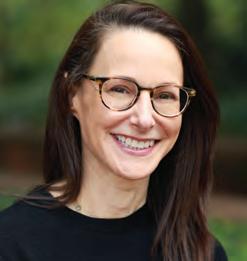
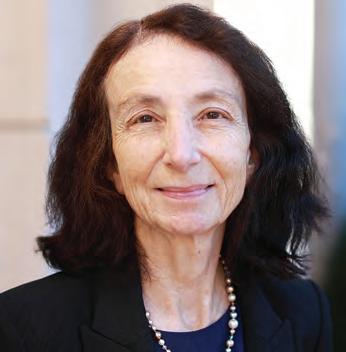
“It’s always dangerous
4 U VA LAWYER | Fall 2022
“[W]hen we talk about ma ternal mortality and mater nal morbidity, it feels like we’re just talking about what happens to women. By death, it happens to the women, but it happens to their families, it happens to their partners, it happens to their children, it happens to their mothers, it happens to their—to their communities. So hence the af tershock is for everyone who is left behind picking up the pieces.”
—TONYA LEWIS LEE ’91 , director of “Aftershock,” a film that documents Black maternal mortality (The Washington Post)
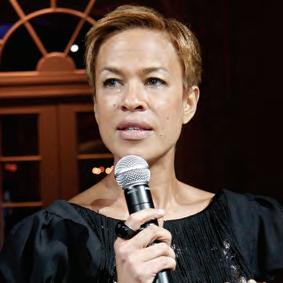
on regulators pulling opioids from the market (The Associated Press)
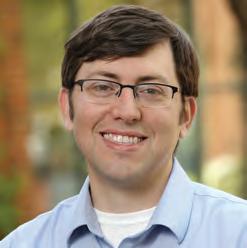
“They all have these super high thresholds. One imagines the reason for the very high thresholds is that they are trying to protect domestic compa nies from the tax, to apply it mostly to U.S. companies.”
—PROFESSOR RUTH MASON , discussing European countries’ taxes targeting large digital services companies like Amazon (Law360)
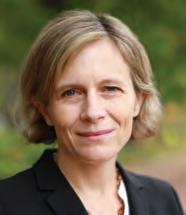
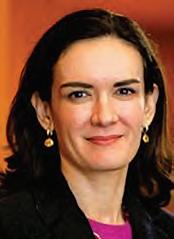
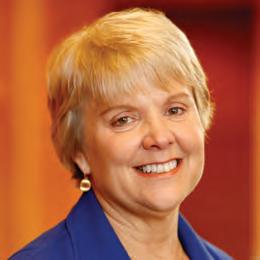
“I’m more attuned than ever to what hardships, challenges and struggles my fellow brothers and sisters in rural white America go through, like the opioid crisis that has devastated those com munities. Many urban communities like the District of Co lumbia have been devastated, too.”
—DISTRICT OF COLUMBIA ATTORNEY GENERAL KARL RACINE ’89, reflecting on his service as president of the National Association of Attorneys General (Washington Lawyer)
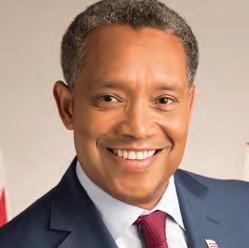
RICHARD RE in an op-ed on judges’ retirements (Slate)
—PROFESSOR JOY MILLIGAN , discussing a lawsuit over past racial discrimination by the Department of Agriculture (Marketplace)
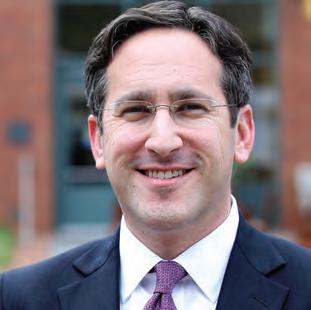
“So we have a ministerial exception that extends to minis ters. But can reli gious organizations discriminate with respect to religious status in nonministerial positions? Do they have immunity under the First Amendment for that type of discrimination? And that’s a question that the Supreme Court has not addressed.”
—PROFESSOR MICAH SCHWARTZMAN ’05 (Law360)
“Judges have begun to leverage their retire ments to make inappropriate demands of the executive branch. Congress or the courts have to put a stop to it.”
Fall 2022 | U VA LAWYER 5
—PROFESSOR
“The question to me is whether the agency will actually have the gumption to use those tools to start pulling drugs. Do they have the will to do it?”
—PROFESSOR MARGARET FOSTER RILEY,
“We can trace these inequi ties back to policies that were once considered ‘race-neutral.’ The federal govern ment essentially participated in Jim Crow across most sectors of life.”
ALUMNI CLERKING STREAK CONTINUES
FOR THE FOURTH STRAIGHT YEAR, more than 100 UVA Law alumni are clerking across the country.
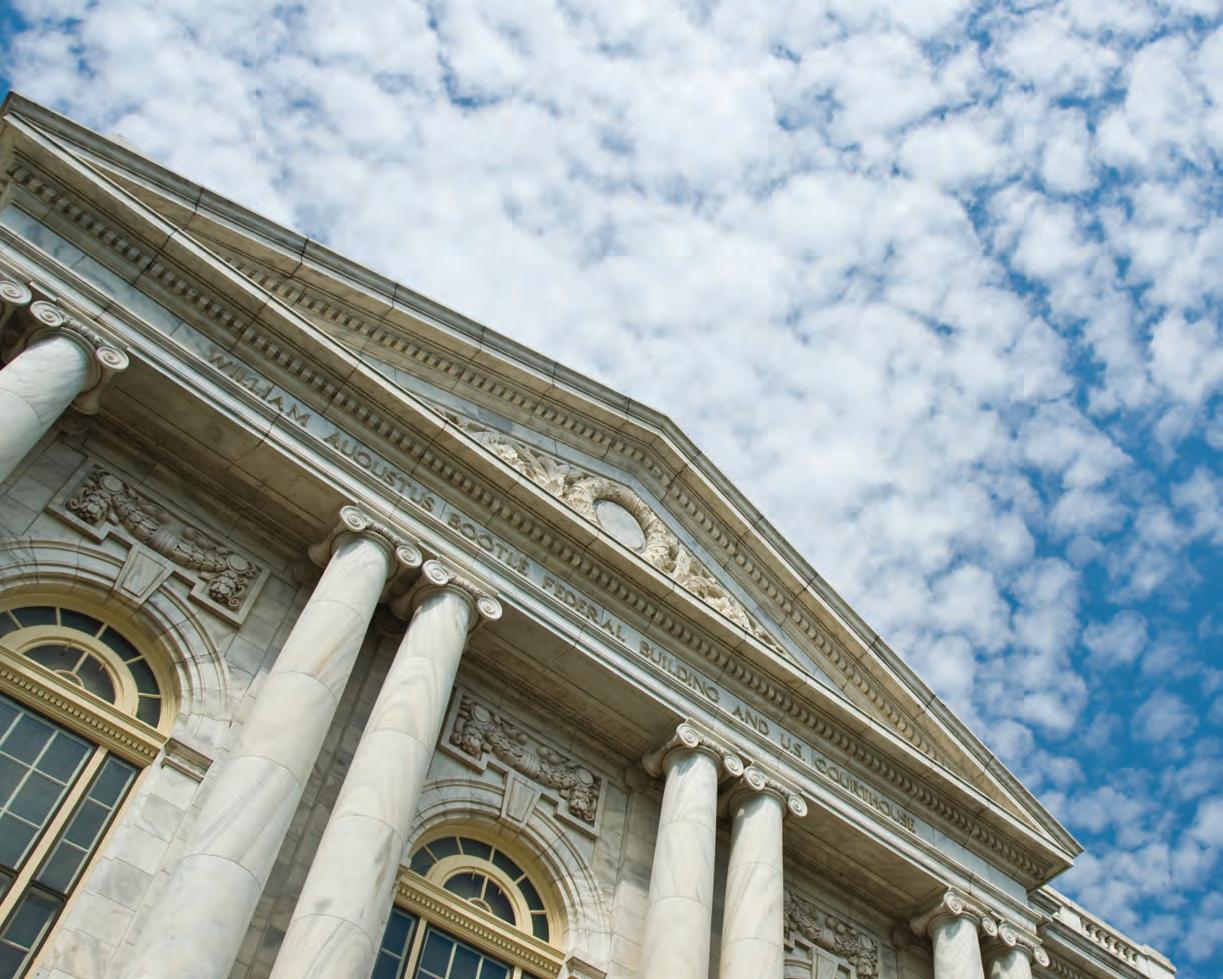
In the 2022 term, 36 alumni are clerking in federal appellate circuit courts, 52 are clerking at federal District Courts and other federal courts, two are clerking at the U.S. Supreme Court, and 14 are clerk ing for state appellate courts and other local courts.

“I think UVA has earned a reputation as a law school with a strong clerkship program, so we continue to attract students who have an interest in postgraduate clerkships,” said Ruth Payne ’02, senior di rector of judicial clerkships. “With the disruption of the pandemic,
we’ve been particularly happy to see so many of our alumni come back into the clerkship market and seek clerkships for later terms.”
A large portion of the clerks are members of the Class of 2022. Out of 327 J.D. graduates in the class, 47 are clerking, including 12 in federal appellate circuit courts (See the full list of 2022 term clerk ship locations, p. 9.)
When clerkships for future terms are included, 63 members of the class have accepted a total of 83 clerkships. Thirty-six gradu ates have accepted clerkships for a later term, and 20 have already accepted a second clerkship in 2023 or 2024.
At the U.S. Supreme Court, Michael Corcoran ’17 is clerking for Justice Clarence Thomas and Henry Dickman ’20 is clerking for Justice Amy Coney Barrett. The Law School is fifth after Harvard, Yale, Stanford and Chicago in placing clerks on the U.S. Supreme Court from the 2007 through 2022 terms.
The Law School is No. 4 in the percentage of graduates from the classes of 2018-21 going directly to federal clerkships after law school, according to American Bar Association data.
—Mike Fox
6 U VA LAWYER | Fall 2022
ISTOCK
UNIVERSITY OF VIRGINIA SCHOOL OF LAW NOW
ACCOLADES
RACHEL ANDERSON ’22 received the Rosenbloom Award for improving the academic environment for her fellow students.
2
Third-year students MAX LARSON, LAYLA KHALID, SHINAE YOON and JACK TURNAGE received the Mary Claiborne and Roy H. Ritter Prizes for 2022-23.
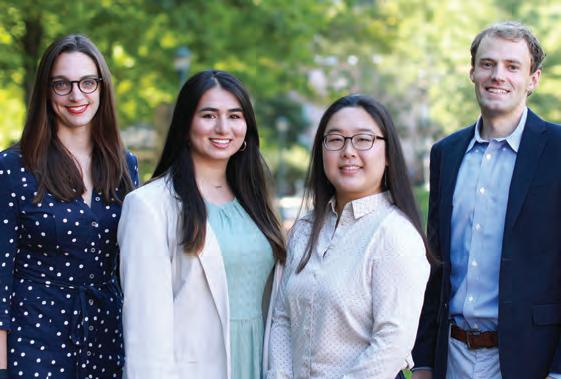

CAMILO GARCIA earned the Faculty Award for Academic Excellence by graduating with the highest GPA in the Class of 2022.
JEFFREY HORN ’23 won the Jackson Walker LLP Award, given to the student with the highest GPA after four semesters. HALEY GORMAN ’24 received the Carl M. Franklin Prize for earning the highest GPA after two semesters.
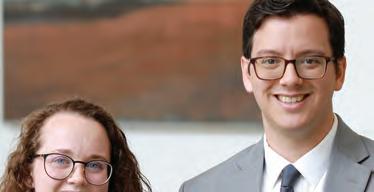
SIMEON DAFEREDE ’25 and KYLIE MIGNAT ’25 are this year’s recipients of the Virginia Public Service Scholar ships.

KATIE KRAMER ’22 received the Clinical Legal Education Association’s Outstanding Clinical Student Award for 2021-22.

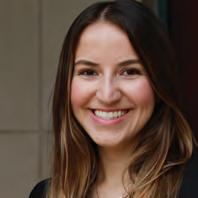
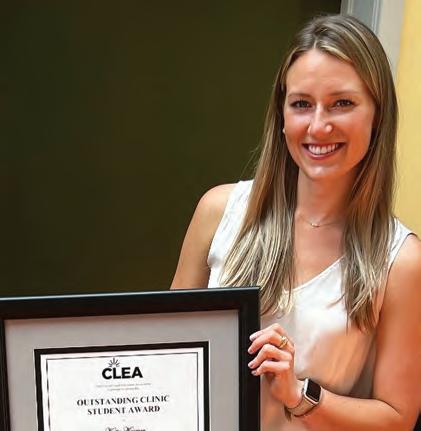
AMANDA HUANG ’24 and KRISTINA LORCH ’24 are this year’s Monroe Leigh Fellows in International Law.
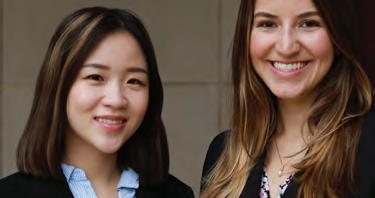
ASHLEY ANUMBA ’24 achieved second team All-American honors in the discus with the Virginia women’s track and field team.
MARILYN HAJJ S.J.D. ’25 was awarded a 2022-23 international doctoral fellowship from the American Association of University Women.
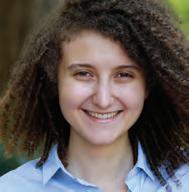
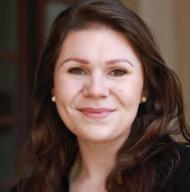
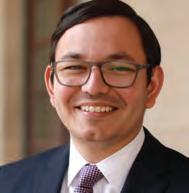
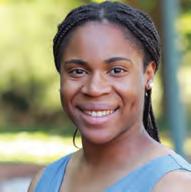
The UVA alumni LGBT group The Serpentine Society named SPENCER HAYDARY ’23 a 2022 John A. Herring Scholar.
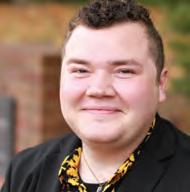
DISCOVERY Fall 2022 | U VA LAWYER 7
5
8 9 10 6 7 4
1 2 3
1
3
4
5
6
7
8
9
10
NEW SUPREME COURT CLERKS ANNOUNCED
HENRY DICKMAN ’20 is clerking for U.S. Supreme Court Justice A my Coney Barrett during the 2022 term, and RACHEL DALEY ’21 has lined up a clerkship with Justice Neil Gorsuch for the 2024 term.
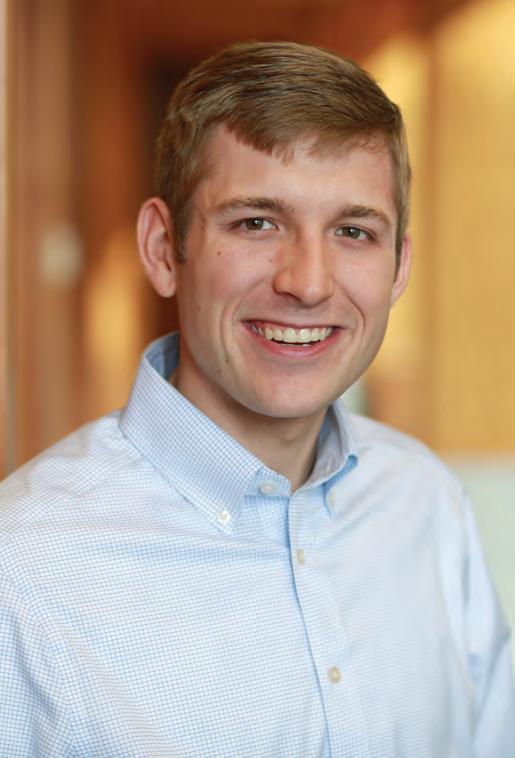
Dickman joins Michael Corcoran ’17, who is clerking for Justice Clarence Thomas this term as well.
“As a longtime law professor, Justice Barrett is, at her core, a teacher,” Dickman said. “I had a brief chance to learn from her on the Seventh Circuit, and now I have the opportunity to do so for a f ull year. I couldn’t be more excited.”
The Law School is fifth after Harvard, Yale, Stanford and Chicago in placing clerks on the U.S. Supreme Court from the 2007 through 2021 terms.
Dickman previously clerked for Judge Gregory Katsas of the U.S. Court of Appeals for the District of Columbia Circuit and clerked for Chief Judge Diane Sykes of the Seventh Circuit after Barrett departed.
Dickman said UVA Law has the best professors and learning environment in the country, and his classes prepared him well for the clerkship.
“I had such phenomenal teachers who helped me to not only understand current legal doctrine but also to identify tensions within it,” he said, “and of course next year I’ll be working on cases that g rapple with
those tensions.”
Daley is currently clerking for Judge Amul R Thapar of the U.S. Court of Appeals for the Sixth Circuit for the 2022 term and formerly clerked for Judge Andrew Oldham of the Fifth Circuit. (Both are UVA Law lecturers.)
“I especially admire how Justice Gorsuch clearly and powerfully explains why respecting our constitutional structure is essential to protecting the rule of law and individual liberty,” she said. “His writings have majorly influenced how I think about a whole host of foundational legal questions, and it’s really an incredible honor to be selected to serve as his law clerk.”
Daley said she applied lessons from her law school classes every day in her clerkship, with Civil Procedure, Federal Courts and Legislation—all taught by Professor Caleb Nelson—being the most influential.

“I find myself very frequently pulling out my outlines from his classes and returning to those notes to under stand how to apply the law in a tricky case,” she added.
—Mike Fox
U.S. SUPREME COURT (2)

FEDERAL APPELLATE CIRCUIT COURTS
U.S. Court of Appeals for the District of Columbia Circuit
U.S. Court of Appeals for the Second Circuit (2)
U.S. Court of Appeals for the Fourth Circuit (5)
U.S. Court of Appeals for the Fifth Circuit (9)
U.S. Court of Appeals for the Sixth Circuit (6)
U.S. Court of Appeals for the Seventh Circuit (3)
U.S. Court of Appeals for the Ninth Circuit (4)
U.S. Court of Appeals for the Tenth Circuit
U.S. Court of Appeals for the Eleventh Circuit (3)
U.S. Court of Appeals for the Federal Circuit
U.S. Court of Appeals for the Armed Forces
DISCOVERY 8 U VA LAWYER | Fall 2022
JULIA DAVIS
ALUMNI CLERKSHIPS FOR THE 2022
TERM
FEDERAL DISTRICT COURTS AND OTHER FEDERAL COURTS
U.S. District Court for the Middle District of Alabama
U.S. District Court for the District of Arizona
U.S. District Court for the Eastern District of California
U.S. District Court for the District of Columbia (4)
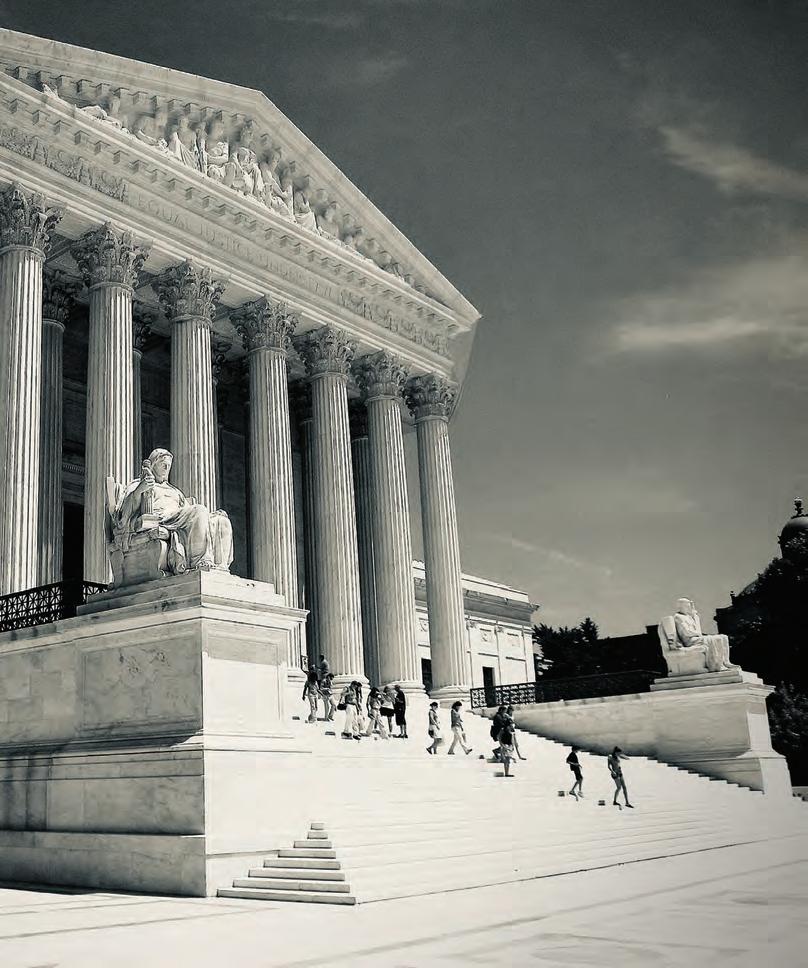
U.S. District Court for the Middle District of Florida
U.S. District Court for the Southern District of Florida (2)
U.S. District Court for the District of Georgia
U.S. District Court for the District of New Mexico (2)
U.S. District Court for the Eastern District of New Jersey
U.S. District Court for the Eastern District of New York
U.S. District Court for the Southern District of New York (4)
U.S. District Court for the Eastern District of North Carolina
U.S. District Court for the Middle District of North Carolina
U.S. District Court for the Northern District of Ohio (2)
U.S. District Court for the District of Oregon (2)
U.S. District Court for the District of Puerto Rico
U.S. District Court for the District of South Carolina
U.S. District Court for the Eastern District of Tennessee
U.S. District Court for the Western District of Tennessee (2)
U.S. District Court for the Northern District of Texas (2)
U.S. District Court for the Southern District of Texas
U.S. District Court for the Eastern District of Texas
U.S. District Court for the Western District of Texas
U.S. District Court for the Eastern District of Virginia (8)
U.S. District Court for the Western District of Virginia (4)
U.S. Court of Federal Claims
U.S. Tax Court (3)
STATE APPELLATE COURTS AND OTHER FEDERAL COURTS
Arizona Court of Appeals
Alaska Superior Court
District of Columbia Court of Appeals
Superior Court of the District of Columbia
Fairfax (Va.) Circuit Court
Maryland Court of Special Appeals
Missouri Supreme Court
Ohio Court of Appeals
Pennsylvania Court of Common Pleas
Texas Supreme Court
Tennessee Supreme Court (2) Virginia Court of Appeals (2)
UVA LAW NO. 2 IN EMPLOYMENT OUTCOMES
UVA WAS RANKED NO. 2 in Above the Law’s annual law school rankings.

The ATL rankings, which focus on em ployment outcomes, draw from the latest American Bar Association employment data for the Class of 2021. The online blog also factored in law school debt and costs, and regional cost of living adjustments. Duke University School of Law topped the list.
At nine months after graduation, when the ABA collects its data, 98.1% of U VA Law’s 2021 g raduates were employed, earning a median salary of $210,000.
Mike Fox
DISCOVERY Fall 2022 | U VA LAWYER 9
“KEEP DOING THE THINGS THAT YOU DID THAT GOT YOU HERE.” That was the advice Eric Broyles ’95 heard from his steel worker father when Broyles was about to start law school 30 years ago, and it was advice the alum repeated to incoming UVA Law students at orientation Aug. 22.
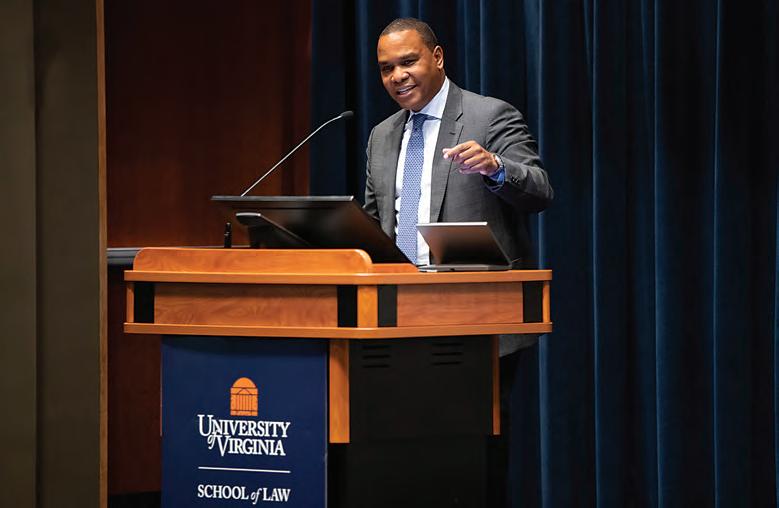
Broyles, who is now CEO of Nanocan, an early-stage biotechnology company developing new technologies to treat cancer, started his career as a lawyer at a prominent Washington, D.C., law firm and rose to senior counsel in the legal department at AOL Time Warner
Inc. on his way to becoming an entrepreneur (see p. 82).
He recalled that he went from being a straight-A senior in college to struggling in law school, and was about to quit when he got a pep talk from an old friend. On his
friend’s advice, he planned to stick it out two more weeks, and during that time a lightbulb switched on and his studies started making sense, just as his friend suggested would happen.
“Trust the system,” Broyles told students, and give it time if you struggle to “get” law school at first. “Your professors, the admin istrators here, the students who are before you—we all have gone through this system, and you can trust it.”
He also encouraged students to uphold, and even improve upon, the culture of collegiality for which UVA Law is known.
“It made me realize right then the possibil ity of depth of human connection,” he said, recalling the close connection he forged with a friend who had a different background and beliefs. “You can’t get that if you are going to be so entrenched in your ideas and your belief about who someone is, and how they are and what they’re supposed to do—you will never have that experience in life Just be open to something that’s different and put in the work, and you guys are going to do great.”
—Mary Wood
THE LAW SCHOOL has a gain set records for academic strength and diversity in its first-year J.D. class.
The 315 members of the Class of 2025 come from 131 undergraduate institutions and were selected from a pool of 6,067 applicants. Students’ median undergraduate GPA reached an all-time high of 3.94, and the median LSAT tied last year’s high of 171.

Within the class, 50% of the students are women, a record 40% are people of color and 16% self-identify as LGBT. The school also began collecting information on whether students are first-generation: 11% are the first in their immediate family to g raduate from college and 31% will be first in their immediate family to earn
a graduate or professional degree.
There a re nine veterans a nd active-duty military members in the class, representing the Air Force, Army, Navy and National Guard.
“The Class of 2025 is an inspiring g roup of college graduates and young professionals who impressed us from the start with their compelling drive, unique life experiences and boundless enthusiasm for the pursuit of legal education,” said Natalie Blazer ’08, assistant dean for admissions a nd chief admissions officer. “I am confident that this particular cohort of students is going to leave UVA Law better than they found it.”
—Mike Fox
10 U VA LAWYER | Fall 2022
JESÚS PINO
AT A GLANCE 315 students enrolled from among 6,067 applicants 50% women, 49% men, 1% nonbinary, transgender or gendernonconforming 40% identify themselves as people of color 67% have postgraduate experience WHERE THEY’RE FROM 131 undergraduate institutions Students come from 38 states a nd the District of Columbia ACADEMIC CREDENTIALS Median LSAT: 171 25%-75% LSAT: 166 -173 Median GPA: 3.94 25%-75% GPA: 3.69 -3.99 BY THE NUMBERS CLASS OF 2025 SETS RECORDS IN ACADEMIC STRENGTH, DIVERSITY ❱ Grace Wenstrom, Riley Nicholson, Rahul Ramesh, Aviaé Gibson and Azalea Lopez are members of the Class of 2025. ERIC BROYLES ’95 WELCOMES NEW STUDENTS JESÚS PINO JESÚS PINO
FOR THE FOURTH YEAR IN A ROW, the Law School Foundation garnered over $20 million in the annual giving campaign that ended June 30. A total of 8,153 alumni, or nearly 46%, and 9,341 donors overall, contributed $20.2 million.
“Alumni and friends provided extraordinary support in a chal lenging year,” said Luis Alvarez Jr. ’88, president a nd CEO of the Law School Foundation. “Over $20 million in total g ifts, including more than $5 million for u nrestricted current use, is a credit to our donors a nd a milestone for the Law School.”
As of publication t ime, t he school raised more than $349 million of its $400 million capital campaign goal, part of the Uni versity’s $5 billion Honor t he Future campaign. The campaign launched in 2019 to commemorate the bicentennial of the Univer sity as well as the Law School, and will conclude in 2025. To date, 70% of alumni have made a g ift or pledge in t he capital campaign, a nd donors h ave also unlocked $26.1 million in University matching f unds for
Law School scholarships a nd professorships.
“I am so humbled by the loyalty and generosity of our a lumni. They are the linchpin of the Law School’s success,” Dean Risa Gol uboff said. “We are so thankful that our g raduates continue to believe in our mission and want to maintain and enhance it today and well into the future.”
Annual giving and endowment are major sources of funding for scholarships for students, public service loan forgiveness, clinics, research i nitiatives, profes sorships a nd numerous other programs.
The Law School Foundation was established in 1952 to raise, manage and administer private funds for the benefit of the Law School.
—Mike Fox
RECORD $801,000 IN GRANTS AWARDED TO 167 STUDENTS WORKING IN PUBLIC INTEREST
WITH HELP FROM A RECORD $801,000 in grants, 167 UVA Law students worked in public service roles in summer.
The Law School’s Mortimer Caplin Public Service Center awarded $761,000 in U VA Law Public Service Summer Grants to 136 firstyear and 31 second-year students. The g rants are f unded by g ifts from alumni and other donors. First-year students receive $4,000 and second-year students receive $7,000.
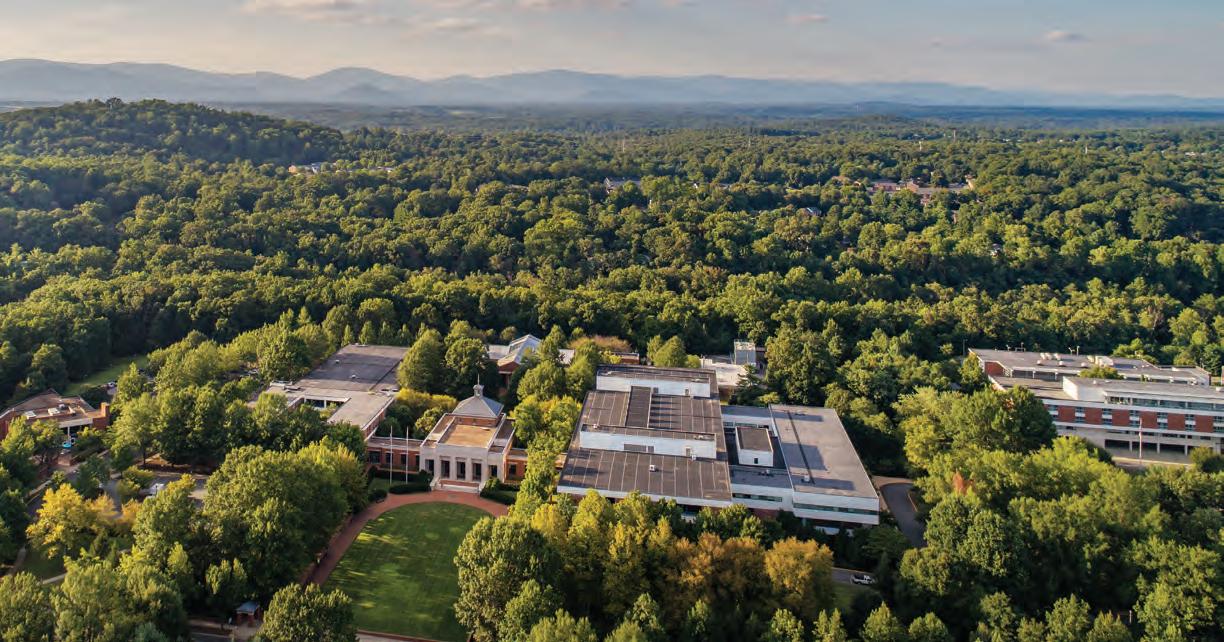
The g rant program was previously a partnership with the student-run Public Interest Law Association, but this year PILA shifted its f undraising efforts toward PILA+, a program offer ing additional money to g rant recipients who will live in areas with high costs of living and receive little other financial assis tance, other than the U VA Law g rant. PILA raised $40,000 for the PILA+ program this past year, benefiting 37 students who re ceived $700 each.
“We’ve set a new record for the Law School’s public service funding this year,” said Professor Annie Kim ’99, director of the Program in Law and Public Service. “ With the Law School f und ing 100% of the baseline Public Service Summer g rants and addi tional f unding coming through PILA+ g rants, U VA Law students now have more options than ever for pursuing public service and judicial internships.”
To be eligible for PILA+ f unding, a student must first receive a Public Service Center grant.
“We are so thankful to the outgoing board for their leadership while we transitioned to the PILA+ g rant program,” said PILA President Mary Merkel ’23, a Claire Corcoran Award recipient who worked at the Advocates for Children of New York over the summer. “Because every dollar we raise through our f undraising now goes directly to a student working a public service intern ship, we are hopeful that the PILA+ g rants will help enable more students to be able to pursue public interest work.”
—Mike Fox
Fall 2022 | U VA LAWYER 11
ROBERT LLEWELLYN
GIVING
$20 MILLION STREAK DISCOVERY
CAMPAIGN HAS FOUR-YEAR
CLASS OF 2022 LEARNED HOW TO ‘LEAN IN TO RESILIENCE,’ KIM KEENAN ’87 SAYS
’87
to the toughness of a class that has seen contentious political storms, war abroad and grief around the globe in their three years of law school.
“Today, you have demonstrated that you know how to lean in to your resilience,” she said May 22. “Getting your law degree during a global pandemic—with all of that extra life-and-death pressure on your ability to learn, to focus and engage with the faculty and your classmates—is more than remarkable.”
Keenan urged graduates to “take all of this well-earned resilience and use it to leave your fingerprints all over your community, your city, our nation, and yes, the world. Take a minute to just salute your self for getting here intact and in person.”
During her 35-year career, Keenan was the youngest person—and only second woman—to serve as general counsel of the NAACP. Her range of experiences include a federal clerkship, private practice at the nation’s largest law firm, founding her own law firm, teaching law, presiding over two bar associations and now working as a me diator, arbitrator and neutral evaluator in Washington, D.C.
Keenan used her own experience to illustrate the possibilities

that can happen when you balance your professional life to include family and service to the community, when you “take ownership of your career” and when you “find your place and own it.”
“I have decided to get up in the morning because I choose how I get to use this amazing toolkit,” Keenan said. “Part and parcel of my decades-long love of the law is the ability to make a difference, whether it's election protections so every community can vote freely, developing policy to raise the digital divide, resolving the sports dispute or creating the landlord-tenant self-help center. Yes, you can still be an [intellectual property] lawyer and fight for climate change.”
Keenan expressed hope that today’s graduates will “dwarf the ac complishments” of those who came before, and she left them with words reminding them of the value of challenges—those conquered and those to come.

“There is no testimony without a test. There can be no triumph without a trial. And there have never been diamonds without fire,” Keenan said. “You have passed the tests and prevailed at trial, so you can be fearless knowing you were built for this.”
Melissa Castro Wyatt
12 U VA LAWYER | Fall 2022
CLASS OF 2022 COMMENCEMENT SPEAKER KIM KEENAN
paid tribute
DISCOVERY
PHOTOS BY TOM COGILL AND JULIA DAVIS
CLASS OF 2022 GRADUATION AWARDS
MARGARET G. HYDE AWARD
To the graduate whose scholarship, character, personality, activities in the affairs of the school, and promise of efficiency have warranted special recognition.
Camilo A. Garcia
JAMES C. SLAUGHTER HONOR AWARD
To an outstanding member of the graduating class.
Tiffany S. Mickel
THOMAS MARSHALL MILLER PRIZE
To an outstanding and deserving member or members of the graduating class.
Jordan M. LaPointe
Z SOCIETY SHANNON AWARD
To the graduate with the highest academic record after five semesters.
Camilo A. Garcia
ROBERT E. GOLDSTEN AWARD FOR DISTINCTION IN THE CLASSROOM
To the graduate who has contributed the most to classroom education by his or her outstanding recitation and discussion.
Christopher P. Leveroni
LL.M. GRADUATION AWARD
To an outstanding member or members of the graduating LL.M. class.
Fritz Maya Kainz
ROGER AND MADELEINE TRAYNOR PRIZE
To the graduate or graduates who have produced outstanding written work.
Abigail M. Porter
Rachel Slepoi
HERBERT KRAMER/ HERBERT BANGEL COMMUNITY SERVICE AWARD
To the graduate who has contributed the most to the community.
Elizabeth B. Harris
THE PRO BONO AWARD
To the graduate who contributed the most to the Law School’s Pro Bono program.
Maggie Claire Woodward
MORTIMER CAPLIN PUBLIC SERVICE AWARD
To a graduate entering a career in the public service sector who demonstrates the qualities of leadership, integrity and service to others.
Maggie Claire Woodward
EDWIN S. COHEN TAX PRIZE
To the graduate who has demonstrated superior scholarship in the tax area.
James Z. Collins
EARLE K. SHAWE LABOR RELATIONS AWARD
To the graduate who shows the greatest promise in the field of labor relations.
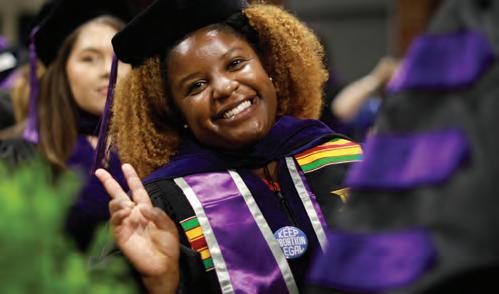
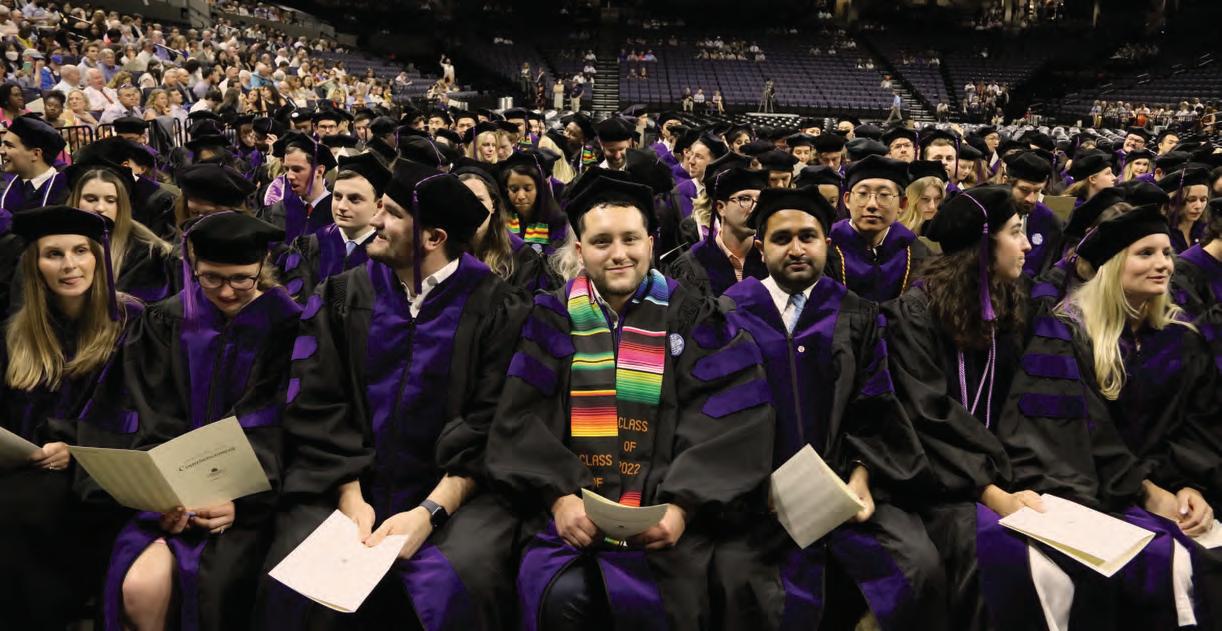
Benjamin R. Saul
JOHN M. OLIN PRIZE IN LAW AND ECONOMICS
To a graduate or graduates who have produced outstanding written work in the field of law and economics.
Andrew H. Tynes
EPPA HUNTON IV MEMORIAL BOOK AWARD
To a graduate who demonstrates unusual aptitude in courses in the field of litigation, and who shows a keen awareness and understanding of the lawyer’s ethical and professional responsibility.
Benjamin R. Saul
VIRGINIA TRIAL LAWYERS TRIAL ADVOCACY AWARD
To a graduate who shows particular promise in the field of trial advocacy.
Taylor Renee Fatherree
VIRGINIA
STATE BAR FAMILY LAW BOOK AWARD
To the graduate who has demonstrated the most promise and potential for the practice of family law.
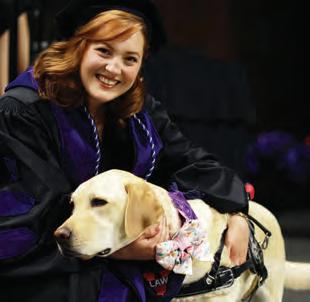
Claire M. Reiling
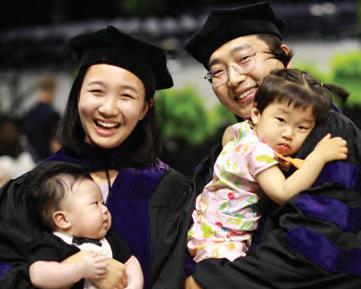
Fall 2022 | U VA LAWYER 13
❱ The commencement ceremony, which took place at John Paul Jones Arena due to weather concerns, marked the first traditional in-person graduation ceremony for the school since 2019 due to the COVID-19 pandemic.
ENERGY SCHOLAR JOINS
FACULTY
Formerly a Harry A. Bigelow Teaching Fellow at the University of Chicago Law School, Gocke holds a J.D. and M.S. in the environment and natural resources from Stanford and earned her B.A. at Princeton University.
After law school she clerked for Judge Guido Calabresi of the U.S. Court of Appeals for the Second Circuit, then served in a joint legal fellowship with the Natural Resourc es Defense Council and Yale Law School’s Environmental Protection Clinic. In the latter role, she oversaw the clinic, which included both law a nd environmental studies students, and also taught an intro ductory course on environmental law. In the first part of the fellowship at the council, she joined the Climate and Clean Energy Team, working on litigation related to federal vehicle emissions standards, the National Environmental Policy Act and the Federal Energy Regulatory Commission.
“ We are so thrilled to welcome Alison to the faculty,” Dean Risa Goluboff said. “Her hands-on experience in environmental and energy law and policy, and the innovative scholarship she has developed out of that experience, offer an exciting complement to our faculty. That she approaches these important subjects f rom a number of vantage points—taking into account history, theory, doctrine and practice—enables her
to identify and develop insights that others miss.”
Raised in Maryland and Pennsylvania, Gocke became interested in the environ ment and science through family hikes and experiments encouraged by her mother, who studied biology.
“She would have us test the pond in our backyard to find out what bacteria was growing in it, or build little model f uel cell cars,” Gocke said.
While pursuing her studies in environ mental science as an undergraduate, she participated in a summer project in South Africa investigating the impact of climate change on fish populations. A s she a nd project team members traveled the country to gather fish samples, a farmer mentioned how important legal structures were to en couraging environmental sustainability in the nation.
“It clued me into t he idea t hat if we wanted to tackle some of our major envi ronmental challenges, this was not going to just be a scientific problem. It was also a legal and a regulatory problem,” she said.
She ultimately majored in intellectual and cultural history at Princeton, while minor ing in environmental studies.
At Stanford, Gocke again took an inter disciplinary approach, studying energy systems while working on her law degree. Classes in clean tech, energy policy, climate change and the principles of batteries sup plemented her legal studies. It was “crucial for me to learn about energy technology to better understand how we regulate a nd govern the grid,” she said.
While working with Stanford’s Woods Institute on a project on the regionalization of California’s electricity g rid, she wrote her first published paper, “Nodal Governance of the U.S. Electricity Grid,” in the Duke Environmental Law & Policy Forum.
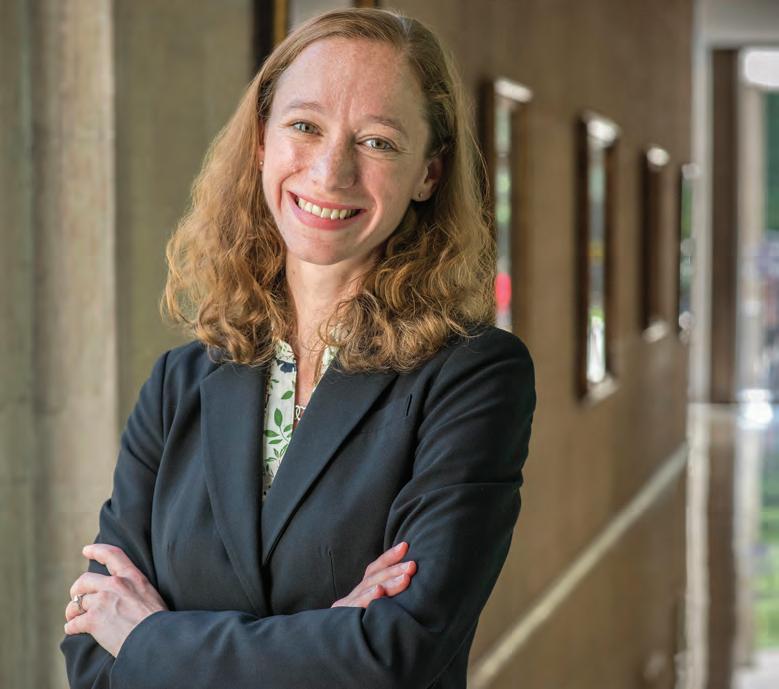
Gocke’s forthcoming paper is about how the power of the Federal Energy Regula tory Commission to authorize permits for interstate natural gas pipelines has been wielded differently over time.
“In the last 20 or so years, FERC has re ceived hundreds of pipeline applications, and they’ve denied only t wo of those ap plications,” she said. But in FERC’s early days during the New Deal and the decades after, coal, railroad and labor interests com peted against natural gas interests to limit the approval of such applications.
“It was one of the biggest issues being fought at the time,” she said. “But as the opposition from coal and labor has collapsed and natural gas has become the major source of electricity generation in t he United States—it’s about 40% of utility scale elec tricity generation right now—you’ve seen a shift in how FERC approaches natural gas pipeline approvals.”
Professor Michael Livermore, who leads the Law School’s Program in Law, Com munities and the Environment, or PLACE, said Gocke’s work will g row the program and the school’s offerings.
“ With her focus on energy governance, she will complement and expand our exist ing environmental program in an area of increasing importance,” Livermore said. “Her scholarship is carefully g rounded in the practical realities and complex dynam ics of energy law and policy—from compli cated state-federal interactions to the envi ronmental justice consequences of energy infrastructure.”
Mary Wood
14 U VA LAWYER | Fall 2022
LLOYD DEGRANE
ALISON GOCKE, AN ENVIRONMENTAL LAW SCHOLAR with expertise in energy from both the scien tific and legal perspectives, joined the Law School faculty this summer.
SUPREME COURT TAKES CLINIC CASE ON CHALLENGES TO CONVICTIONS
The dispute in the case, Jones v. Hendrix, began when Marcus DeAngelo Jones filed a motion to vacate his sentence in a 2000 con viction for being a felon in possession of a firearm. A federal court vacated one of Jones’ two convictions as being duplicative, but he was resentenced.
Jones later filed a habeas corpus petition, which would give him a second opportunity to prove that his incarceration was illegal. In his petition, he cited new Supreme Court prece dent in the 2019 case Rehaif v. U.S., which held that in felon-in-possession cases, the prosecu tion must prove both that the accused knew they possessed a gun and they knew they were prohibited from doing so.
In denying Jones’ habeas petition, the District Court and the Eighth U.S. Circuit Court of Appeals concluded that Jones could have made his own Rehaif-type argument to challenge the legality of his detention in earlier appeals and therefore—without newly discovered evidence—he was not entitled to habeas relief simply because of Rehaif’s
later change to substantive law.
Jones, represented by the clinic and attor ney Jeremy B Lowrey, argue in a cert petition that habeas relief should be available after the Supreme Court later makes clear in a retro actively applicable decision, like Rehaif, that the circuit precedent was wrong and that the defendant is legally innocent of the crime.
Ortiz said the clinic was drawn to the case by the deep conflict among appeals courts about the availability of habeas relief in such situations and “the obvious injustice” of not allowing a challenge to a conviction when the Supreme Court later declares what a defen dant was convicted of was not a crime.
“The case would let criminal defendants who are incarcerated for conduct the lower courts at one time wrongly thought a statute made a crime—but the Supreme Court later held did not—to challenge their convictions,” he said, “even when defendants did not make that claim during the one postconviction chal lenge the law permits them.”
Typically, a federal inmate has one year to
challenge a conviction or sentence through a Section 2255 motion to vacate. Under current law, an inmate may only file a habeas petition if he shows that “the remedy by [Section 2255] motion is inadequate or ineffective to test the legality of his detention,” the Eighth Circuit noted in its decision.
“The Sec. 2255 remedy cannot ‘test’ the le gality of a detention at all, let alone adequately and effectively, if the court applies the wrong substantive law,” the clinic’s cert petition argues. “That is like a schoolteacher ‘testing’ a student’s understanding with a good test but a wrong answer key.”
Eight circuits have supported habeas relief when a change in substantive law is retroac tively applicable, and three have opposed it. The conflict is so pressing that many individ ual circuit judges have called for the court’s speedy intervention, the petition notes.
“Confusion runs so deep, in fact, that the government has changed its own position twice,” the cert states.
The yearlong clinic introduces third-year students to all aspects of current U.S. Supreme Court practice through live cases. Jones is the clinic’s 18th case before the court since the course’s inception in 2006.
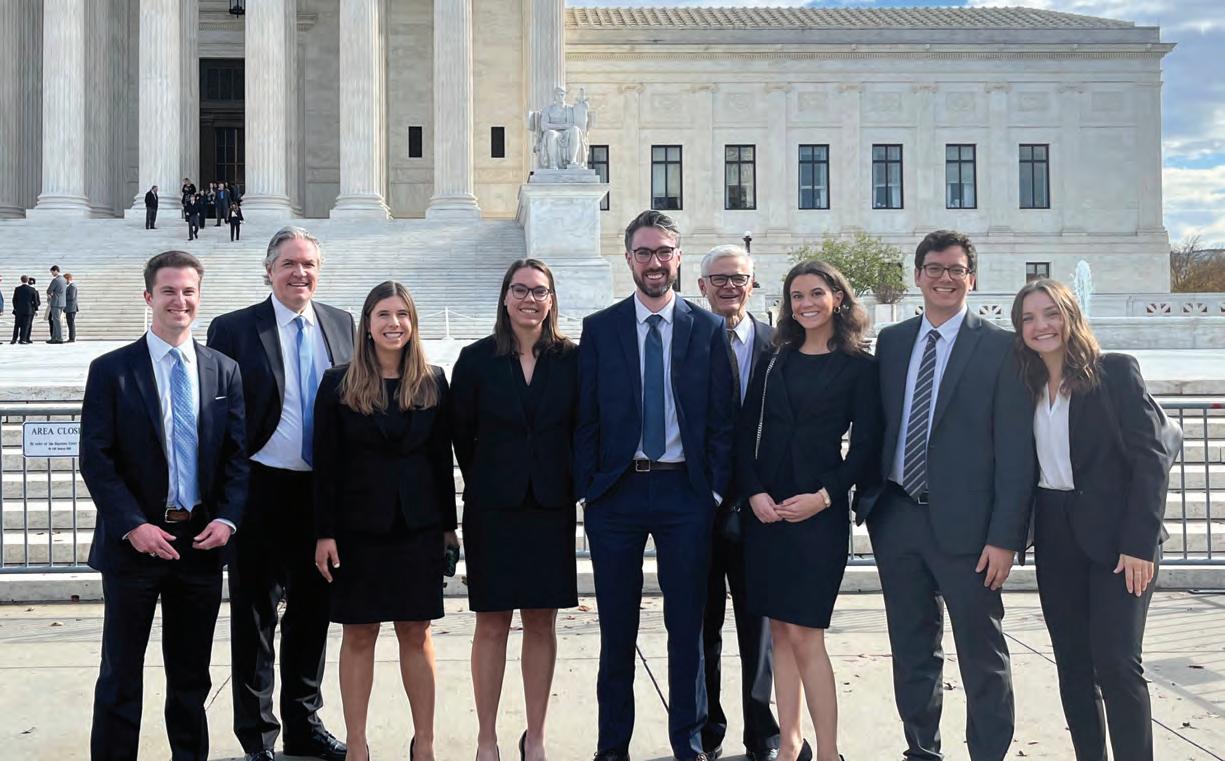
Fall 2022 | U VA LAWYER 15
THE U.S. SUPREME COURT AGREED TO HEAR a case filed by the Supreme Court Litigation Clinic that could have broad implications for defendants challenging their convictions for crimes that are no longer considered crimes. Clinic director Professor Daniel Ortiz presented oral argument Nov. 1.
Mike Fox
❱ Clinic students heard Professor Daniel Ortiz argue at the U.S. Supreme Court on Nov. 1.
DISCOVERY
Pictured afterward are Steven Higgins ’23, Jeremy Lowrey (the counsel below), Harper North ’23, Laura Lowry ’23, Boyd Hampton ’23, Ortiz, Julia Grant ’23, Jeffrey Horn ’23 and Emily Bucholtz ’23
COURTESY HARPER NORTH ’23
JULIA DAVIS
PROFESSOR RICH HYNES WILL SERVE AS INAUGURAL DIRECTOR
NEW CENTER BUILDS ON UVA LAW’S STRENGTHS IN EMPIRICAL STUDIES
THE NEW CENTER FOR EMPIRICAL STUDIES IN LAW will support and showcase the work of faculty who use data to better understand the law and help train the next generation of lawyers in empirical techniques.
Professor Rich Hynes will serve as the in augural director. Hynes, the John Allan Love Professor of Law and the Nicholas E. Chimi cles Research Professor of Business Law and Regulation, holds a doctorate in economics from the University of Pennsylvania as well as a J.D. from the University of Chicago His scholarship focuses on bankruptcy law, con sumer credit, and law and economics.
Hynes said rapid advances in analytical tech niques and the availability of data are allowing scholars to “test empirical assumptions that lie at the heart of a wide variety of legal debates.”

He explained that empirical analysis includes
many different methods such as qualitative analysis of surveys, laboratory experiments, computational analysis of text, regression anal ysis and simple descriptive statistics.
Hynes said the center’s breadth of faculty demonstrates how strong the school is in this area.
“We are fortunate to have experts trained in empirical methodology from a variety of disciplines and focused on a variety of subject matters,” he said.
Many of the center ’s affiliated faculty have doctorates in economics, finance, po litical science and psychology. Their empiri
cal analysis focuses on topics ranging from corporate law to constitutional law to crim inal law and beyond. The center’s faculty include Michal Barzuza, Kevin Cope, Quinn Curtis, Joshua Fischman, Mitu Gulati, Andrew Hayashi, Cathy Hwang, Rich Hynes, Jason S. Johnston, David S Law, Michael Liver more, Paul G. Mahoney, Gregory Mitch ell, John T. Monahan, Dotan Oliar, Bertrall Ross, Barbara A. Spellman, Megan T. Steven son, Pierre-Hugues Verdier and Mila Versteeg.
“This diversity creates a stimulating intellec tual environment as we are able to learn from different approaches as well as offer construc tive criticism to each other,” he added.
In addition to producing scholarship on these topics, the Center for Empirical Studies in Law will also work to educate students in the kind of empirical analysis that plays an increas ingly prominent role in politics and litigation.
The school has long offered a quantitative methods course that is useful beyond academia, Hynes said. Other courses available this year are Social Science in Law, Law and Economics, Behavioral Law and Economics, Constitutional Law and Economics, and Truth, Lies and Sta tistics for Lawyers, among others.
“Empirical methods are frequently used in litigation,” Hynes explained. “For example, regressions are often used to try to prove dis crimination or to estimate damages in securi ties litigation. Lawyers who advocate for legal change also need to understand these methods because they are frequently used in the public policy arena.”
The center will sponsor events that advance scholarly research that uses empirical methods, including the 16th annual Conference on Em pirical Legal Studies scheduled for Nov. 3-5—an event that brings together hundreds of schol ars from around the world. Three of the cen ter’s members—Barzuza, Cope and Curtis—are leading this effort and serve on the board of di rectors of the Society for Empirical Legal Studies.
Hynes said the center will engage with other UVA faculty members producing related work on Grounds. In the past, faculty in the center have co-authored work with faculty in the Department of Economics and the McIntire School of Commerce.
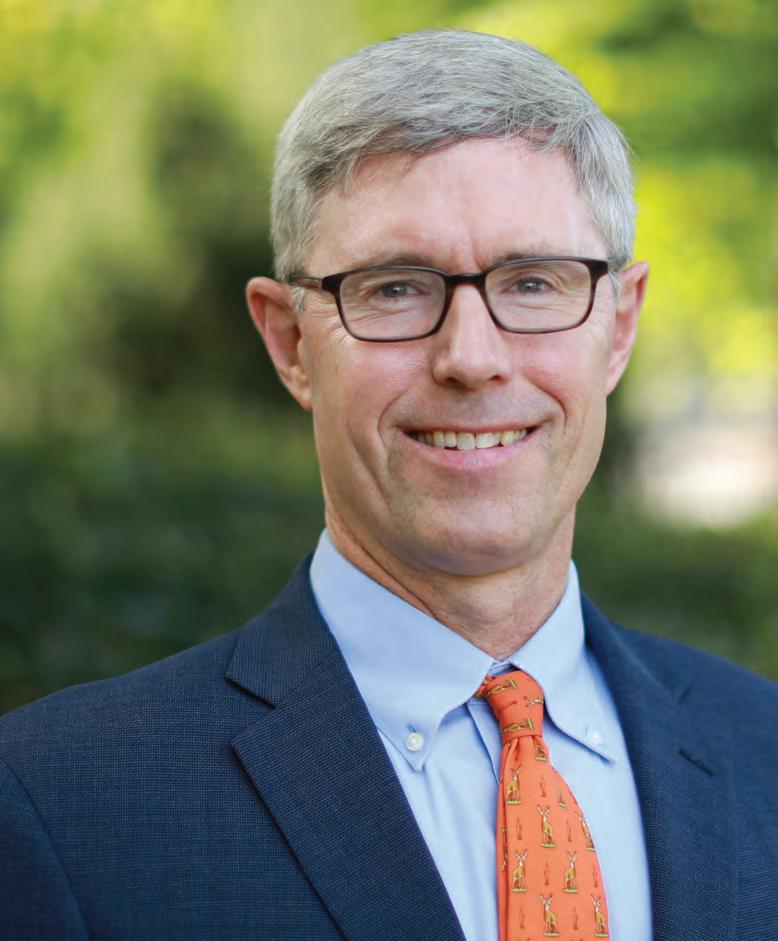 Mary Wood
Mary Wood
16 U VA LAWYER | Fall 2022
DISCOVERY
CLINIC WINS DECISION IN NOVEL WORKPLACE DISCRIMINATION CASE
JULIA DAVIS
U.S.
The case, Chapman v. Oakland Living Center, was particularly interesting to Professor Scott Ballenger ’96, who leads the clinic, because it was not a t ypical case of employer harassment.
“It’s probably now the leading precedent nationwide about how you analyze the situa tion when a supervisor’s kid does something bad in the workplace,” Ballenger said.
While Tonya Chapman was an employee at the Oakland Living Center, a nursing home in Rutherford, North Carolina, she claimed to have experienced several forms of harassment and discrimination at work. The case specifically highlights two instances where the 6-year-old child of one of her supervisors used racial slurs when addressing her. In the first incident, the child said that her father had used a racially derogatory slur while complaining that she had not come to work. The second time the child taunted her repeatedly with the word. After the supervisor discovered what the child had said to Chapman, he ordered the child to apologize; when the child failed to do so, he simply walked away.
The child said the slur again and Chapman resigned immediately, believing the work en vironment would not improve, Ballenger said.
The clinic appealed a decision from the lower court, which had granted summary judgment in favor of the nursing home without a jury trial.
This was a particularly gray area with Title VII, Ballenger said, because it was not the su pervisor directing slurs at Chapman, but his
child. The child was also the grandchild of the nursing home’s owner.
“Title VII law makes employers strictly liable for harassment by supervisors, but only liable in negligence for harassment by co-work ers or customers,” Ballenger
The challenge for the clinic, he explained, was that the minor child of a supervi sor has attributes of both categories. So, the clinic’s opening brief argued the case from multiple angles.
“If a supervisor left a tape recorder on his desk blaring out racial insults, we would no difficulty recognizing that as super visor harassment,” Ballenger said. “But even if you just think of the child like a customer, the employer is still responsible if the supervisor did not take reasonable steps to prevent and correct the harassment.”
Though several students over time worked on the case briefs, Kimberly Veklerov ’22 was tapped to help argue the case, her first in court. After months of researching and pacing back and forth in her room while practicing, Ve klerov and classmate Gregory Eng ’22, who handled the rebuttal argument, stepped into

Fourth Circuit courtroom in Richmond, Virginia, on Dec. 9.
Leading up to the court date, Veklerov had practiced her opening argument on countless peers, professors and friends, and used their feedback to prepare for questions from the three-judge panel.

But the first question she received was not one she had practiced; instead, the judge compared the case to an older federal anti-discrimination law. She took a breath and thought back to her employment discrimination law class with Pro fessor George Rutherglen—and found her answer.
“You can’t always predict what issues judges are going to be interested in,” she said. “You have to be able to improvise and think on your feet.”
Ten months after walking of court, she was happy—but not shocked—when she saw the written opinion granting the clinic’s request that Chap man’s case be sent back to the District Court for a full trial.
“It wasn’t a total surprise because I thought based on the judges’ questions that they under stood our argument and they were very attuned to all the issues,” she said. “I was really happy to see how thoroughly the opinion grappled with all of the issues and explained the factual predicate for its holdings.”
Katelyn Waltemyer
DISCOVERY Fall 2022 | U VA LAWYER 17
STUDENTS IN THE LAW SCHOOL’S APPELLATE LITIGATION CLINIC had the challenge of tackling a seem ingly unprecedented set of facts in a Title VII workplace harassment case—and won a decision Aug. 30 in the
Court of Appeals for the Fourth Circuit after more than two years of work.
the
❱
Kimberly Veklerov ’22
❱ Professor Scott Ballenger ’96 directs the Appellate Litigation Clinic.
DISCOVERY
AS HEAD OF ADMISSIONS FOR A TOP LAW SCHOOL, Natalie Blazer ’08 has heard it all from pro spective students, including a question about whether an applicant could pay full tuition upfront—without the admissions committee ever reviewing their application. (Answer: No.)
That said, it’s the same questions that keep Blazer’s inbox f ull and her staff answering the phones every day. What is the admissions committee looking for? At what point should an applicant consider retaking the LSAT?
How competitive is it to get into a clinic?
To better educate prospective students, Blazer created the “Admissible” podcast, which launched in September. Every t wo weeks, Blazer is diving into different topics
of interest to law school applicants through informal interviews.
“Applying to law school is stressful enough,” she said. “Hopefully, this podcast will make the process a little more fun.”
Posted a nd planned episodes feature advice about the LSAT, visiting law schools, a behind-the-scenes look at operations in the Admissions Office, financial a id a nd scholarships, t he ins a nd outs of clinics, student life and more.
“My goal for this podcast is for listeners to get an inside look into what law school admissions committees are really looking for, but also a better idea of what it’s like to be a student at a top law school,” Blazer said.
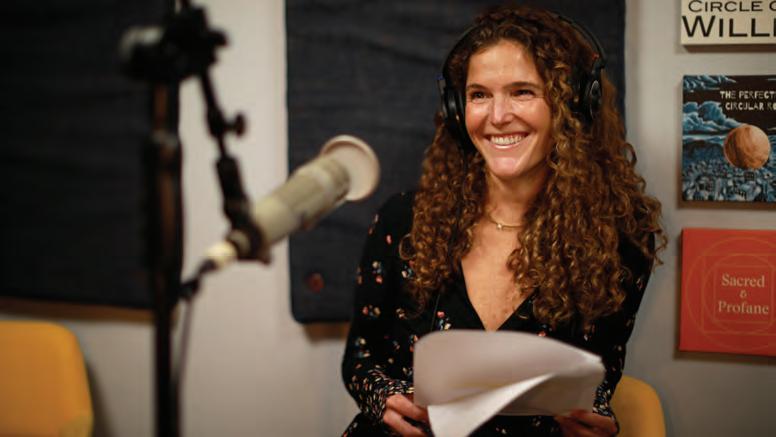
The show is available on Apple Podcasts, Spotify, Pandora and wherever you listen to your f avorite shows. “Admissible” is produced in partnership with WTJU 91.1 FM, U VA’s student and community radio station, and its podcast network, the Virginia Audio Collective.
—Katelyn Waltemyer
“Boys of color made up 76% of all student involvement with t he local school police department, a nd m iddle school- a nd el ementary school-age children accounted for 1 in 4 of the total arrests,” he said. “Students as young as 8 were being arrested for very minor instances of misbehavior, such as just speaking too loudly.”
Allen is currently a J.D. candidate at the UCLA School of Law, where he served as editor-in-chief of the UCLA Law Review and is specializing in critical race studies and business law. He earned his master’s degree f rom Columbia University a nd bachelor’s degree f rom t he University of California, Berkeley.
Announced in January 2021, the Universitywide fellowship is f unded by a three-year, $5 million grant from The Andrew W. Mellon Foundation a nd creates a broad, interdisciplinary undergraduate program on Race, Place and Equity while partly funding 30 postdoctoral fellows and three faculty members. The positions have a fixed-term appointment of up to two years.
Allen earned his Ph.D. from the UCLA School of Education and Information Studies. His dissertation, “A Web of Punishment: Race, Place, and School Policing,” examines the role and authority of school police officers, and why Black students are most vulnerable to negative interactions in low-income Black neighborhoods and schools. The research is forthcoming in Educational Researcher.
Allen’s forthcoming UCLA Law Review paper, “Policing Black Students in White Spaces,” analyzes how the presence of police officers in school uniquely shapes the expe riences of Black students in predominantly white schools. His research draws from Los Angeles School Police Department data and interviews with 90 Black students.
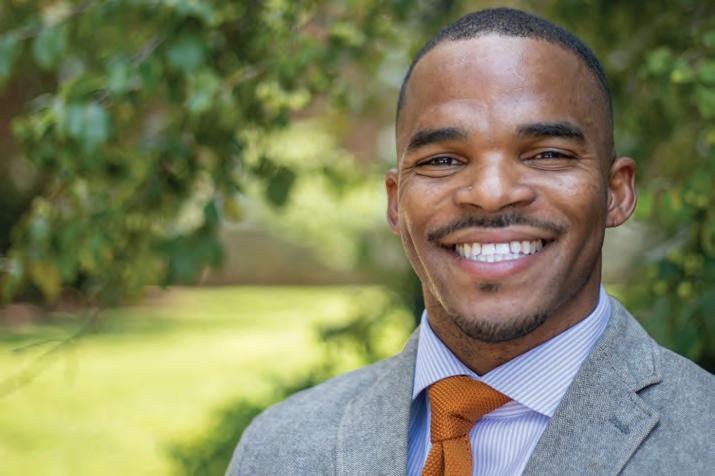
“One of the goals of my scholarship is to shift the school policing discussion away from a rguments on whether officers a re good or bad or racist or egalitarian to a focus on police power in its broad author ity,” Allen said.
—Mike Fox
18 U VA LAWYER | Fall 2022
TERRY ALLEN, WHOSE SCHOLARSHIP FOCUSES ON THE ROLE OF POLICE IN SCHOOLCHILDREN’S LIVES, is the first Race, Place and Equity Postdoctoral Fellow at UVA Law.
ARE YOU ADMISSIBLE? ADMISSIONS LAUNCHES NEW PODCAST SCHOOL HOSTS FIRST RACE, PLACE AND EQUITY POSTDOCTORAL FELLOW
JULIA DAVIS
MOLLY ANGEVINE
NEW ADMINISTRATORS JOIN UVA LAW
LEAH GOULD is the new assistant dean for public service and director of the Mortimer Caplin Public Service Center. She joined the Law School in 2020 as director of public service and worked with the Office of Judicial Clerkships. Gould formerly served as an assistant U.S. attorney in New Jersey, where she prosecuted a variety of
federal criminal cases, including firearms, narcotics trafficking, child exploitation and white-collar cases.
Former Public Service Center Director Annie Kim ’99 has joined the resident faculty full time as assistant professor of law, general faculty, and will continue to direct the Program in Law and Public Service while teaching courses.

LISA HOSKEY is senior director of financial aid, a new position. She most recently served as interim bursar of Cayuga Community College in Auburn, New York, and was director of student financial services for Ithaca College. Hoskey’s other work in higher education includes serving as director of financial aid for the State University of
New York Institute of Technology, and as the federal aid coordinator and assistant director of financial aid and student employment at Utica College.
ROSANNE D. IBANEZ (COL ’08) is a director of admissions. Before joining the Admissions Office, she was the associate director of admissions, recruitment and outreach at the University of Richmond School of Law. Ibanez previously served as an attorney magistrate for the commonwealth
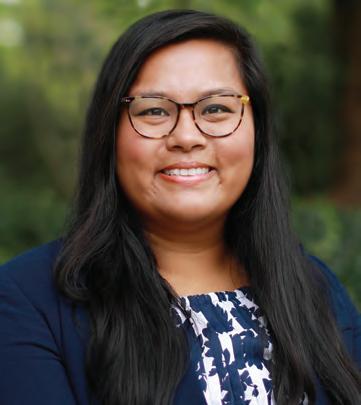
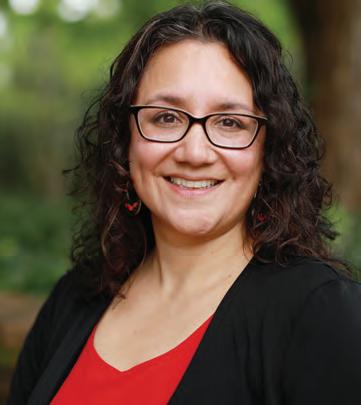
of Virginia, where she was a twotime recipient of research grants from the Department of Criminal Justice Services and the Office of Violence Against Women.
S.
KWON ’05 is a director in the Office of Private Practice.
Prior to joining the Career Development team, Kwon was a partner in the New York office of Hunton Andrews Kurth, where her practice focused on capital
markets transactions. She also advised clients on compliance with securities laws and regulations, reporting obligations, corporate governance and general corporate matters.
DIANE PHILIPS ’20 is the new staff attorney for the Innocence Project Clinic. In law school, Philips was an executive editor of the Virginia Law Review, a Legal Writing Fellow and director of the Virginia Law in Prison Project. After graduation, Philips
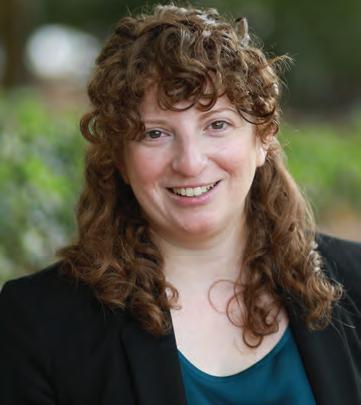
LEONIE WILLIAMS is an associate director of academic services.
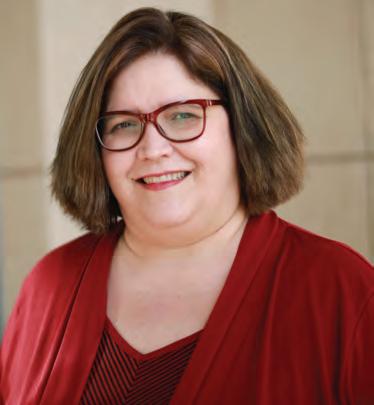
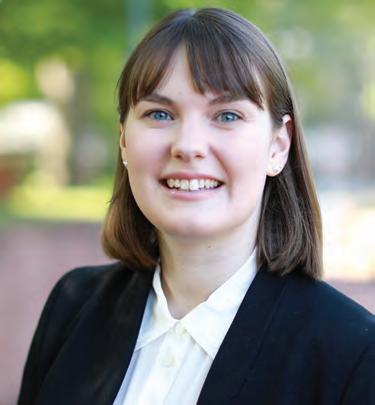
Previously, she served as a course and catalog systems analyst for the University Registrar and was a founding member of UREG’s Diversity Initiative.
Before joining UREG,
Williams worked as an office manager and marketing coordinator for Alticom (now CellNex) and as a marketing account manager for the advertising agency PS Communications.
DISCOVERY Fall 2022 | U VA LAWYER 19
CHRISTINA
clerked for Justice William C. Mims at the Supreme Court of Virginia and Judge Lisa M. Lorish at the Court of Appeals of Virginia.
—Mike Fox
PHOTOS BY JULIA DAVIS
‘SERIAL’ SUBJECT AIDED BY INNOCENCE PROJECT RELEASED
The clinic first became involved when “Serial” creator and host Sarah Koenig asked for help investigating and researching Syed’s case for an episode of “This American Life.” Syed had been convicted of murdering his ex-girlfriend Hae Min Lee when he was 17. Professor Deirdre Enright ’92, former Innocence Project director, convened a team of clinic students and together they waded through the facts. What they discovered was so compelling that Koenig’s potential single episode instead launched a 12-episode podcast named “Serial”—and the public was riveted.
“It just seems like everywhere you looked, there was a reason to have doubt—the motive seemed absurd, it wasn’t like he had explo sive anger, her body was found in a park where dead bodies abound, deals were made with a key witness, there was a mistrial—these are some of the red flags in innocence cases,” Enright said.
Though “Serial” was downloaded 300 million times, and the clinic helped find potentially exculpatory evidence, it still took eight more years to tip the scales of justice in Syed’s favor. A new Maryland law and the fresh eyes of a former public defender who had recently joined the state’s attorney’s office, Becky Feldman, gave Syed another try at asserting his innocence.
Feldman’s work led the Baltimore City state’s attorney’s office to ask a judge on Sept. 14 to toss out Syed’s conviction because, among other problems, prosecutors had suppressed key evidence that favored Syed.
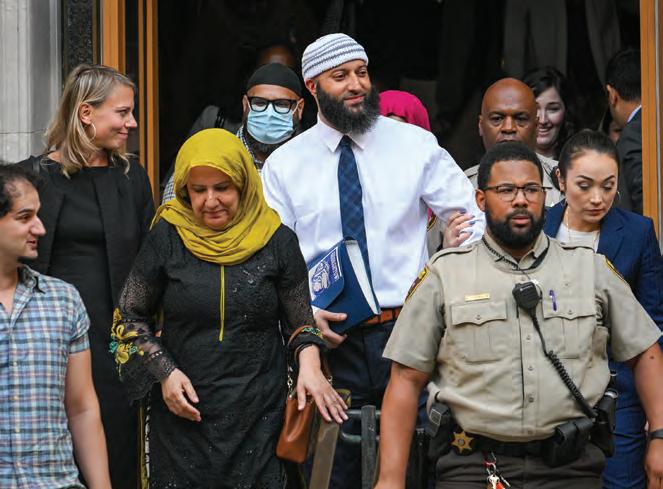
“[Feldman] was willing to see things from both viewpoints and she allowed herself to be bothered by what she saw,” Enright said.
To Enright, Feldman’s work as chief of the state’s new Sentenc ing Review Unit—which in the past 18 months has freed more than 40 people serving life sentences—shows why prosecutors should welcome defense attorneys into their ranks.
“People who have seen it from the defense side know the red flags,” Enright said. “They know that when you see a jailhouse informant with charges against him dropped, those things mean something. It doesn’t always mean the person is innocent, but it does mean you should look harder.”
The podcast, with the clinic’s help, uncovered and revealed new evidence that vacated Syed’s conviction once before, in 2016. Eight clinic students were involved, including “Team Syed” leaders Kathryn
Clifford Klorfein ’15 and Mario Peia ’15, who appeared on the show with Enright. Peia is now a federal prosecutor in California, while Klorfein works in-house for the Coca-Cola Co.
At the evidence locker in Baltimore, the UVA students found DNA material that had been collected at the crime scene but was never tested. They found an alternate suspect who had been released from prison about two weeks before the murder. They also discovered in consistencies in cellphone tower data that had been used to corrobo rate the testimony of a problematic witness.
The podcast brought out the fact that Syed’s attorney failed to contact an alibi witness who said she was talking to him at the high school library at the time of the murder.
The evidence that ultimately freed Syed did not come out until Feld man’s review. Among many other problems the Sentencing Review Unit found, prosecutors had two alternate suspects they never dis closed to the defense team. The suppression of such exculpatory ev idence is considered prosecutorial misconduct and is referred to as a Brady violation.
“I think that shows the importance of open discovery—this Brady evidence that came out was not something that we had back when UVA was investigating, because it hadn’t been provided to the defense,” Klorfein said. “So that was a pleasant surprise, but upsetting that it wasn’t discovered before he spent 23 years in prison.”
Without that evidence, another U VA g raduate, Cate Stetson ’94, who co-chairs the appellate g roup at Hogan Lovells and co-teaches the Law School’s Appellate Litigation Clinic, argued Syed’s earlier appeal on g rounds of ineffective counsel, which he ultimately lost when the Maryland Court of Appeals reinstated his conviction. The U.S. Supreme Court declined to take up his case.
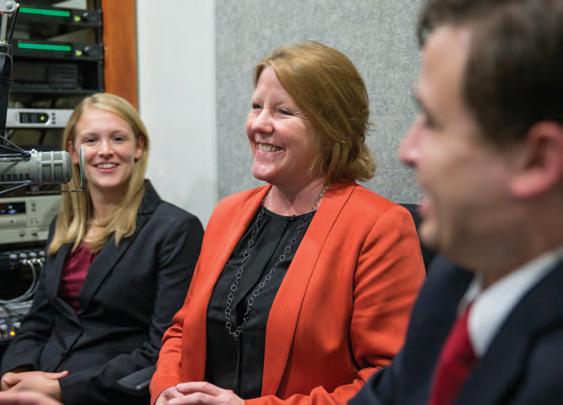
That, Enright said, appeared to be “game over.”
Enright said she a nd Koenig were “agog” at the latest t urn of events, to see Syed physically unshackled and released directly from the courtroom after all the years they and others spent combing through his case.
“ We heard about the motion on Friday and on Monday he walked out the door,” Enright said. “That’s crazy.”
Melissa Castro Wyatt
20 U VA LAWYER | Fall 2022
ADNAN SYED, THE FOCUS OF THE POPULAR CRIME MYSTERY PODCAST “SERIAL,” was abruptly released Sept. 19 after 23 years in prison. But without help from the Innocence Project, his story might never have reached millions and inspired so many to assist his cause.
❱ Deirdre Enright ’92 with then-students Kathryn Clifford Klorfein ’15 and Mario Peia ’15, who appeared with Enright on “Serial.”
❱ Adnan Syed was released from prison Sept. 19.
BALTIMORE SUN/CONTRIBUTOR
ADDISON/UNIVERSITY NEWS
DAN
ANOTHER VICTIM OF CORRUPT DETECTIVE WINS EXONERATION
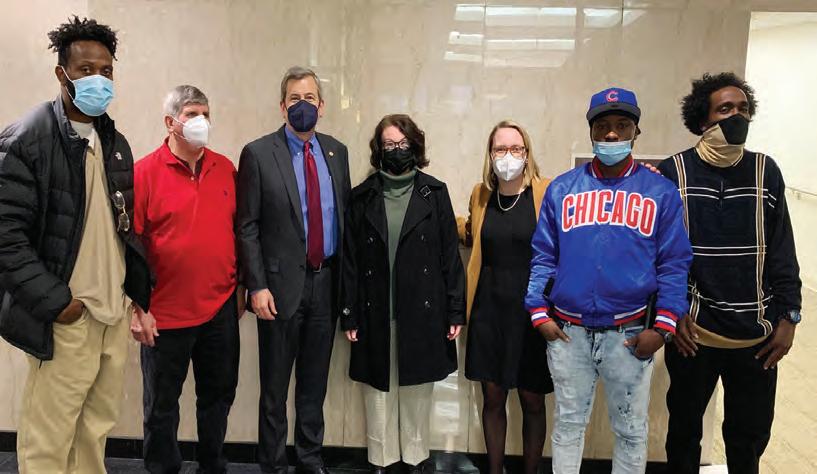
ON NOV. 5, 2001, GILBERT MERRITT III was sentenced to 30 years in prison for a murder that occurred the same day he nearly lost his own brother to a shooting. On July 11, more than 20 years later, the Innocence Project succeeded in a multiyear effort to vacate the Norfolk man’s conviction.
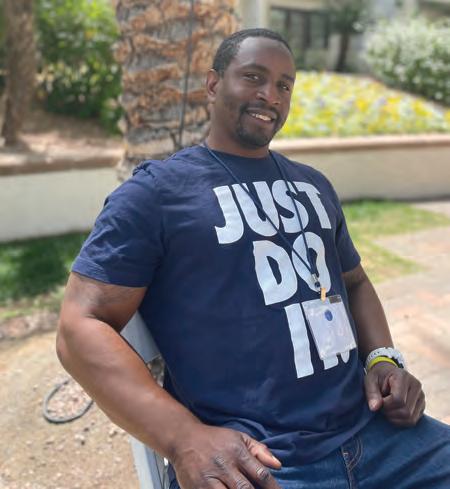
Merritt spent two decades incarcerated because a detective with a track record of extracting false testi mony through extor tion and brute force was able to convince a woman facing sig nificant prison time on drug charges to testify to crime details the detective would feed her. The woman, who became the star witness in the case, testified falsely at Merritt’s trial that Merritt had confessed to the murder.
In 2011, the detec tive, Robert Glenn Ford, was convicted of federal charges in cluding extortion, conspiracy to commit extortion and making false statements. His criminal conduct took place, in part, during the time of Merritt’s investigation and prosecution.
“When a case in volves Ford, that’s cer tainly a red flag, but we check each case that comes in fully to see if there’s merit to the person's claims,” said Professor Juliet Hatchett ’15, associate
director of the clinic. “This was one of the cases we received where we saw not only Ford’s involve ment, but also what a weak and suspicious case it was from the beginning.”
In January, Merritt was released from prison on a condi tional pardon, then was exonerated in July. His pardon and vacated conviction represent the third case in which the In nocence Project has been able to secure the release of an in nocent man con victed through Ford’s involvement. Ford was the lead detec tive in the cases of clinic clients Joey Carter and Kevin “Suge” Knight, who were recently par doned as well. In both cases Ford coerced witnesses to fabri cate false testimony against the defen dants. Several other people incarcerated through Ford’s cases have also been exon erated.
—Melissa Castro Wyatt
CLIENTS OBTAIN $6.25 MILLION IN COMPENSATION
Virginia is the only state where statu tory compensation is awarded by the Leg islature on a case-bycase basis, explained Professor Juliet Hatchett ’15, associate director of the Inno cence Project Clinic.
Lawmakers ap proved compensa tion via individual bills to Innocence Project clients Joey Carter, Lamar Barnes, Bobbie Morman Jr., Emerson Stevens, Jervon Tillman and Eric Weakley after
they received absolute pardons.
The clients partici pated in a broader lob bying effort as well, as the project proposed a range of reforms.
“Every person who serves time for a crime that he or she did not
commit should be compensated for his or her wrongful incar ceration,” said Profes sor Jennifer L. Givens, director of the clinic.
BOOK ON SHENANDOAH MURDERS HIGHLIGHTS RICE CASE
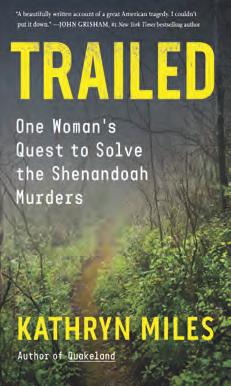
WHEN AUTHOR KATHRYN MILES FIRST SET OUT to write “Trailed: One Woman’s Quest to Solve the Shenandoah Murders,” she thought the tragic story she would be telling was the unsolved mystery of two young women mysteriously murdered in Shenandoah National Park. It hadn’t yet occurred to her that she would also capture the tale of the man suspected of those murders for 25 years.
Professor Deirdre Enright ’92, the founder of UVA’s In nocence Project and the director of a new clinic, the Project for Informed Reform, has spent most of her career defending the man, Darrell David Rice, who was pursued by both federal and state prosecutors over the course of two in dictments. Enright is confident enough in her client’s innocence that when Miles asked her to share her files, Enright gladly walked her through the entire case one more time.
“My experience of the people who usually write about these par ticular murders is that they always want the 12-second version, and I don’t work with people who aren’t serious,” Enright said. “She had read every paper in the court file. I thought, ‘OK, she really is going to write a book and I should try to help.’”
“Trailed” was tabbed as June’s book of the month by the Oxygen Channel’s book club and was re viewed by The New York Times in May.
Through the pages of “Trailed,” Miles unpacks the in vestigation of the murders of Julianne Williams and Laura “Lollie” Winans, from the moment their bodies were found just off the Bridle Trail near Luray in 1996 to the frantic efforts of Enright and her Inno cence Project students to persuade the FBI to conduct further testing of male DNA found at the crime scene, or
to allow Rice’s team to conduct their own testing.
—Melissa Castro Wyatt
Fall 2022 | U VA LAWYER 21
THE INNOCENCE PROJECT WORKED WITH STATE LAWMAKERS to obtain $6.25 million in compensation for six clients pardoned over the last year. The project also contributed to broader reforms on how wrongfully incarcerated defendants are compensated.
Mike Fox
❱ Jervon Tillman, Emerson Stevens, Del. Rip Sullivan ’87, Professors Jennifer Givens and Juliet Hatchett ’15, Lamar Barnes and Bobbie Morman Jr. meet at the Virginia State Capitol.
JULIET HATCHETT ’15 COURTESY PHOTO
“I WAS

BY


SINGLE GRANDMOTHER in rural Kentucky, and we were a very poor family. No one in my family had been to college or even gotten outside of that small-town bubble. So there was a lot of uncertainty about what my future would look like. In high school, I thought being a lawyer was my route to being a judge, prosecutor or even some other elected position. But in college, I found that my interests were somewhere else. I started studying finance and management, and the world of business was much more my vibe.”
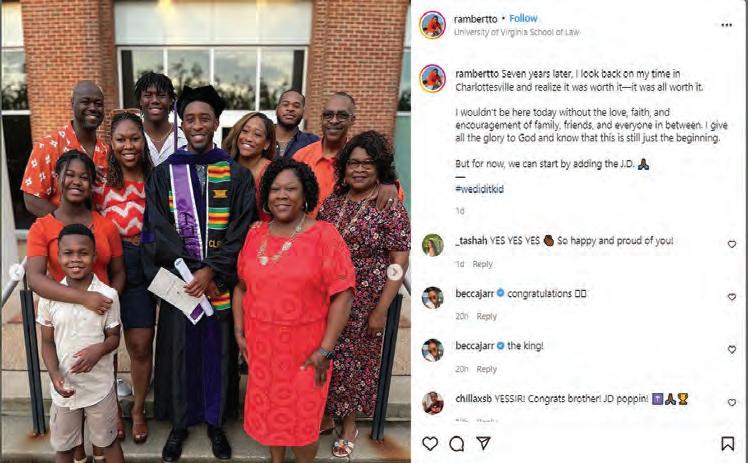
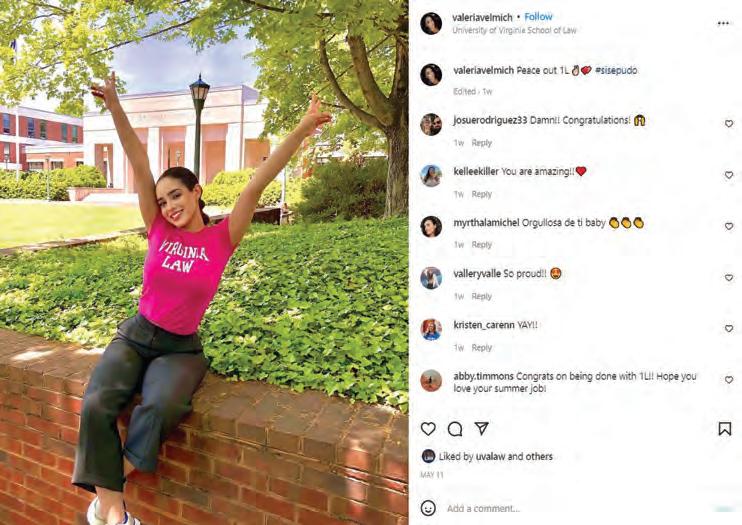
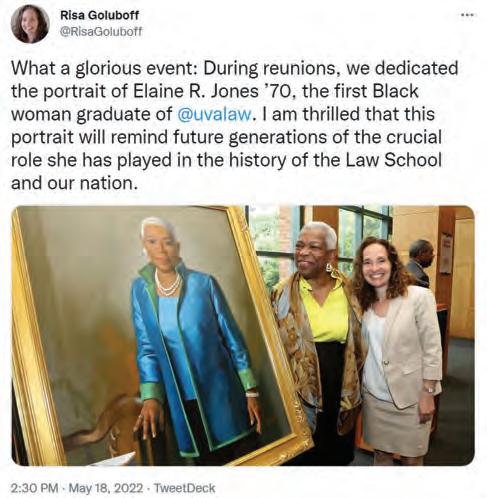 —TRISTAN DEERING
—TRISTAN DEERING

’24
before an immigration judge in a removal proceeding. I was able to appear under the supervision of the Immigration Law Clinic. The case is still in progress, but working with an asylee client has been incredible. As an immigrant, I recognize the immense privilege I have of learning the law, and using it to benefit others during law school has been really rewarding.”
—SABRINA MATO
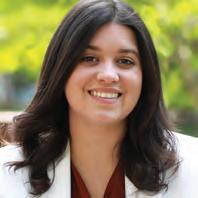
’24
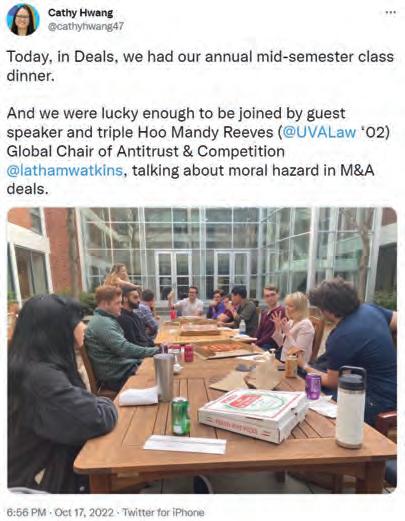
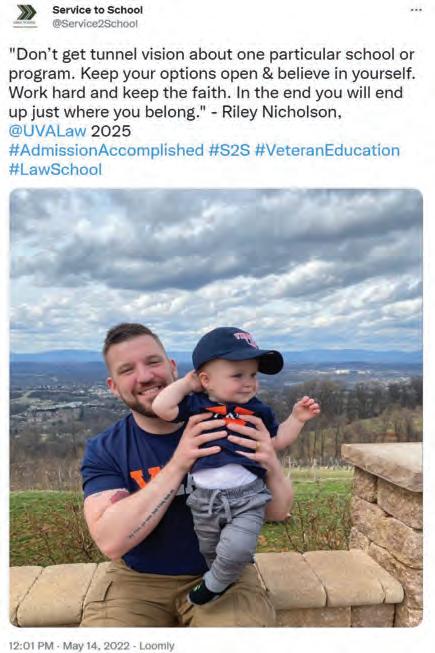
LAW.VIRGINIA.EDU/ STAR WITNESS
RAISED
MY
STAR
WITNESSES
“MY FAVORITE EXPERIENCE WAS A RECENT APPEARANCE
JOHNNY DEPP’S ATTORNEYS RECOUNT THEIR ‘SURREAL’ EXPERIENCE
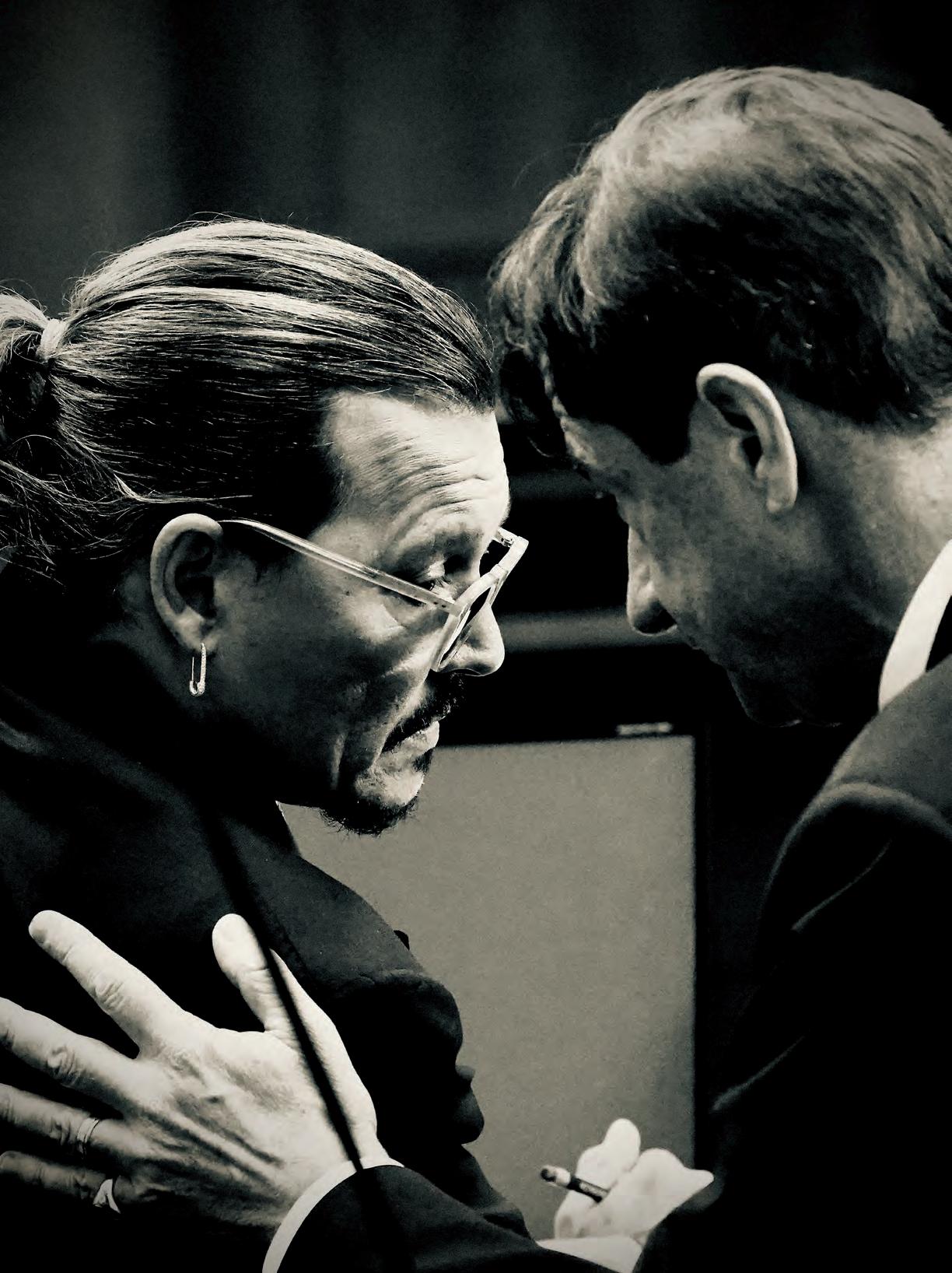
VIA
STEVE HELBER/POOL
REUTERS
INSIDE A ‘SURREAL’ EXPERIENCE TWO ALUMNI WHO REPRESENTED JOHNNY DEPP SHARE THEIR STORY
The University of Virginia g raduates making waves included Depp’s lead trial attorney, Benjamin Chew ’88 of Brown Rudnick. Chew had been representing Depp in business disputes for more than five years when Depp asked him to file the $50 million defamation complaint against his ex-wife Amber Heard for a 2018

Washington Post op-ed in which she said she “be came a public figure representing domestic abuse.” Heard countersued for $100 million, also alleging def amation.

Two weeks before the televised trial started, Chew reeled in another Wahoo to help. A trial partner from
 THE FAIRFAX COUNTY COURTROOM THAT WAS THE SITE OF THE LEGAL FEUD between Johnny Depp and Amber Heard was teeming with Wahoos, not all of whom were swimming in the same direction.
THE FAIRFAX COUNTY COURTROOM THAT WAS THE SITE OF THE LEGAL FEUD between Johnny Depp and Amber Heard was teeming with Wahoos, not all of whom were swimming in the same direction.
24 U VA LAWYER | Fall 2022
BY MELISSA CASTRO WYATT
the Boston office, Rebecca MacDowell Lecaroz ’06, stepped in to work with expert witnesses and ended up playing a key role with fact witnesses.
Across the aisle, a third Wahoo—and another Benjamin, this one by the name of Rottenborn—was leading Heard’s team. Rottenborn, a Stanford Law School a lumnus, earned his bachelor’s degree f rom the University of Virginia in 2003 a nd worked pro bono to help nine victims of the Unite the R ight rally violence recover $26 million in damages in Sines v. Kessler. The Woods Rogers partner also taught federal litigation courses as an adjunct at U VA Law from 2013 to 2018, driving up from Roanoke to do so. (Rottenborn did not respond to requests for an interview.)
In the media frenzy that followed, it was too easy to forget that the abuse allegations that emerged during the trial were weighty and serious, and required the lawyers to walk a fine line as advocates.


LECAROZ JOINED THE TEAM after spending several hours discussing the facts to make sure that she, like Chew, believed Depp was defamed.
“I think it’s fair to say generally that all of us support the #MeToo movement and tend to believe women, so we did a lot of due diligence because truth is a lways a defense in a defamation case,” Chew said. “But for those who came aboard later, they had to take their own journey a nd see t he facts t hat were somewhat

100 CHANGE AGENTS SPRING 2020 UVA LAWYER 25 Fall 2022 | U VA LAWYER
❱ Johnny Depp’s attorneys Benjamin Chew ’88 and Camille Vasquez speak to the media after the jury announced split verdicts in favor of both Depp and his ex-wife Amber Heard at the Fairfax County Circuit Courthouse in June.
REUTERS/TOM BRENNER
CHEW ’88
counterintuitive. It was important to him t hat each member of the team believed in him—not that he was a perfect person, because he’s not—but that everybody believed t hat he did not do this.”
Depp’s team had the bigger victory in court, with the jury awarding him $10.35 million, while Heard was awarded a $2 million verdict in her counterclaim. But Depp’s lawyers a lso b ecame minor media celebrities whose courtroom moves were analyzed almost as closely as the celebrity com batants’. W hile Chew a nd Lecaroz have been honing their trial advocacy skills since their days at UVA, nothing could have prepared them for the onslaught of attention they experienced on social and mainstream media.

“IT’S QUITE SURREAL for all of us, as you can imagine,” Chew said in an interview in August. “Johnny’s view was, ‘I want people to actually hear my side of the story—the more, the better,’ but I don’t think even he had any understanding of the interest that would ensue.”
The underlying issues in the case were anything but funny yet, for the lawyers, the outpouring of attention has been absurd, humorous and, at times, creepy.

Other t han t he opening a nd closing arguments, Court TV’s cameras were trained mostly on the famous litigants. But the cameras also captured the litigators in some candid and viral moments. There was t he moment Chew allegedly “fist-pumped” when L ecaroz’s c rossexamination of Heard’s sister opened the door to ad mitting Depp’s ex-girlfriend, Kate Moss, as a rebuttal witness. Social media critics jumped on Chew for his emotional reaction, while others made v ideo shorts of t he crossexamination and praised Lecaroz’s performance. (The Wahoo—the unofficial mascot of U VA—wasn’t quite the right kind of game fish to describe her; one fan called her “the quiet shark” of the team.)
Chew agrees that Lecaroz is, in fact, a quiet shark. “Rebecca’s the brains behind this operation—I’m just the front person,” Chew said.
26 U VA LAWYER | Fall 2022
“It was important to him that each member of the team believed in him—not that he was a perfect person, because he’s not— but that everybody believed that he did not do this.”
—BENJAMIN
❱
Rebecca MacDowell
Lecaroz ’06 joined Depp’s team of attorneys.
STEVE HELBER/POOL
VIA REUTERS
REUTERS/TOM BRENNER
Chew, who joined the firm as a partner from Manatt Phelps in 2018, works in sports and entertainment law (he defended Cher in a lawsuit related to a film she produced) and in complex commercial litigation. He has represented multiple foreign governments a nd officials, including some who were prosecuting their own defamation claims.
The social media ecosphere seems drawn to t he Brown Rudnick team as much for their apparent ca maraderie as for their impassioned advocacy for Depp. Viral v ideos captured several moments outside t he courtroom, including Chew shuffling out carrying his own lectern a nd the team posing with pirate-hatted alpacas brought by a Depp fan.

IN THE UVA LAW INTERVIEW, the lawyers talked about what the work and the verdict meant to them.
After spending nearly two months working and semisleeping at the T ysons Ritz Carlton, Lecaroz said she’s convinced her colleagues a re indeed “who you want around the conference table with you at 3 a.m.”
Chew choked up describing his own feelings about the trial.
“I wear my heart on my sleeve, and there was a lot of emotion in the courtroom,” Chew said. “But we really felt that our client’s life was on the line, so that maybe led to more emotion than normal cases.”
Heard’s attorneys filed a notice of appeal in July.
Ironically, despite the tsunami of online attention paid to Chew and Depp’s other lawyers, a Google search for “Benjamin Chew Lawyer” turns up a different American lawyer as the top hit. The original Benjamin Chew was a Philadelphia Quaker who became a lawyer the oldfashioned way, by reading law and apprenticing under Andrew Hamilton.
Hamilton is known for the 1735 John Peter Zenger case, which established truth as an absolute defense to libel and defamation. That Revolutionary era Chew went on to represent William Penn, founder of Pennsylvania, and his family for 60 years, including in defamation and libel cases. That Chew is also the great-times-eight grandfather of Johnny Depp’s candy-loving defamation lawyer, Ben Chew of Brown Rudnick.
“My wife says that things happen for a reason, and I’ve come to believe that, too,” Chew said. “Not to be weird, but I do think it was meant to be.”
Fall 2022 | U VA LAWYER 27
❱ Chew and co-counsel Camille Vasquez became social media stars over the course of the trial.

PROCTER &
COURTESY
GAMBLE
AS DEBORAH PLATT MAJORAS ’89, PROCTER & GAMBLE’S OUTGOING CHIEF LEGAL OFFICER, was getting ready to retire in September, she had the rare experience of being invited— multiple times—to surprise gatherings feting her as she departs from the legal profession and celebrating the mark she is leaving on the current generation of lawyers. Even Arianna Huff ington threw her a private retirement party at her home.
In response, the UVA Law alumna—whose accomplishments far outstrip her ego—borrowed a line from “Monty Python and the Holy Grail,” as the undertaker goes about piling plague v ictims on a cart: “Hey, I’m not dead yet!”
PLANNING HER ‘REWIREMENT’
Indeed, t he former antitrust lawyer, former chair of the Federal Trade Commission and current member of at least four boards of directors isn’t quite ready to climb on the cart, even if she is ready to step away from the dizzying career heights she’s achieved.
 BY MELISSA CASTRO WYATT
BY MELISSA CASTRO WYATT
“I’m not calling this retirement, I’m calling it ‘rewirement,’” Majoras said in a Zoom interview from her home in Cincinnati, one week out from her formal retirement. “These are pretty ‘on 24/7’ jobs, and I wanted to get out of that while I still have some energy to go on and do some other things.”
Majoras a nd h er m ost t rusted adviser—her husband, John—are moving back to Washington, where John still co-leads the business and tort litigation group at Jones Day.
If Huffington has her say, Majoras’ next act will involve nothing short of “transforming the well-being of the legal profession,” as she has previously partnered w ith Huffington’s latest enterprise, Thrive Global, a n online platform to d iagnose professional burnout in real time and deliver “microstep” advice to help users build healthier habits. (Huff ington started Thrive Global in 2016 after she suffered a frightening collapse in her office.)
“Arianna announced it at that dinner party, that she thought it would be a g reat thing for me to think about taking on,” Majoras said, laughing. “I do have a lot of passion for the subject, and I have a lot of passion for developing people, so I will think about those things.”
INSIDER Fall 2022 | U VA LAWYER 29
FTC
MAJORAS
RETIRES
PROCTER
GAMBLE
FORMER
CHAIR DEBORAH PLATT
’89
FROM
&
THAT PASSION FOR LEADERSHIP AND MENTORSHIP shows through in conversations with Majoras.
She remains close to one of her earliest professional mentors, Joe Sims, who ran the antitrust practice g roup at Jones Day when Majoras joined the firm two years after graduating from law school.
Majoras had joined the firm’s Chicago office as a litigation as sociate after a clerkship at the U.S. District Court for the District of Columbia. In law school, she took antitrust law during her final semester but often skipped the class to head to Chicago for long weekends to see her boyfriend, a law student at Northwestern.
It wasn’t until she studied for the final exam that she realized how fascinating the field was, blending economics with consumer psychology. (She still pulled an A-minus.) During her clerkship, she had a second bite at that antitrust apple, when the FTC brought a case before her judge, seeking to enjoin a major proposed merger.
“I lined up a ll of the binders the parties submitted, a nd they covered the whole table in the jury room,” Majoras recalled. “There was just me to sit and read though them. I again thought it was so fascinating—I mean, it’s about how markets work and how consum ers make choices as human beings.”
By letting the merger go through, they decided the case against the agency she would go on to lead 13 years later.
When she joined Jones Day’s Chicago office, Joe McEntee, the office’s managing partner, mentioned to Sims—a D.C. partner—that he had a talented young litigation associate who had expressed interest in doing some antitrust work.
“She never worked another hour for Joe McEntee,” Sims said, laughing. “And he never failed to remind me of that!”
What made Majoras stand out from other associates, and made Sims want to take her under his wing, was her “tough-mindedness” and her “incredible ability to relate to t he people she’s dealing with,” Sims said.
“She may well have had concerns about her ability in particular areas, but she never let it show, a nd she always seemed like she was in charge,” Sims said. “She can talk to anybody about anything and make them feel like they’re the most important person in the world at that moment. And that’s a pretty rare skill, especially when matched with a high-performing legal ability.”
Sims would go on to g ive Majoras an increasing workload and eventually entrusted her to run a deal on her own. She frequently tells this a necdote about the moment she received this first big opportunity from Sims: “I was really excited and, when he went to leave my office, he looked back at me and just said, ‘Hey, Deb? Don’t [mess] this up.’”
When s he i s mentoring o ther y oung leaders t hese d ays, she t alks a bout h ow s he h andled t he “ oh c rap” m oment that f ollowed, a s t he i mposter s yndrome f eelings c rept i n.
“The only way to deal with it is to put one foot in front of the other and just do what you know how to do well,” Majoras said. “The stuff you’re good at will start carrying you through, then all of a sudden you find yourself thinking the right thoughts and making the right judgments and the imposter has to shut up for awhile because you’re actually doing it.”
That confidence—and her willingness to make definitive decisions and give clear advice—helped her become partner at Jones Day and then deputy assistant attorney general in the Justice Department’s
Antitrust Division in 2001. (She later rose to principal deputy).
In 2004, she returned to Jones Day but, before she could even unpack her boxes, the White House personnel office called and asked if she would like to be considered for the open chairmanship of the Federal Trade Com mission, which shares an titrust jurisdiction with the DOJ. (Coincidentally, between 2004-05, she oversaw U.S. a ntitrust law in conjunction with fellow Hoo a nd g ood friend R. Hewitt Pate ’87, who was the assistant at torney general in charge of the Antitrust Division from 2003-05.)
Born i n Meadville, Pennsylvania, Debbie Platt first moved to D.C. in 1985, fresh out of West minster College, a small, liberal arts school in her home state. She took a job as a receptionist in the D.C. office of a Columbus, Ohio-based law firm, Porter Wright Morris & Arthur They quickly made her a paralegal and advised her to apply to law schools—one partner planted the idea of going to “Thomas Jefferson’s law school.”
When she realized she would qualify for in-state tuition at Virginia, the deal was sealed. “I went to UVA Law sight unseen,” she said.
She came away, she said, a more well-balanced lawyer.
“We were living the balance together as human beings,” she said of her classmates and professors. “ We were learning and showing that it’s possible to be really devoted and excellent at what you do while at the same time being a good person to the people around you.”
As Sims noted, together, those innate traits and learned skills packed quite a punch. In 2006, just 17 years after g raduating from UVA Law, Washingtonian magazine deemed Majoras one of the 100 most powerful women in Washington, alongside Ruth Bader Ginsburg, Condoleezza Rice and Hillary Rodham Clinton.
WHEN MAJORAS LOOKS BACK on her time in D.C., that’s not the type of influence she chooses to highlight. She would rather talk about the people she mentored, like Brian Huseman, an FTC at torney adviser whom she promoted to her chief of staff. He’s gone on to run public policy for Amazon. Or Lydia Parnes, an FTC vet who now leads the privacy and cybersecurity g roup at Wilson Sonsini.
These people are likewise eager to talk about Majoras and the impact she had on them.
“She spent a lot of time coaching us, investing in us, providing us stretch opportunities,” Huseman said. “And it didn’t end when I
INSIDER 30 U VA LAWYER | Fall 2022
In 2006, Washingtonian magazine deemed Majoras one of the 100 most powerful women in Washington, alongside Ruth Bader Ginsburg, Condoleezza Rice and Hillary Rodham Clinton.
stopped working for her. That relationship I have with her is one of my most valued relationships.”
AFTER SEVEN YEARS spent balancing the interests of consumers and corporations in Washington, Majoras moved to Cincinnati to join the world’s second-largest consumer products company, Procter & Gamble, in the general counsel’s office. Within two years, she took over as chief legal officer, overseeing a 500-per son legal department advising a behemoth that does business in 180 countries.

Besides grooming her successor, Susan Whaley, one of the things Majoras said she is most proud of at Procter & Gamble is the well-being initiatives she led, first for the legal department and then companywide. Over the course of 10 years, the legal employees’ self-reported well-being scores went f rom about 50% positive to almost 90% positive, she said. Policy changes ranged from offering hybrid work arrangements to more gen erous leave periods.
Majoras herself took a nine-week sabbatical in lieu of
retiring in 2019. Rather than diminishing her standing among her colleagues, taking the mental break earned her kudos.
“Even from very senior people, I was getting all these notes saying, ‘ You’re g iving us permission to take care of ourselves because you’re an officer of the company,’” Majoras said. “Oh my God, it’s so bad t hat we need permission to take care of ourselves, but we do—it’s just how we’re wired.”
People have long told Majoras she would know when the time was right to step aside, and this time—unlike 2019—she’s sure. In part, it goes back to her desire to give her mentees the opportunity to stretch themselves the way Joe Sims let her.
“In a promote-from-within culture, which P&G is, the leader has to know when to get out of the way, because if you stay too long, you’ll skip a generation who will never have the chance to lead,” Majoras said. “The next generation is ready to put their stamp on this, to take what we’ve done and build on it.”
Fall 2022 | U VA LAWYER 31
❱ Majoras welcomed new students at UVA Law’s orientation in 2011.
CATCHING UP WITH ALUMNI
DESCRIBE YOUR WORK: I advise teams developing and managing a section of software products for Google Play. The scope of my advice addresses legal require ments and risks for all stages of a product’s life cycle. What are the consumer protection consider ations when designing the product? What regulations do we need to comply with if we want to expand to a new country? How do we manage data or our third-party relationships when we decide to change or sunset a product? Prod ucts under my coverage also influ ence customer growth and loyalty metrics, so part of the job is engag ing with product teams on how to balance risks with opportunity for meeting goals of the business.
WHAT ACTIVITIES DO YOU ENJOY OUTSIDE OF WORK? I enjoy rest— traveling, having a nice dinner with friends or family, practicing self-care. Health and wellness became more important to me during the pandemic, so I priori tize mornings at the gym and vol unteer coaching with Girls on the Run. After moving to the tech industry, I became more curious about the business side of the house, so my primary non-work activity is actually taking part-time courses at the Darden School of Business.
ARE YOU WHERE YOU EXPECTED TO BE AT THIS STAGE OF YOUR CAREER AND LIFE? I’m exactly where I wanted to be, but admittedly, I was always skeptical on timeline because there was not a clear path to follow. I expected to spend more time in firms in order to get the range of subject matter expertise needed to be a product counsel. As it turns out, I was able to exit earlier for a great opportunity at a smaller tech company, Twitter, which allowed me to grow quickly on the in-house side.
CHARIS REDMOND ’17

PRODUCT COUNSEL GOOGLE WASHINGTON, D.C.
WHAT DO YOU LIKE ABOUT YOUR LIFE 5 YEARS AFTER LAW SCHOOL? Despite being pretty busy, my life feels balanced. I’m surprisingly content with where I am, and I feel in control of where I can go. In the past, I experienced uncertainty and growing pains both profes sionally and personally, which I think is to be expected as a young professional. Now, I have a great support system and flexibility to explore new interests, give mean ingfully to my community, and be present for the important people and moments in my life.
JULIA DAVIS
5
BILL PETROS
DESCRIBE YOUR WORK: My practice focuses on mu nicipal law and all aspects of running a city. I work with our elected and appointed officials on legislation, planning and zoning matters, and anything else that arises. I spent much of the last few years working on COVID-19 related emer gency orders, economic recovery and environ mental issues. I also often advise the city and its employees on the intricacies and nuances of Florida’s Sunshine Law.
WHAT ACTIVITIES DO YOU ENJOY OUTSIDE OF WORK? I am the proud mother of two young kids (ages 4 and 2) and spend most of my time (along with my husband, Charlie, a fellow ’12 alum) chasing them around and driving them to activities. I am also an active member of the Junior League of Miami, having served on the board and executive management team, and I love to host dinner parties every few months with my Cookbook Club.
ARE YOU WHERE YOU EX PECTED TO BE AT THIS STAGE OF YOUR CAREER AND LIFE? No, but I am so happy I am where I am! I grew up in California and never imagined living in Miami after UVA, but working in municipal government has really shown me all the won derful things South Florida has to offer. I was thrilled to become boardcertified in city, county and local government by the Florida Bar this year and feel lucky to have been able to find a legal specialty I love at this point of my career.
WHAT DO YOU LIKE ABOUT YOUR LIFE 10 YEARS AFTER LAW SCHOOL? I love working in public service, am grateful for my family and friends, and I like feeling confi dent in my personal and professional choices.

10STEPHANIE MOORE THROCKMORTON ’12 ASSISTANT CITY ATTORNEY CORAL GABLES FLORIDA 5, 10, 15 AND 25 YEARS AFTER
Fall 2022 | U VA LAWYER 33
LAW SCHOOL
INSIDER
DESCRIBE YOUR WORK: My practice focuses on busi ness, construction and intellectual property litiga tion, but I like to say I am a dispute lawyer for a variety of businesses and individu als. In the past two years, our firm litigated, at trial and on appeal, an LLC membership dispute re sulting in a seminal busi ness valuation decision. I’ve handled numerous construction defect cases. And recently, I’ve litigated disputes involving social media influencers, which has provided me an eyeopening insight into the market power of these influencers vis-à-vis tradi tional advertising.

WHAT ACTIVITIES DO YOU ENJOY OUTSIDE OF WORK? My wife and I have three kids, so we stay busy with school and youth sports. I grew up on the water and I cannot go that long without seeing the Gulf of Mexico. Al though I now live in a landlocked city, I’ve come to appreciate the beauty and convenience of Percy Priest Lake in Nashville (along with the ingenuity and foresight shown by our federal government in creating these lakes). I have taken up wake surfing, which is a thrilling, lowimpact activity that’s best enjoyed with a group.
ARE YOU WHERE YOU EX PECTED TO BE AT THIS STAGE OF YOUR CAREER AND LIFE?
Yes. While I chose to prac tice law for a career, I have always had an entrepre neurial desire to own and operate my own business and firm. The other day I was on the phone with a fellow UVA Law grad about a discrete copyright legal issue. My friend re minded me how lucky I was to work on cases with interesting and diverse subject matter. That was nice to hear, because it’s a grind.
WHAT DO YOU LIKE ABOUT YOUR LIFE 15 YEARS AFTER LAW SCHOOL? I feel fortu nate to play a role in helping people solve serious problems.
HOWELL O’REAR ’07 PARTNER MCINTEER & O’REAR PLC NASHVILLE, TENNESSEE 15 INSIDER
JULIA DAVIS
ERIC KADEL ’97 PARTNER SULLIVAN & CROMWELL WASHINGTON, D.C.

DESCRIBE YOUR WORK: I am co-chair of Sullivan & Cromwell’s foreign investment and trade regulation, and economic sanctions and financial crime groups. My clients include a wide range of financial institutions, firms and other investment vehicles, and companies operating in a wide range of industries. I also serve as counsel to the issuer or underwriters for a number of multilateral development banks in their capital-raising activities, including the World Bank, Inter-American Development Bank and International Finance Corporation. In addition, I am involved in a variety of public service matters, including important work with The Public International Law & Policy Group, a global pro bono law firm providing legal assistance to parties involved in peace negotiations, drafting post-conflict constitutions, and war crimes prosecution and transitional justice.
WHAT ACTIVITIES DO YOU ENJOY OUTSIDE OF WORK? I very much enjoy the performing arts, and I serve as a trustee on the board of the Washington National Opera and am an active supporter of the Wolf Trap Foundation for the Performing Arts. I enjoy fine wines, and have married my interest in wine with support for the American Heart Association in serving on the Auction Committee of the Heart’s Delight charity wine tasting and auction held each year in Washington, D.C. I try to stay physically active, mainly with golf, tennis and pickleball, and exploring local parks with my dog, Parker, who is a black lab. My wife and I have two boys, one of whom is currently a third-year on Grounds, and you can often find us supporting UVA’s sports teams at Scott Stadium, the Virginia Tennis Facility at Boar’s Head, John Paul Jones Arena, Klöckner Stadium or—when we can’t get to Charlottesville—from home.
ARE YOU WHERE YOU EXPECTED TO BE AT THIS STAGE OF YOUR CAREER AND LIFE? I don’t know that I really would say that I had specific expectations about how things might turn out when I left the Law School in May 1997. I feel fortunate to have been with Sullivan & Cromwell since I finished my postgraduation clerkships, to have had some great mentors and to have made many great friends along the way, and to have had a variety of extremely interesting and enjoyable experiences so far. I’m looking forward to what the future brings!
DO YOU LIKE ABOUT YOUR LIFE 25 YEARS
WHAT
AFTER LAW SCHOOL? I know that I have been very fortunate, and I truly am grateful for the love and support of my family and friends. I recognize that the three years that I spent at the Law School were a gift, and that UVA Law presented some really fantastic opportunities to me. I’m happy that I’m now in a position to support and mentor others who are just starting out in their legal careers, and hope that I can help make a positive impact in others’ lives.
Fall 2022 | U VA LAWYER 35 25
5, 10, 15 AND 25 YEARS INSIDER
BY NAOMI CAHN AND SONIA SUTER
COLORADO’S LEGISLATURE RECENTLY PASSED GROUNDBREAKING LEGISLATION ON THE RIGHTS OF DONOR-CONCEIVED CHILDREN that, although focused on Colorado, could affect the multibillion-dollar fertility industry and the tens of thousands of children born each year through sperm and egg donation. The Colorado legislation goes beyond what any other state has done. It provides that, once they turn 18, donor-conceived people can learn the identity of their donor. It also sets limits on the number of families that can be created through any particular donor, and requires g uidance for donor-conceived people, recipi ents and donors throughout the process, including disclosure to the donor’s other donor-conceived children.
In considering such legislation, Colorado has stepped into a vacuum. At the na tional level, there’s an absence of clear rules and laws regulating assisted repro ductive technology. The federal government requires only that donated sperm and eggs be treated like other human tissue and tested for communicable diseases— infectious conditions that spread through viruses, bacteria and other means—but
conceived children, recipient parents and donors. And they are beginning to legislate in ways that protect those interests, including en suring that donor-conceived people and their parents receive important information about the medical, criminal and history of donors.
Some states, such as California and New York, impose requirements on sperm banks while other states, such as New York and Ohio, impose requirements on donors. An increas ing number of states have enacted fertility fraud legislation.
HOW THE RIGHTS OF DONOR-CONCEIVED PEOPLE ARE BECOMING LAW
not for genetic diseases. There are also no federal requirements that sperm banks obtain and verify information about a donor’s medical history, educational back ground or criminal record.
Because the federal government does not track the outcomes of assisted insemi nation by sperm donors, the total number of donor-conceived people is unknown, although there is somewhat better data on children born through egg and embryo donation.
Yet, technology is showing the cracks in this system of nonregulation. DNA tests, including direct-to-consumer kits like 23andMe, are rendering donor ano nymity increasingly difficult to maintain. Novelist Dani Shapiro found out at age 54, via genetic testing, that she was donor-conceived and, through the internet, found her donor. Internet searches also make it easier to see whether a donor, once identified, has misrepresented their personal information. For example, a Georgia couple sued a sperm bank after learning that the sperm donor had misrepresented his level of education and failed to disclose his diagnosis of schizophrenia—a heri table mental health condition—or his prior arrest. As more donor-conceived people discover their origins, there is a growing movement to recognize their interests.
Although the federal government has not gone beyond minimal regulation, such as requiring that donor gametes be tested for various sexually transmitted diseases, states are free to regulate as they see fit, consistent with the commerce clause and other constitutional g uarantees. Indeed, states are beginning to take action in this area relying on their authority to do so as part of their police powers and because of their interest in protecting children. Moreover, the government is already active in the donor conception area, providing different rules for chil dren born through donor conception than for children born through other means.
States have a rational, perhaps even compelling, interest in regulating the com mercial industry of gamete and embryo banks to protect the well-being of donor-
Other states have started to address the dis closure of donor-identifying information and medical history when a child turns 18. A number of states, including California, Connecticut, Rhode Island and Washington, have enacted the Uniform Parentage Act. The measure re quires clinics to collect identifying in formation from donors and indicate whether donors have agreed to dis closure. Even if the donor has not consented to disclosure, the clinic must make a “good faith” effort to provide the child with nonidentifying information and to notify the donor of any request for information, allowing the donor to reconsider the disclosure declaration.
Another pending measure in New York would require sperm and egg donor banks “to collect and verify medical, educational and criminal felony conviction history information” from any donor. That legislation would also provide recipients and their donor-conceived people the right to obtain such information without personally identifying the donor.
The need for legislation is clear. Anonym ity—as a pragmatic matter—can no longer be guaranteed. Accordingly, state regulation can help set out thoughtful g uidelines that are re sponsive to the various interests at stake. More fundamentally, donor-conceived people have interests that legislation can protect.
NAOMI CAHN is the Justice Anthony M. Kennedy Distinguished Professor of Law, the Nancy L. Buc ’69 Research Professor in Democracy and Equity, and co-director of the Family Law Center at UVA Law. SONIA M. SUTER is the Kahan Family Research Professor of Law at George Washington University Law School. This op-ed, condensed for length, was first printed in The Hill.
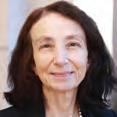
INSIDER
36 U VA LAWYER | Fall 2022
PlottingaCourse
 BY MELISSA CASTRO WYATT
BY MELISSA CASTRO WYATT
ILLUSTRATIONS/ALEX FINE UVA Law’s Roadmap Scholars Initiative Helps Future Law Students Find Their Way
JONAH VAZQUEZ HAS THE MAP OF NEW YORK’S A TRAIN
ETCHED INTO HIS BRAIN AFTER RIDING IT FOR TWO HOURS EVERY DAY FOR 10 YEARS.
As if by muscle memory, he would hop on at the train’s terminus in Far Rockaway, Queens, roll past JFK International Airport and curve back around to slice through a much wealthier Brooklyn neighborhood. At 8 a.m., he would hop off the train at Bedford Avenue and walk two blocks to the Williamsburg High School for Architecture and Design.
THOSE 24 MILES OF TRACK provided his map out of Queens, his ticket to a life more comfortable than the one he had inher ited. Vazquez had come out as gay to his Puerto Rican parents as a high school freshman. His father disowned him, while his mom continued to struggle with acceptance and reconciliation.
For much of that school year, he cried himself to sleep at night. Before walking into his high school each morning, he would put on a happy face.


“I had no choice but to be OK and put on a smile,” he said. “I would tell myself, ‘In here, you’re someone; in here, you have a chance of making it beyond the situation at home.’”
Vazquez’s accomplishments earned him a Posse Foundation scholarship to Vanderbilt University, and there he declared himself an “unaccompanied homeless youth” on financial aid forms to avoid going home and getting into violent confronta tions with his dad.
But once Vazquez was safely ensconced in Nashville, he

needed a new map, one that could plot the decisions and moves he would need to make to get from first-generation college student to first-generation lawyer.
His mom, who works as a team lead at a call center, had no way of drawing such a map for him. Her own educational opportunities ended during her junior year of high school when her vocational school was shut down because it was the lowest-performing such school in the city at the time.
“My mom’s own mom had dropped out of high school, earned her GED, got a job and got married,” Vazquez said. “So my mom didn’t really know where to go or what to do when the school closed down. All she had seen was get your GED and go to work.”
When Vazquez looks at the strong matriarchs in his family, he sees resourceful women who suffered the direct conse quences of systemic failures they did not cause and did not understand.
38 U VA LAWYER | Fall 2022
JULIA DAVIS
pieces that they don’t even know are there,” Vazquez said. “You don’t know what you don’t know, so how can you ever course correct?”
IN NOVEMBER 2020, A UVA LAW TEAM SET THE GEARS IN MOTION


to begin developing a program that would draw the missing map for a cohort of students like Vazquez: rising college juniors with strong academic records, an interest in law, and an absence of resources and networks that would help them pursue that dream at the highest level.
DEAN RISA GOLUBOFF had in mind some thing akin to the burgeoning number of related programs—typically referred to as pipeline programs—that are popping up in higher education, law firms and bar associations across the country. Through conversations with U VA Law students, Goluboff was determined to create a more comprehensive and transforma tional program than what she saw else where. She sought additional input from undergraduate students, peer schools and historically Black colleges and uni versities.
The team—initially including Gol uboff; Grace Cleveland ’09, chief of staff to the dean; and Kate Martin, director of development at the U VA Law School research ed to identify the “We talked with backgrounds who pipeline programs to create something and very meaningful tion and experience,”
The alumni pr dotes about the r low-income college $300 car repairs to to support their families
By March 2021, what a truly compr but much remained on board as UVA’s and belonging. H where he filled a assistant director of admissions at his alma mater, the Univer sity of Michigan Law School.
Part of what drew Jefferson to UVA Law was the opportu
nity to shape and implement what came to be called the Roadmap Scholars Initiative. He, along with Cleveland, would spend the next seven months designing a program that would fill the gaps and remove the obstacles identified as critical to enabling first-generation and low-income students to attend a law school like UVA.
As a first-generation student at Morehouse College, Jef ferson experienced the sense of disorientation among high achievers who lack the mentoring and resources that students with highly successful parents often have. At Morehouse, sur rounded by Black students, many with more privileged back grounds, he excelled academically but lacked direction on how his success might chart a path toward a professional career.
“I had some vague sense that I might want to pursue grad uate studies, but I didn’t have any sense of the ways in which one would put together a law school application,” Jefferson said. “I had a good academic record, but no one ever said to me, ‘Hey, you should continue to make good grades because school.’” he ould tudents. argin nder the .94— A one efferson lse to and nless omeone to want to on he at pro eam pipeline needed to include in-person experience over the summer and financial support.
The Charles A. Dana Foundation funded a program that
Fall 2022 | U VA LAWYER 39
“It’s just a matter of the system failing and continuing to fail and to leave it to the individuals to pick up the pieces—
❱ The inaugural class of Roadmap Scholars, pictured in June.
❱ Roadmap Scholars
Aspen Andersson and Alan Macias talk in a UVA Law seminar room.
MARY WOOD
paid Jefferson’s junior and senior-year tuition, along with a stipend, to allow him to work on graduate-level research to decide whether he wanted to pursue a Ph.D It also connected him with mentors and a network of similarly situated students at different schools.
Roadmap’s working group decided on a two-year program for rising juniors that would bring students to Charlottesville for mini-law school classes for one summer, support their LSAT preparation their junior year and bring them back to Charlottesville the following summer to polish their applica tions and train them to succeed in their upcoming paid intern ships. All of that would be supported by mentors and stipends.
“Whatever the stressors are for first-gen and low-income kids—and they are significant—they wouldn’t face them when they were with us,” Jefferson said. “Just read the cases and enjoy, and figure out if you want to be a lawyer.”
The initiative is the most comprehensive pipeline program offered by any elite law school, providing “soup-to-nuts support” for learning about the law, the legal profession and the application process, according to Goluboff.
The project received its first major endorsement in the form of a significant gift from Thomas R. Denison ’86, a trustee of the Law School Foundation who has taught as a lecturer at the school for 12 years. A little over a year after the program first took shape, the team received more good news. The Jef ferson Trust, a UVA donor-led initiative that provides seed funding to innovative projects that can spark scalable change, would award the Roadmap Scholars Initiative $200,000. It
was the largest grant the trust has made in its 16-year history, according to Brent Percival, the trust’s executive director.
“This grant is one I am particularly proud of,” Percival said. “Not just for the size, but for the impact it has had and will have, due to the brilliance of the idea and plan under Risa’s leadership.”
Mark Stancil ’99, a Jefferson Trust board member and Triple Hoo, said Roadmap’s innovation and nuance made it a good fit for the Trust’s grant program.
“It’s easy to say there should be a level playing field in elite legal education, but it’s another thing altogether to take honest stock of that landscape and put in the hard work necessary to improve it,” Stancil said.
Dean Jefferson sought Roadmap applicants by emailing a wide range of institutions.
“We sent well over 300 emails, and we got applications from students whose institutions were not on our mailing list. It will be interesting to see what happens when we send it out this year, and you open [the email] and see people and faces and narratives,” Jefferson said about the first cohort of Roadmap scholars.
More than 70 students completed some part of the applica tion process last February and from that, 12 students were chosen, including Vazquez. The scholars comprise three UVA undergraduates, including a Navy veteran; students from historically Black and minority-serving colleges and universi ties, California and several Southern schools; and a nontradi tional student who is a grandmother of five. (See sidebar)
WHEN THE ROADMAP SCHOLARS FIRST ARRIVED ON NORTH GROUNDS
, they were introduced to one another through social events and team-building exercises like a bowling outing, barbecue lunches, ice cream socials and more.
THE FIRST TWO DAYS of the four-week program were devoted to introducing the students to legal reasoning, and legal research and writing provided the backbone of the program.
The scholars lived together at Bond House, a new student housing complex on Brandon Avenue. They naturally gravi tated into late-night group study sessions in a small study room in the complex. They learned from the same professors who teach UVA Law students—not only Goluboff herself but Fred

erick Schauer, Kim Forde-Mazrui, Cathy Hwang, Greg Mitch ell and Naomi Cahn, to name a few—plus several law librarians.
For the first day of class, Professor Kimberly Jenkins Rob inson, one of the nation’s leading education law experts, had the scholars read Rodriguez v. San Antonio Independent School District, a 1973 U.S. Supreme Court case.
The students were shocked. Not just by the holding, which ruled that there is no constitutional right to an education. And
40 U VA LAWYER | Fall 2022
❱ Roadmap Scholars and Professor Bobbie Spellman talk over ice cream in Spies Garden in June.
MARY WOOD
theMeetScholars
Aspen Andersson
University of North Carolina, Pembroke
HOMETOWN: Clayton, North Carolina
Andersson’s father is from Sweden and helps her and her sisters practice their Swedish. She hopes to pursue a career in international diplomacy.
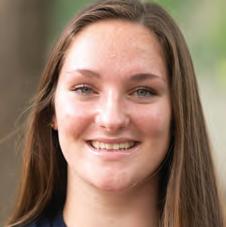
Makayla Bibby
University
of Virginia
HOMETOWN: Roanoke, Virginia
Bibby hopes an understanding of law will build on her interests in policy and government.
Cheyenne Butler
University of Virginia
HOMETOWN: Houston, Texas
Butler aims to use a law degree to promote and protect the welfare of women and children internationally and domestically.
Carson Livingston Cross
Lees-McRae College
HOMETOWN: Columbus, Ohio
Cross said his grandfather encouraged him to use his gifts to help “people like us, the working class.”
Tamyah Johnson
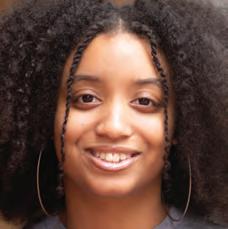
North Carolina Agricultural and Technical State University
HOMETOWN: Anderson, South Carolina
Johnson, who danced ballet and played the violin for eight years, said her family and her faith are inspirations.
Alan Macias
University of Virginia
HOMETOWN: Dallas
Macias served in the U.S. Navy for five years before attending UVA. “I value that experience a lot because it reinforced my passion for public service,” he said.
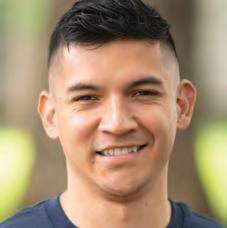
Samantha Navarro
Christopher Newport University
HOMETOWNS: Hampton, Virginia, AND La Ceiba, Honduras Navarro said growing up in Honduras, “where corrup tion prevails and justice is overlooked,” made her realize the importance of a fair legal system.
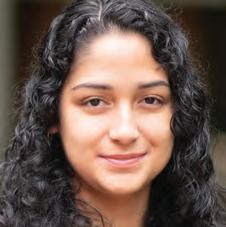
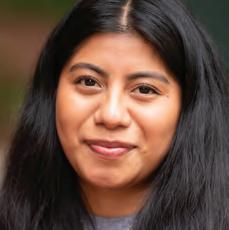
Dianey Navor
University of California, Los Angeles

HOMETOWN: La Puente, California
Navor noted that the number of first-gen, low-income Latinas in law is “very small, so I wanted to ensure that I was seeking opportunities that would support me in the process of applying to law school.”
Blessing Roland-Magaji
Scripps College
HOMETOWN: Arlington, Texas Roland-Magaji, who was an Irish dancer for years in Ireland, was inspired to study law after volunteering at a hospital and observing obstacles people face in the medical system.
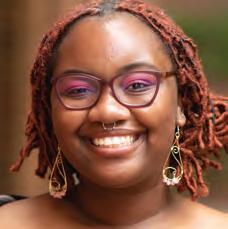
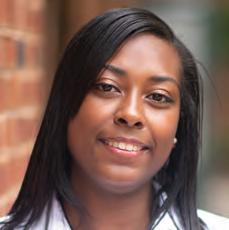
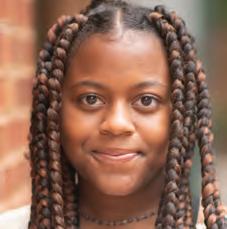
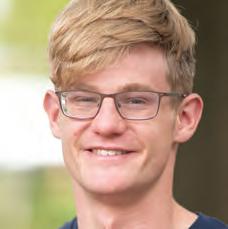
Diane Pfeifer
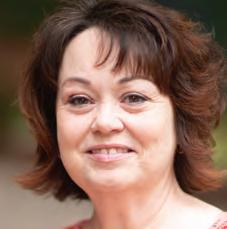
University of North Carolina, Pembroke
HOMETOWN: Tooele, Utah (NOW LIVING IN North Carolina) Pfeifer is a mother to four and a grandmother to five. She worked in Utah’s state government before going to college. Her own grandmother inspired her career aspirations.
Kayla Richardson
Hollins University
HOMETOWN: Little Rock, Arkansas
Richardson said she wants to give back to her family one day. “I'm interested in becoming a lawyer because I want to repre sent the underrepresented and I recognize that I need to be the change that I want to see,” she said.
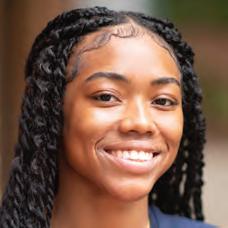
Jonah Vazquez
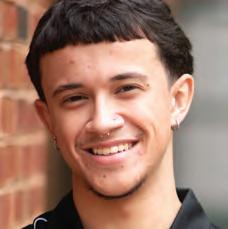
Vanderbilt University
HOMETOWN: New York City
“I’ve gotten so close to a lot of my fellow Roadmap Scholars and I wholeheartedly wouldn’t have chosen to spend this summer any other way,” Vazquez said.
PHOTOS BY JESÚS PINO
Fall 2022 | U VA LAWYER 41
not just by the difficulty of the reading. In that first late night at Bond House, they were also pleasantly surprised to find themselves in a group of mutually supportive, humble highachievers who could disagree without being disagreeable.
One student, Aspen Andersson, broke the tension in the room by drawing out the fact that they were all confused and coming at the case from different lived experiences. They then spent hours sharing their different understandings of the facts of the case, the legal reasoning behind the holding, and what the difference between “equality” and “equity” has meant in their own lives.
“I come from a long line of educators, so I knew that was something I wanted to study,” Andersson said. “But I did not know that we don’t have a federal right to education—that was the most surprising thing to me.”
Guest speakers exposed the students to an even wider variety of experiences outside of academia. Chris Kavanaugh ’06 spoke about his work as the U.S. attorney for the Western District of Virginia, including his experience prosecuting participants in the Aug. 12 Unite the Right violence and the Jan. 6 insurrection.
Cleveland and Jefferson also took the g roup to Washing ton, D.C., to show them the seat of government and introduce them to another alumnus, Joe Charlet ’18, a Senate Judi
ciary Committee staffer who talked to them at the Hart Senate Office Building.
Kavanaugh was a first-generation college and law school graduate, and Charlet, similar to Vazquez, was an emanci pated minor.
Students were in awe of the D.C. and Charlottesville scenery, impressed by the accomplishments of their professors and guest speakers, and surprised by how much they liked areas of the law they had never encountered. (They were exposed to 14 different substantive law topics in addition to legal process, legal reasoning, and legal research and writing.)
“Constitutional law has never been an area of law that I’ve even thought about, bankruptcy and contracts even less so,” said Makayla Bibby, a Roanoke native studying at UVA’s Frank J. Batten School of Leadership and Public Policy. “I had some reservations when I heard the word ‘tax,’ but every time I got the schedule for the next week, I was excited to learn new things and to see the extent of the law.”
An important goal of the program is to “close the gap” between students’ vague ideas about law school and the legal profession and the reality of law school and careers in the law, the team said.

THE NEXT STEPS FOR THE SCHOLARS WILL BE TO STAY CONNECTED
with their peers and the mentors UVA Law is providing, prepare for the LSAT with a subsidy to cover all costs and start their law school applications.

THE WORKING GROUP’S PIPELINE RESEARCH suggested that long term peer connection is part of the formula for success, as demonstrated by the 23-year track record of the Posse Founda tion, which grooms first-generation, low-income high school students for college success, places them in “posses” that will attend the same college together and provides them with full scholarships.
Robert Byron ’76, a Jefferson Trust board member, is also a member of the Posse Foundation’s board of directors. Byron has endowed a UVA Law scholarship for Posse alumni, and four students have already benefited from his generosity, in cluding three from the class of 2020 and a current third-year student. (Of the 2020 Posse lawyers, two are at AmLaw 50 firms and one is clerking on the U.S. Ninth Circuit.)
Three Roadmap Scholars, including Vazquez, are in an undergraduate Posse cohort and brought the program’s sense of community with them this summer.
“The way [Posse] thinks about the importance of peer con nections and support to success in pipeline programs has definitely been influential for me,” Goluboff said. “That sense of community is one we value across everything we do at the Law School, and we wanted it to be an integral part of the Roadmap Initiative. Our goal really is for all of the Roadmap Scholars—both within a given cohort and across cohorts—to think of themselves as connected to one another, as well as to us at the Law School.”
UVA welcomed its first undergraduate Posse cohort—a group of 10 from Houston—in the fall of 2014 and has contin
42 U VA LAWYER | Fall 2022
❱
From left, Dean Risa Goluboff, Professor Kimberly Jenkins Robinson, Professors Bobbie Spellman and Frederick Schauer, and Assistant Dean Mark C. Jefferson work with Roadmap Scholars.
ued to admit a Houston cohort every year since. The school has also added cohorts for veterans and Virginia students, and roughly 55 Posse Scholars have graduated from UVA, accord ing to David Sauerwein, the school’s assistant dean of students and its Posse liaison.
Roadmap Scholar Cheyenne Butler is a third-year student in the College of Arts & Sciences who came to UVA in a Posse Houston cohort. She was at tracted to the Roadmap Initiative specifically because the structure reminded her of Posse.
How
“As a Posse Scholar, I un derstand the value of com munity when it comes to having access to support in and out of the class room,” Butler said.
That Posse culture blossomed during the late nights at Bond House, according to Vazquez. “Half of us were in there, and we took a little study break and everyone was singing along together as back ground noise, and then Makayla, Tamyah and Blessing started harmoniz ing,” Vazquez said. “Afterwards, we talked and we were all like, ‘I’m really going to miss you guys, you know?’”
The cost for each cohort of Roadmap Scholars is $250,000. Denison’s gift and the Jefferson Trust grant provided enough seed funding to run the program for two years, Goluboff said. Other alumni have also expressed interest in supporting the initiative, Martin said, and there is already at least one UVA Law scholarship that will give preference to graduates of the program.
Next summer, a new cohort of scholars will arrive, and the original cohort will return to UVA Law as peer mentors and

for a “boot camp” that will help them finish their applications and prepare for the internships the program arranged for them. The rest of the summer will be spent working in the paid in ternships.
“These are amazing students who we want to invest in, both for our own law school and for the legal profession as a whole,” Goluboff said. “We think our community and the law itself is enhanced when people with very different kinds of personal experiences and backgrounds become lawyers. And we want to make sure we are contributing to enhancing access to the legal profession in the United States.”
While the Roadmap Ini tiative focused on just 12 promising students, the team behind it hopes that more law schools will create similarly transforma tional programs.



“Replication is one of the goals,” Cleveland said.
“Because the program is so resourceintensive and individualized, we have started with a fairly small cohort. But if every other top law school had a similar program, that would be another 200 or so tal ented lawyers added to the profession every year.”
All 12 inaugural scholars expressed a desire to make change through the law and pay forward the remarkable opportunity they received from the Roadmap Scholars Initiative in their communities.
“I’ve surrounded myself with a lot of people who are just as passionate and determined as I am, and that really inspires me and makes me feel validated,” Andersson said about the program. “I think it’s easy to feel small, but a lot of the people here make me feel big They make me feel like together, we
do it and together we can make that change.”
Fall 2022 | U VA LAWYER 43
can
PHOTOS BY JESÚS
PINO AND MARY WOOD
To Get Involved In addition to providing financial support for the program, alumni can SUPPORT THE ROADMAP SCHOLARS INITIATIVE by hosting them in summer legal internships and by serving as mentors to scholars. • If you or your employer are interested in hosting a scholar for a four- to six-week internship, or if you are interested in being a mentor: CONTACT Assistant Dean for Diversity, Equity and Belonging Mark C. Jefferson: roadmap@law.virginia.edu • If you are interested in financially supporting the roadmap scholars initiative: CONTACT Kate Martin at 434-238-6390 martin@law.virginia.edu

ALEX FINE
PRIDE TAKING
The year was 1976, and he was working as a medical records transcriber at the University of Virginia Hospital, playing softball every chance he got and living in a commune south of Batesville.
HIS LIFE WAS A GOOD ONE, he said, but “I was tired of feeling like all I had to contribute to gay rights was five bucks for the American Civil Liberties Union and an occasional wellworded letter to the editor,” Schwartz recalled.
So Schwartz decided to become a lawyer and entered U VA Law a few months after a Newport News native named Clarence Cain g raduated. They never met, but both of their lives would go on to affect the experiences of thousands of LGBTQ law students and lawyers, with ripples arguably touching millions of Americans.
The Early Days
IN THOSE EARLY FALL DAYS on the softball diamond and at “Café du Nord,” as they called the North Grounds eatery, Schwartz made a decision that was simple, elegant and impactful: He would just be himself.
“I didn’t walk around wearing a gay T-shirt or anything, but my rule of thumb was ‘tell no lies,’” he said. “If you ask
me a direct question, you’re going to get a straight answer.”
Schwartz chuckled at the double meaning. He knew his conversational style is the only straight thing about him.
He knew he couldn’t be the only queer law student at U VA but, in the absence of an organized student g roup, it wasn’t exactly easy to pick out his fellow “friends of Dorothy,” a coded moniker that closeted gay people used then—and sometimes now—to signal their kinship.
For fellowship, Schwartz turned instead to the under graduate Gay Student Union, which would occasionally throw a dance or a party that was open to the Charlottesville community. During his second year, the group nearly folded because its president had embezzled the entire contents of its coffers to pay his tuition after his parents cut him off when he came out.
Schwartz tapped a nother gay law student, John M Curtin ’81, and together they rescued the GSU by throwing a popular $3 dance every weekend to pay off the organiza tion’s existing debt.
Under Schwartz and Curtin, the g roup also extended a speaking invitation to a personal hero, gay rights activist Frank Kameny, who just a few years earlier had convinced the A merican Psychiatric Association to stop classifying homosexuality as a mental disorder.
Fall 2022 | U VA LAWYER 45
It all started because Bob Schwartz was done with the status quo.
By Melissa Castro Wyatt
Kameny had lost his job and his national security clear ance in 1957 for being gay, and he spent the rest of his life denouncing the evils of the closet. Like Kameny, Schwartz believed visibility was the “key to everything,” from secur ing basic civil rights to eventual marriage equality.
To that end, Schwartz, Curtin and GSU members took a bucket of bright orange paint out to the Beta Bridge and furtively painted their favorite o f t he “ Good O ld lyrics: “ We come from irginia, where all is bright GAY!”
“Fraternities were out there 30 minutes, painting verything we had done,” Schwartz said.
Although his grades got him aw Review, Schwartz dropped off to focus on courting oung man named R ichard Robinson. At one Law School
party, Schwartz a nd Robinson showed up in costume— Schwartz as a wizard, Robinson an Arabian princess. Robin son also accompanied Schwartz to summer associate events at his Big Law firm in Los Angeles. For better or worse, the firm did not extend Schwartz a permanent job offer at the end of the summer—an experience that was all too common for gay and lesbian law students who peeked out of the closet in those days—and Schwartz instead went to work as a staff attorney at the Tidewater Legal Aid Society after g raduation. Within a few years, he moved to Atlanta to be with Robinson, join a gay softball league and launch his own small law firm with a gay colleague.
Schwartz has no regrets about choosing visibility over his career.
“I was 28 years old—I felt like I had lost a decade of my life—and I wanted to pave the way for the next generation of gay kids so they wouldn’t lose so many years of their lives,” Schwartz said. “I was part of the Class of 1980, but the Class of 1982 got to know me as an out gay man on the softball field, and the Class of 1984 got to know them. These things add up over time.”

The Founding of GALLSA
RICHARD AVIDON WAS A MEMBER
Class of 1984. He and his Michael Allen ’85—two cisgender, straight white men, all of the protection and privilege t hat affords—were concerned about the climate ut gay people at the Law School in the mid-1980s, at a when national figures like Falwell a nd William Bradford R eynolds w ere invited to g rounds to share that were not friendly to LGBTQ community.

a legal a nd political matter, each step of progress toward civil r ights on t he national stage was being met
By 1984, 170 Fortune 500 companies had pledged not to discriminate on the basis of sexual orientation—but neither the American Bar Association nor the Law School had yet taken that stand. Only Wisconsin had a state statute banning such discrimination in housing, employment and public accommodations. California had passed a similar law, but the governor vetoed it.
Between 1970 and 1984, around 27 states decriminalized sodomy. Yet in 1982, Atlanta police officers charged Michael Hardwick, a gay man, with violating Georgia’s anti-sodomy law in his own home. Hardwick decided to—quite literally— make a federal case out of it.
Moreover, the HIV/AIDS was just beginning to u Among the millions of lives would claim, the disease kill Clarence Cain a nd Curtin, plus t wo of Schwartz’s Law School classmates, h ness partner a nd “well hundred” members of h lanta Softball League.

In February of 1984, Avidon Allen saw a notice in the V Law Weekly announcing the meeting of the Gay and Lesbian Law Students Association, would serve as “a support rights advocacy group.” To this they don’t know who placed notice, but they showed up meeting and became the informal heads of GALLSA. To con solidarity, Allen often w yellow button saying: “How You Presume I’m Straight.”
“These were pretty fr times,” Allen said. “Our [ally] ism was a way of saying, not alone.’ There were people who felt marginalized because of their race, ethnicity sexual orientation, gender tity or political views. And

46 U VA LAWYER | Fall 2022
BOB SCHWARTZ ’80
JOHN CURTIN ’81
MICHAEL ALLEN ’85
all band together, we were going to sink individually.”
ddition to the t ypical pot and small social events, the also circulated petitions to advocate for changes at the Law School, and hosted speakers, in cluding Dan Bradley, a Jimmy appointee who resigned as president of the federally spon Legal Services Corporation oming out. (Bradley’s 1984 speech at U VA, as memorialized Virginia Law Weekly, pro the contemporaneous sta cited above. But he a lso predicted that day that, “In my lifetime, we a re going to see all discriminating against gay people f all by t he wayside.”
Bradley died of AIDS four years later.)
By April, a GALLSA petition won the students explicit assurance from the faculty that applicants would not be discriminated against on the basis of sexual orientation, and Dean Richard Merrill added a non-discrimination statement to applications and informational materials.
“We looked at the top 10 law schools at that point, and five or six of them had stated such a nondiscrimination policy,” Avidon said. “So we started a petition and sat at a desk to have people sign it. We basically played off people’s desire to be in the top 10—let’s do what they’re doing.”

First-year student Ken Williams sat at some of those tables, attended the potlucks and took over as GALLSA president in 1986. He put that position on his resume.
Under Williams, the g roup had about 20 members, which included Darden g raduate business students and closeted members. During Gay Awareness Week in 1986, Williams told the Virginia Law Weekly that an interviewer called a friend of his to ask whether Williams was gay. He received no offer from that firm.

A Rocky Legal Landscape
MEANWHILE, THE LEGAL OUTLOOK for gay rights at the time was grim. In the spring of Williams’ third year at UVA Law, the Supreme Court heard oral arguments in Michael Hardwick’s case The de cision in Bowers v. Hardwick would deal a body-blow to the gay com munity, holding that there was “no fundamental right to engage in homosexual sodomy”—steering question presented away from Hardwick’s broader right to privacy, not to mention the chilling effect the law had on the right of heterosexuals to engage in private acts that could be construed as sodomy.
Justice Lewis F. Powell Jr. cast the deciding vote in Bowers; in fact, Powell reversed the initial vote he had cast in confer ence. Powell reportedly said, in a private conference with the justices, that he had never met a homosexual.
Professor Dan Ortiz, a gay Powell clerk in the term before Bowers, contends Powell was probably attempting to politely steer away from a touchy subject.
In fact, Joyce Murdoch and Deb Price, authors of “Court ing Justice,” found that Powell had hired one or more gay clerks for six consecutive terms in the 1980s, including Ortiz, who joined the U VA Law faculty after his clerkship and currently runs the school’s Supreme Court Litigation Clinic. Ortiz was not out to Powell.
In his biography of Powell, Professor and former Dean John C. Jeffries Jr. ’73, another Powell clerk, wrote that Powell, in not sticking with his initial vote, “failed to act on his own best judgment” due to a lack of confidence on the issue.
Professor A nne Coughlin, who has advised GALLSA’s successor organizations since she arrived at the Law School in 1995, was a Powell clerk during Bowers. While she calls the Bowers fallout “incredibly painful,” she faults no one for remaining in the closet at that time. (She, like Ortiz, also doubts it would have made a difference.)
“It’s absolutely wonderful for me to hear our students or gay folks express wonderment that people were closeted, but it was not a safe world for [ gay] people, professionally, culturally, emotionally,” Coughlin said. “I mean, coming out in that world could be terribly dangerous—particularly in the South.”

Coming Out in the 1990s
BY 1990, FIRST-YEAR LAW STUDENT Donna L. Wilson was willing to take her chances on coming out, at least after letting classmates get to know her first.
“I was really lucky, and any lack of acceptance I felt was more external to U VA and just because of the world we were inhabiting at the time,” Wilson said.
In that world, Clarence Cain ’77 had contracted HIV and was fired by his legal services firm in 1987 after he was hospitalized for AIDS-related pneumonia. He won his own federal lawsuit based on Pennsylvania’s state disability law, including punitive damages. But he died in penury in his mother’s Newport News apartment, t wo months after winning his case in 1990. His story would help inspire the film “Philadelphia,” starring Tom Hanks, who won an Oscar in his role as the plaintiff, and Denzel Washington.
“That world” was the one in which Colorado voters would ultimately approve Amendment 2, which prohibited cities

Fall 2022 | U VA LAWYER 47
KEN
WILLIAMS ’86 CLARENCE CAIN ’77
and the state from offering LGBTQ Coloradans any protec tions from discrimination in any forum. It was also a world in which the “don’t ask, don’t tell” ban on out military ser vicemembers would soon become law.
“That world” was a terrible legal job market to boot, Wilson noted.
Wilson’s friend Michael Tate ’92 served as president of GALLSA while Wilson was vice president. Both were on Law Review, and Wilson’s student note topic addressed the anti-gay policy of the Boy Scouts of America.
Despite her academic achievements, Wilson was told by one major law firm that she “would be more comfortable somewhere else.” (Wilson needn’t worry. Skadden Arps, where she had worked as a paralegal, gladly took her aboard as an associate.)
Yet when Wilson came out to her Law School softball teammates her first year, they were seemingly unfazed. With one exception: “If you’re a lesbian, why aren’t you a better softball player?” they joked.
A Breakthrough Case
BY THE SPRING OF 1997, GALLSA had changed its name to BGALLSA to include bisexual students. The concerns of transgender students were not yet f ully part of the student organization’s vision. The g roup had about 15 members, according to its then-co-president, Susan Baker ’98, none of whom were straight allies like Avidon and Allen had been. (Gary Gansle ’98 was also co-president with Baker, as well as president of his first-year class.)


The year before, a 6-3 majority of the U.S. Supreme Court in Romer v. Evans had eviscerated the Colorado anti-gay amend ment, with Justice Anthony Kennedy writing that “the Con stitution ‘neither knows nor tolerates classes among citizens.’”
However, the Bowers decision on sodomy laws and the military ban still stood. Moreover, the federal Defense of Marriage Act passed Congress in 1996, barring federal rec ognition of same-sex marriages.
BGALLSA helped host events and speakers, such as Mi chelle Benecke, co-founder of Servicemembers Legal Defense Network. Future Solicitor General Ted Olson and UVA Law professor Mary Anne Case debated whether the Virginia Military Institute should continue to receive state f unding in light of its single-sex education model. Legal scholar Michael Seidman visited as a Hardy Cross Dillard lecturer to offer his interpretation of the Romer decision.
The g roup hosted a pizza party and movie night for Na tional Coming Out Day. With a wink at the topic, if you wanted to attend, you needed to find the group’s bake sale table and ask for the event’s secret location.
Baker became Susan Baker Manning after marrying her lifelong partner, Katharine Manning ’00, who was two years behind her at the school and a fellow member of BGALLSA. Full legal marriage seemed to be not even a remote possibil ity at the time.
“I did not think that same-sex marriage was likely any time soon,” Manning said. “But we would have had kids no matter
what the government had to say about our relationship.”
In a quirk of history, 2004, when San Francisco marriage licenses to couples while a court intervene for nearly a
The backlash was and f urious. Barely passed since the Supreme had overturned its own cision through Lawrence v. Texas Now, a month after move, t he California Court halted the San weddings and later nullified marriages, including Manning nuptials.
California voters then constitutional amendment ning same-sex marriage in the same election in voted overwhelmingly nation’s first Black president.
Manning happened in the front row of the Supreme Court on June 26, 2015, one of the last days of the term in which the issue of state same-sex marriage bans came before t he court via Obergefell v. Hodges, for which Kennedy was widely expected to be the deciding vote. Clerks were shuffling around and there was a palpable buzz in the courtroom. (One of Kennedy’s clerks at the time was a U VA Law g raduate, Andrew Bentz ’12.)
In her pro bono work at Morgan Lewis, Manning coordinated the business community’s efforts to file amicus briefs in the consolidated case. As she had g uessed, it turned out to be the day the decision was announced.
“And then Justice Kennedy starts to read the opinion of the Court,” she said.
The cases now before the Court involve other petitioners as well, each with their own experiences. Their stories reveal that they seek not to denigrate marriage but rather to live their lives, or honor their spouses’ memory, joined by its bond.
The ancient origins of marriage confirm its centrality, but it has not stood in isolation from developments in law and society. The history of marriage is one of both continuity and change. That institution—even as confined to opposite-sex relations—has evolved over time.
“Half of the room starts to cry,” Manning said. “This is not your most professional-feeling moment, but there are all
48 U VA LAWYER | Fall 2022
SUSAN BAKER MANNING ’98
these people t here t hat have worked for decades on LGBTQ and on marriage in particu lar—people who a re incredibly invested in it, people whose hu is being affirmed by the Supreme Court of t he United States—and there are just a lot of and tears quietly rolling faces.” walked out of the monu mental bronze doors of t he Supreme Court and stood at the the marble steps, which kept clear by security. “There’s this sea of people a nd nd rainbow flags and ev erything else down on the lower a nd spilling out into t he anning said. “It was a life and career highlight to see all of that and to experience that rush joy and relief and validation.”
Lambda Expands
BGALLSA CHANGED ITS NAME to Lambda Law Alliance around 2001, according to the Virginia Law Weekly archives. It is no longer difficult to find evidence of the g roup’s existence or its activities. A search for “Lambda” in the Law Library’s database retrieves 102 results.
The g roup’s executive board alone comprises 14 students and the g roup as a whole boasts more than 100 members, including straight allies, according to Chloe Fife ’22, the first openly transgender woman to serve as president.
Ten of Fife’s classmates at U VA lso self-identify as trans, she lthough not all of them do ublicly. Even on the LGB side edger, she said, “ We still least 10 to 12 people come every year.”
Lambda executive board manages t he g roup’s t hreepronged mission, which includes ocial, community-building element; a n advocacy a nd pro lement; and a career devel opment program, Fife said. advocacy and pro bono has included pushing for unisex bathrooms at the Law raising money to oppose tate-level anti-trans bills that up around the country, and helping local residents change their legal name and gender. Virtually all members of today’s Lambda list the organization
on their resume, in part to filter out any employers or judges that would not be a good fit, according to Fife and Ruth Payne ’02, the Law School’s senior director of judicial clerkships.
In June 2020, in Bostock v. Clayton County, t he U.S. Supreme Court ruled 6-3 that employment discrimination against LGBTQ people is impermissible sex discrimination. Lambda’s own career fair attracts about 20 employers each year, Fife said.
As for the parties? “Hundreds of people show up,” Fife said. “Lambda is definitely known for its ability to throw a good party.”
Postscript

BOB SCHWARTZ, who went by “elmo” or “e.t. pelmo” in law school, was inducted into a gay softball Hall of Fame in 2005. He now practices bankruptcy law. Schwartz’s partner, Richard Robinson, died in 1996.

RICHARD AVIDON teaches U.S. history at the Georgetown Day School, while MICHAEL ALLEN is a partner at the civil rights firm Relman Colfax. He has prosecuted at least three key LGBTQ civil rights cases, including Whitaker v. Kenosha Unified School District No. 1, a 2016 Seventh Circuit case holding that Title IX and the 14th Amendment protect trans gender students from discrimination at school.
Turned away from Big Law, KEN WILLIAMS went to work as a prosecutor in the New Orleans district attorney’s office and now teaches criminal law at the South Texas College of Law Houston.
DONNA WILSON is the CEO and managing partner of Manatt, Phelps & Phillips in Los Angeles. To her knowledge, she is one of two openly gay female managing partners of major U.S. law firms. She says, “I tell associates all the time, the two best pieces of advice are, be curious and be yourself.”
CHLOE FIFE is working at Weil, Gotshal & Manges, where she will practice securities litigation once she is admitted to the New York bar. She will be the only openly trans associate at the firm, but not the first to have worked at Weil.
SUSAN BAKER MANNING is a partner and the full-time pro bono trial attorney at Morgan Lewis. She coordinated the business community’s efforts to file amicus briefs in Obergefell v. Hodges, which struck down all same-sex marriage bans. The Mannings have three children. Their son, Elliott, is transgender.
“I think it’s got to help on some level that he has queer parents and that there’s a model there for resiliency and affirmatively taking on these issues to try to make the world a little better place around them,” she said. “They understand that you can fight against discrimination, you can achieve things and movements can achieve things over time.”

Fall 2022 | U VA LAWYER 49
CHLOE FIFE ’22
MICHAEL
TATE ’92
TRIPLE POSITIVE


TIFFANY DANG
Breast Cancer, Backgrounds and Big Ten Bond Two ’03 Alumnae


 By Marian Anderfuren
By Marian Anderfuren
University of Virginia Law School as first-year students, they felt an immediate connection, both with UVA and with each other.
THEY WERE FROM THE MIDWEST and the same age. Both had come straight to law school after g raduating from Big Ten universities. Both were assigned to the same section.
And both were drawn to UVA because it felt different from the other law schools they had visited.
“I applied to over 20 law schools,” Hartmann said. “When I started doing visits, I noticed that there was only one school where the students loved being there a nd didn’t want to graduate.”
Brown had a similar reaction. “I remember stepping off the van from the airport. I looked at the g irl next to me and said, ‘I can go to school here?’ The students were so friendly.
They weren’t wishing they had gotten in somewhere else.”
Both went on to public service careers, Hartmann in the Cook County state’s attorney’s office in Chicago for 13 years and Brown with the U.S. Department of Homeland Security in Washington, D.C., where she still works.
A decade and a half later, they had something else in common: Brown and Hartmann were each diagnosed with triple-pos itive invasive ductal carcinoma.
Though they had kept in touch sporadically since g radu ating, Brown credits their law school bond with helping her through diagnosis, treatment and recovery from her trying experience.
Fall 2022 | U VA LAWYER 51
When REBECCA “BECKY” BROWN ’03 and MELISSA MEANA (now HARTMANN) ’03 met at the
❱ Becky Brown and Melissa Meana Hartmann, pictured during their UVA Law days.
INVASIVE DUCTAL CARCINOMA is the most com mon breast cancer, accounting for eight out of ev ery 10 diagnoses. It starts in the milk ducts and spreads to surrounding tissues and lymph nodes but, when detect ed and treated early, has a high survival rate.
About 10% of breast cancers are thought to be triple-positive. Normal cells contain estrogen, proges terone a nd human epidural growth factor receptors. Tri ple-positive breast cancer means t hat a t umor is feeding off receptors of all three.
A pproximately 4% of t he estimated 268,600 U.S. women diagnosed with inva sive breast cancer in 2019 were under age 40, according t o t he American Cancer Society. Hartmann was diagnosed at 39 in 2018. “I had searing breast pain that occurred two three times. I subsequently found lump in the same breast,” she said. A mammogram confirmed my worst fears.”
She had moved with her husband and two young children from Chicago to Dallas a year and a half earlier. Hart mann’s treatment at the University of Texas-Southwestern Medical Center included six rounds of chemotherapy and a year of immunotherapy, a double mastectomy, radiation and reconstruction.
Hartmann was very open about her diagnosis and treat ment. She shared regular updates on Facebook and Instagram. “Being diagnosed at 39 was alarming,” she said. “I wanted to share my experience in order to encourage other people to be proactive in their self-care.”
easier. “One of the hardest parts of going through breast cancer diagnosis and treatment is articulating how you are really feeling—physically and emotionally. Having a trusted mentor you can lean on is priceless.”
BROWN WAS DIAGNOSED a year later at Georgetown University Hospital. “I was already in the care of a medical oncologist because I had developed a few benign cysts over the years, so they wanted to keep a close eye on me. I had been getting mammograms since I was 34,” she said.
She h ad a c lean checkup before her 40th birthday, but six months later, “cancer had a lready left t he original t umor site a nd made it to my local, a xil lary lymph nodes.”
While Hartmann had been on social media about her journey, Brown was reticent. “ When I got diagnosed, I didn’t want to talk about it with anybody,” she said. “I didn’t know anyone my age who had had breast cancer.”
Recalling Hartmann’s Facebook posts about her cancer journey, Brown reached out to her. “That first four to six weeks after you are diagnosed is so hard, not knowing what your treatment is, having second a nd third tests a nd CT scans,” Brown said.
“Melissa was so open with me, and so good at detailing what she went through and what to expect. She told me about the different chemotherapy medicines, surgery, reconstruction and radiation, and what I could expect. She sent me a very
Though she had moved on from her position in the state’s attorney’s office in Chicago, the woman who replaced her— who was the same age and had been diagnosed a year earlier— provided valuable information, insight and support.

“She was my mentor through my rollercoaster ride of breast cancer diagnosis and treatment,” Hartmann said.
Cancer patients, she said, are good at sharing tips and tricks they’ve figured out on their own to make the journey a little
comprehensive breast cancer book when I was diagnosed, and later a body pillow to use after surgery,” Brown said.
Like Hartmann, Brown underwent chemotherapy and immunotherapy, a double mastectomy and reconstruction, and radiation.
THE

LAW
helped the women
remember stepping off the van from the airport," Brown said. “I looked at the girl next to me and said, ‘I can go to school here?’ The students were so friendly. They weren’t wishing they had gotten in somewhere else.”
UVA
EXPERIENCE
in another way, too. “The legal research and writing skills acquired while at “I
❱ Becky Brown '03
UVA were in strumental in under standing our diagnosis, treatment options, and ultimately feeling well-informed about our paths to survival,” Hartmann said.
Brown elaborated, “One of our professors told us that you know you’ve a rrived on the a nswer when your research starts looking the same. That’s how I felt about my cancer work-up and treatment plan. I had a ton of irons in the fire, and then it all circled up and my strategy solidified.”
As they learned in law s second opinions are important. “There’s a lways a nother point of view—and every one thinks they’re right,” Brown said.
Obtaining second opinions a t e very stage was critical to Brown’s care. “I was able to take the best ideas from each phy sician and improve my own treatment plan.”
H artmann’s open ness and generosity also harken back to her firstyear e xperience at U VA Law. Because of a back injury, she m issed a month of right a fter spring break of her f irst year. She feared she would have to drop out.
“I had three herniated discs in my back and had to fly home to Chicago to see doctors a nd receive treatment,” Hartmann said. “ When I returned to finish the semester, fellow Section I classmates shared all their notes with me. I missed the end-of-the-year moot court competition so the professors created one just for me. I was able to finish my first year and had back surgery that summer.”
“All of the support I received at U VA was so generous—it was amazing,” Hartmann said.
TODAY, BOTH HAVE EXCELLENT PROGNOSES and entrepreneurial aspirations. Brown is renovating a house in Northwest D.C. near the National Zoo and running a side gig Her company, Federalisms, creates “inside humor” greeting cards and gifts designed especially for federal employees and contractors.
Hartmann works w ith h er husband, Bradley, at their Dallas-area business, Ha rt mann & Co. Their consulting a nd training firm helps the construction indus try overcome language and cultural barriers and provides sales and leadership training umber and building materials industry.

Hartmann and Brown stress it’s incredibly important for women—and men too— to perform breast selfexams regularly. Most younger women who are diagnosed with breast cancer found the lumps themselves.
“On the anniversary of my diagnosis every year, I a sk everyone I know to set up their checkups,” Ha rtmann said.
Brown advises even the healthiest of young adults to make sure they have a preven system and regular exams.
“You think you’re young and healthy and you don’t need it,” she said. “But having in place a care team that knows you is so critical—to find problems before they get worse and to help you navigate those prob lems immediately should they arise.”
Hartmann and Brown also continue to support each other and pay it forward to help other breast cancer patients on their journeys.
“Cancer is horrifying, but the people I’ve met and become closer to through the entire process have really been a silver lining on the worst cloud,” Brown said. “I would not have selected this path, but if I have to be on it, I see myself fol lowing Melissa and blazing the path for others.”

Fall 2022 | U VA LAWYER 53
“I applied to over 20 law schools,” Hartmann said.
“When I started doing visits, I noticed that there was only one school where the students loved being there and didn’t want to graduate.”
❱ Melissa Meana Hartmann '03
SIZING UP SUPREME COURT TERM
THE U.S. SUPREME COURT reshaped constitutional law regarding abortion, firearms and religious liberty during its most recent term, which ended June 30.

THE JUSTICES CITED
UVA
BECERRA v. EMPIRE HEALTH FOUNDATION
HOLDING: The court upheld a U.S. Department of Health and Human Services regulation that limits the additional compensation hospitals receive when they treat low-income patients.
PROFESSORS 12 TIMES: Saikrishna Prakash had four citations; Caleb Nelson had three; and John Harrison, Douglas Laycock, Frederick Schauer, Bobbie Spellman and Ann Woolhandler each had one citation.
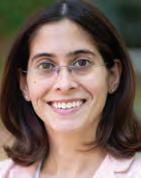
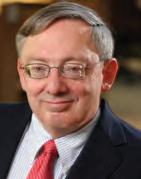
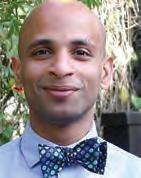
LAW
KENNEDY v. BREMERTON SCHOOL DISTRICT
HOLDING: A high school football coach who led prayers with students during and after school games was fired; he argued his prayers were protected speech. The court ruled the First Amendment protects individuals engaging in a personal religious ob servance from government reprisal
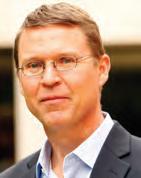
“[THE PRAYERS] WEREN’T QUIET and they weren’t isolated. They were leading the students in prayer, and to say that’s okay undermines all the school prayer cases.”
—DOUGLAS LAYCOCK (NPR)
MORGAN v. SUNDANCE INC.
HOLDING: An employee suing Sundance argued that the company’s delay in a complaint regard ing overtime pay constituted a waiver of its right to enforce an arbitration agreement under the Federal Arbitration Act. The justices ruled that federal courts may not adopt an arbitrationspecific rule conditioning a waiver of the right to arbitrate on a showing of prejudice.
“THE SUPREME COURT has signaled so strongly that it wants to remove obstacles to arbitration and make sure that arbitration agreements get enforced, and they’ve spoken very broadly about this ‘strong federal policy favoring arbitration.’ I think they can all be forgiven for thinking that the court really meant that.”
—RIP VERKERKE (LAW360)
“WHILE BILLIONS OF DOLLARS WERE AT STAKE , the case is more important for what it did not do. Court watchers were worried that the conservative majority would use this case to overturn the longstanding Chevron doctrine established by Chevron U.S.A. v. Natural Resources Defense Council Inc., the most-cited administrative law decision of all time. Chevron held that courts should defer to agencies when a statute is ambiguous. Conserva tive judges have long argued against deferring to agency experts. However, in this case, the majority and the dissent do not cite Chevron. They simply hold that the statute is not am biguous—even though they come to opposite conclusions. I suspect the liberal judges in the majority would have preferred to rely on Chevron but did not do so in order to attract Justices [Clarence] Thomas and [Amy Coney] Barrett [to the majority], both of whom have criticized Chevron.”
—CRAIG KONNOTH
CUMMINGS v. PREMIER REHAB KELLER
HOLDING: A legally blind and deaf woman was denied an American Sign Language interpreter by a physical therapist she was working with. The court held that Cummings could not recover emotional-distress damages for the violation of certain federal antidiscrimination laws.
“THERE IS SOME AMBIGUITY about whether Cummings indeed relied on wholly ‘implied’ causes of action, distinct from causes of action that Congress later ‘ratified.’ Nonetheless, Congress’ silence about the precise remedies avail able under the Rehabilitation Act and the ACA figured into the majority’s reasoning in addition to featuring in [Brett] Kavanaugh’s concurrence. [John] Roberts, writing for the majority, expressed the concern that Cummings’ position about the scope of remedies ‘risks arrogating legislative power.’”
—RACHEL BAYEFSKY
(SCOTUSBLOG)

IAN BRADSHAW
FACULTY DISCUSS KEY CASES FROM 2021 TERM the
DOBBS v. JACKSON WOMEN’S HEALTH ORGANIZATION
HOLDING: Following a challenge to Mississippi’s ban on abortions after 15 weeks, the court held the Constitution does not confer a right to abortion, overruling Roe v. Wade and Planned Parenthood of Southeastern Pennsylvania v. Casey.
“IT CREATES CONFUSION for anyone seeking abortion, friends and family members of those seeking an abor tion, and health care professionals seeking guidance on what kind of treatment they can provide—not just for abortion care—but for reproductive health care more generally.”
—NAOMI CAHN (THE HILL)
NEW YORK STATE RIFLE & PISTOL ASSOCIATION INC. v. BRUEN
HOLDING: New York’s requirement that applicants show proper cause for unrestricted concealedcarry gun licenses violates the 14th Amendment “by preventing law-abiding citizens with ordinary self-defense needs from exercising their Second Amendment right to keep and bear arms in public for self-defense.”
“THE OUTCOME OF BRUEN IS UNSURPRISING: ‘May issue’ permitting regimes can be prob lematic, and by contrast, the court made clear in its opinion that the more common ‘shall issue’ regimes are generally permissible. The real impact of this decision is the solely historyfocused methodology it prescribes. This will make the job of advocates and lower courts even more dif ficult as they try to make sense of an inconsistent and unclear historical record [on gun laws and rulings]. It also likely means that innovative new ways of addressing gun violence will be more difficult to support in the face of challenges.”
—SARAH SHALF ’01
FEDERAL ELECTION COMMISSION v. TED CRUZ FOR SENATE
HOLDING: Section 304 of the Bipartisan Campaign Reform Act of 2002, which limits the amount of post-election con tributions that may be used to repay a candidate who lends money to his own campaign, violates the First Amendment rights of candidates and campaigns.
“THESE CONTRIBUTIONS are espe cially likely to lead to corruption for two reasons. First, the contribution is used to repay the campaign’s debt to the candidate and thus the money ultimately goes into the candidate’s own pocket, unlike other campaign contributions. Second, because these contribu tions are made after the election, the donor knows, rather than merely hopes, that the candidate in a position to confer benefits. The opinion was also noteworthy for its blurring of the line between a contribution and an expenditure, emphasizing that the limit on repayment via contribu tion after the election will deter candidates from spending their own money on their campaigns.”
—DEBORAH HELLMAN

WEST VIRGINIA v. ENVIRONMENTAL PROTECTION AGENCY

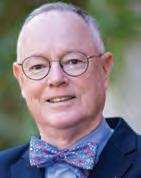
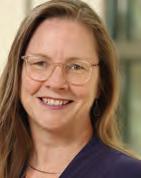
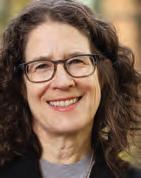
HOLDING: In the Clean Air Act, Congress did not grant the Environmental Protection Agency the authority to devise emissions caps based on the generation-shifting approach the agency took in the Clean Power Plan.
“IN WEST VIRGINIA V. EPA , the court ex plained that it is generally the job of Congress, not administrative agencies, to make major decisions about pressing economic and social questions. the absence of clear con gressional delegation of power, the court declined to find that Congress had authorized the EPA to adopt a sweeping regu latory scheme under the Clean Air Act. Today’s holding will be understood by many as a victory for the principles of separation of powers and the bounded authority of the administrative state.”
—JULIA MAHONEY
FBI v. FAZAGA
HOLDING: Attendees at an Islamic Center sued for discrimination, alleging that a surveil lance program targeted them because of their Muslim religious identity. The federal govern ment sought to dismiss the case under the state secrets privilege. The question that rose to the Supreme Court was whether Section 1806(f) of the Foreign Intelligence Surveil lance Act of 1978—which provides a proce dure for lower courts to consider the legality of electronic surveillance conducted under FISA and order forms of relief—displaces the state secrets privilege. The court said no, siding with the FBI.
“A UNANIMOUS SUPREME COURT ruled that the special procedure under the 1978 Foreign Intelligence Surveillance Act for determining the legality of elec tronic surveillance had no bearing on the state-secrets privilege, which entitles the government to withhold state and military secrets from judicial proceed ings. The privilege rests on threats to national security, not the legality of the collec tion. It reversed the Ninth Circuit, which had held that the government could not invoke the privilege with respect to electronic surveillance covered by the 1978 Act.”
—PAUL B. STEPHAN ’77
—Compiled by Mike Fox
Fall 2022 | U VA LAWYER 55
NEW WEBSITE CAPTURES HISTORY OF VIRGINIA LAW WOMEN
Fifty years in, Virginia Law Women—one of the first student affinity groups at UVA—is going back in time to recapture its lost history, particularly its evolution as a diverse organization.


WITH SUPPORT from the UVA Law Library’s Special Collections depart ment, the student organization’s executive board spent the 2021-22 academic year gathering oral history accounts from former V LW presidents to create a digital archive and online exhibit, “ VLW50,” which weaves a more complete account of the g roup’s presence at the Law School.
When Celeste Redmond-Smith ’85 ran for president of the orga nization in 1984, she said she sometimes struggled with the duality of representing the viewpoints of the mostly white V LW and the Black Law Students Association.
“I was part of a g roup of students with BLSA that were looking at applications being rejected—to kind of take a second look and make arguments for some of the students the administration had not con sidered,” Redmond-Smith said. “I was surprised with a sect of V LW feeling that [they] shouldn’t be in favor of affirmative action because then that dilutes all of us being here.”
The women’s organization was formed in October 1971, when a few of U VA Law’s then-small population of female students banded together to create a g roup to voice their concerns. To gether, they hoped to tackle sex discrimination in admissions, hiring and on-Grounds interviewing.

Elizabeth Trimble ’73 and Ellen Bass Brantley ’73, the first and second presidents of the organization, were interviewed for the project and added new details to the g roup’s founding moment. They remembered attending a women’s law conference at Duke University School of Law in 1971 and being inspired by the women there to start a women’s group.
“ When we went, we realized that although we hadn’t thought of having a women’s law student association, we were kind of behind the times,” Brantley said.
ONE GUEST SPEAKER THERE was a Rutgers law professor by the name of Ruth Bader Ginsburg. Ginsburg noted the percentage of women enrolled in law schools at the time, an observation that also piqued the interest of the U VA women in attendance. While the first-year class at Rutgers was 44% female, U VA’s was just 8.9%, according to a Virginia Law Weekly article about the conference.
The V LW women interviewed for the project discussed evolv ing goals over the years, from serving as a feminist voice (accord ing to Carolyn Ikari ’93), to providing a social and academic support network ( per Danit Tal ’15) to “advancing women socially, profes sionally and confidently in the legal profession” (in the words of Manal Cheema ’20).
“ VLW50” encapsulates the board’s most recent goal: to build up institutional knowledge and pass it along to f uture generations of women at Virginia Law, according to Sujaya Rajguru ’22.
Smith, seemed surprised by the alum’s recollection.
“How did that feel to have all of these women […] not stand with the Black community?” Roselló asked.
“Things were a lways open for discussion,” Redmond-Smith replied. “ Your time at a university should be a cherished time to work through a lot of these issues.”
In the past five years, VLW leadership has made deliberate strides to increase the diversity of the organization. For example, Kendall Burchard ’19, V LW president from 2018 to 2019, worked with her leadership board to establish criteria to determine which events hosted by other student organizations V LW would support. Those co-sponsorship factors g ive V LW a way to encourage other student groups to include women, particularly women of color, in their events.
Now 300 women strong, the organization is led by Brecken Petty ’24. Most recently, VLW persuaded the administration to supply the women’s and all-gender restrooms with free menstrual products.
“I am excited to see V LW become a more diverse organization and to be a part of that shift,” Petty said. “The executive board has prioritized programming events that speak to and celebrate all of our members—women of color, queer women, women of different ages and stages of life.”
The project can be accessed at: VLW50.law.virginia.edu
56 U VA LAWYER | Fall 2022
Wyatt
UVA LAW ARCHIVES/LAW SCHOOL FOUNDATION By Melissa Castro
CURRENT VLW MEMBERS were the primary interviewers collecting the oral histories, a process of discovery that they found both excit ing and surprising. Daniella Roselló ’23, who interviewed Redmond-
UVA LAW ARCHIVES
IN SEEKING TALES FROM ITS PAST, GROUP WORKS TOWARD A MORE DIVERSE FUTURE
VIRGINIA LAW WOMEN MEMBERS 1984-85
VIRGINIA LAW WOMEN EXECUTIVE BOARD 2021-22
STUDYING THE HIDDEN EFFECTS INCARCERATIONOF

ISTOCK
STEVENSON WINS GRANT TO STUDY HIDDEN EFFECTS OF INCARCERATION
Professor MEGAN STEVENSON and her team received a $200,000 grant from the Laura and John Arnold Foundation to study the hidden long-term effects of incarceration.
The two-year project will evaluate how incarceration impacts a wide range of personal and societal outcomes. The study, called “The Long Run Impacts of Incarceration: Evidence from a Regression Dis continuity Design,” will track long-term measures of economic well-being, such as educational attain ment, eviction rates, earnings, employment, subprime borrowing rates and credit access.
Stevenson, an economist and criminal justice scholar, said poor prison conditions in Virginia in spired the project.
“People are stacked in small cells way beyond capacity, facilities are without air con ditioning in hot summers, and without suffi cient heat in the winter. The violence can be rampant,” she said. “Most prisoners have vir tually no access to higher education or any other way to prepare themselves for life after release. We wanted to know what the longterm impacts of this experience are.”
The research team includes Yale University economics professor John Eric Humphries, University of Pennsylvania criminology pro fessor Aurélie Ouss and Harvard University economics professor Winnie van Dijk.
By unearthing the connections between in carceration, barriers to reentry and social ills, the team hopes to provide prosecutors, judges and lawmakers with a body of evidence that will help them make informed decisions, and rewrite laws and sentencing guidelines where appropriate.
Stevenson said the scholars came across a useful “natural experiment” to help isolate the causal impact of incarceration, adding that Virginia uses a scoring system to calculate the sentence recommended by sentencing guide lines. Defendants who score right above the threshold for a prison recommendation are much more likely to be sentenced to prison, she said, but are otherwise very similar to those who score right below.
Stevenson has conducted empirical research in various areas of criminal justice reform, including bail, algorithmic risk assessment, misdemeanors and juvenile justice. Her research on bail was cited extensively in a landmark federal civil rights decision, O’Donnell v. Harris County, which reformed the bail system in that part of Texas.
Arnold Ventures, which manages the giving for the Laura and John Arnold Foundation, focuses its philanthropy on issues in criminal justice, health, education and public finance, and is guided by evi dence-based policy, research and advocacy, according to the organization’s website.

58 U VA LAWYER | Fall 2022 FACULTY NEWS
—Mike Fox
KENNETH S. ABRAHAM published “What History Can Tell Us About the Future of Insurance and Litigation Law After COVID-19,” in the DePaul Law Review for its annual Clifford Symposium on Tort Law and Social Policy. He also spoke, along with G. EDWARD WHITE , about their paper, “Doctrinal Forks in the Road: The Hidden Message of ‘The Nature of the Judicial Process,’” at a conference at Yale Law School in March.
MICHAL BARZUZA pre sented at a Harvard Law School faculty work shop; Tel Aviv Univer sity’s Board Diversity Conference; a University of Chicago Law School retrospective on Frank H. Easterbrook and Daniel R. Fischel’s work regarding the economic structure of corporate law; an Oxford Business Law Workshop; law and economics workshops at Harvard Law School and Texas University Law School; and a regu lation and markets work shop at Boston College Law School. In August, she presented work with QUINN CURTIS at the 32nd annual American Law and Economics Asso ciation Meeting. MEGAN STEVENSON, who serves on the ALEA board of di rectors, also presented.
as the primary draft ers of the final report of Gov. Ralph Northam’s Commission to Examine Racial Ineq uity in Virginia. Clinic students also worked with five individual members of the Vir ginia General Assem bly to secure passage of four different pieces of legislation on topics in cluding literacy, social determinants of health and juvenile delin quency prevention. The Virginia Literacy Act comprehensively trans forms the way Virginia teaches reading to its youngest students. At the local level, students worked with the city of Charlottesville to de termine that the city had legal authority to expand its property tax exemption program. Block was also part of a grant to the University’s libraries to digitize all of Virginia’s Jim Crow laws for public access.
In the Spring, Z. PAYVAND AHDOUT published “Enforcement Lawmaking and Judicial Review” in the Harvard Law Review. She also presented her current project, “Separationof-Powers Avoidance,” at the University of California, Berkeley, Colloquium on Courts and Judicial Process, at the Rehnquist Center’s Constitutional Law Conference and at the annual Civil Procedure Workshop. She was recognized for her scholarship by the Yale Law Journal, which named Ahdout the journal’s inaugural Emerging Scholar of the Year (see p. 66). In June, she testified about state sovereign immunity before the House Judiciary Committee’s Subcommittee on the Constitution, Civil Rights and Civil Liberties.
RACHEL BAYEFSKY pub lished “Administrative Stays: Power and Pro cedure” in the Notre Dame Law Review as part of its Federal Courts symposium and “Order without Formalism” in the George Washington Law Review as part of its symposium on the legacy of Justice Ruth Bader Ginsburg. Her review of a book on human dignity is forthcoming from the Review of Politics.
Students in the State and Local Government Policy Clinic, headed by ANDREW BLOCK , served
RICHARD BONNIE ‘69 served as a co-reporter for the American Law Institute’s Restatement on Children and the Law, earning final ap proval for eight sections relating to children in the justice system. Six of the sections covered developmental con cepts and legal rules relating to the account ability of young people in delinquency pro ceedings as well as defenses based on im maturity in criminal prosecutions. He is cur rently trying to formu late the principles and rules governing trans fer of youth from juve nile court to criminal court. Columbia Law School professor ELIZA BETH SCOTT ’76 is chief reporter for the Re statement on Children and the Law.
Bonnie’s general interest in legal rules
BAMZAI ELECTED TO AMERICAN LAW INSTITUTE
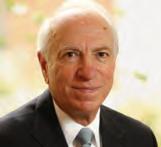
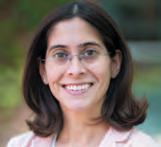
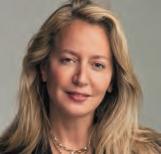
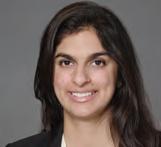
Professor ADITYA BAMZAI became a member of the American Law Institute, the organization announced July 25.

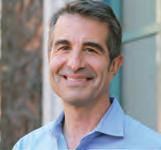
There are now 32 members of the UVA Law faculty currently affiliated with the institute, which produces scholarly work meant to update or otherwise improve the law. The organization includes judges, lawyers and law professors from the U.S. and around the world who are selected on the basis of “professional achievement and demonstrated interest in improving the law.”
Bamzai, who joined the Law School faculty in 2016, teaches and writes about administrative law, civil procedure, computer crime and conflicts of law. He is affiliated with the school’s Center for Criminal Justice, LawTech Center and National Security Law Center, and its programs in Constitutional Law and Legal History, and Public Policy and Regulation.
In 2018, Bamzai argued Ortiz v. U.S. before the U.S. Supreme Court as a rare independent amicus. The justices cited him by name 31 times in the case, which tackled the scope of the court’s original and appel late jurisdiction under Article III. He has also argued cases relating to the separation of powers and national security in the Foreign Intelligence Surveillance Court of Review, the D.C. Circuit and other federal courts of appeals.
Before teaching, Bamzai served as an attorney-ad viser in the Office of Legal Counsel of the U.S. Depart ment of Justice, and as an appellate attorney in both private practice and for the National Security Division of the Department of Justice.
He clerked for U.S. Supreme Court Justice Antonin Scalia and Judge Jeffrey Sutton of the U.S. Court of Appeals for the Sixth Circuit.

Bamzai received his undergraduate degree from Yale University and his law degree from the University of Chicago Law School, where he was the editor-inchief of the law review.
Alumni LYNDA BUTLER ’78, ROSCOE JONES JR. ’03, MELISSA SAWYER ’00, JAMES Y. STERN ’09 and ANDREW WRIGHT ’00 were also elected to the American Law In stitute (see p. 89).
FACULTY NEWS Fall 2022 | U VA LAWYER 59
—Mike Fox
BONNIE ’69 LEADS REPORT OUTLINING DEMENTIA IN PRISON POPULATION
New research involving the University of Virginia is raising a red flag about a forgotten subset of the aging boomer population: prisoners.
The stakes are spelled out in “Persons Living with Dementia in the Criminal Legal System,” a report from the American Bar Association that was created in collaboration with UVA’s Institute of Law, Psychiatry and Public Policy, led by Professor RICHARD BONNIE ’69, and the National Association of State Mental Health Program Directors.

An estimated 6.2 million Americans ages 65 and older currently have dementia, a number that is projected to increase to 12.7 million by 2050, according to the report. As the U.S. population ages and rates of dementia increase, the prevalence of dementia among people involved in the criminal legal system can also be expected to increase.
In fact, the number of prisoners 55 and older increased 400% from 1993 to 2013. Experts predict that this age group will make up a third of the prison population by 2030.
The nationwide stiffening of criminal sentencing during the late 1980s and 1990s—including lengthy mandatory terms—has contributed to the growth.
Bonnie said there is widespread agreement that most correctional systems are unprepared or unable to provide a safe and caring place for people with neurocognitive troubles, so the report is sending a clarion call about the need to develop and implement an efficient method for dementia screening.
“We need systemwide training for case identification and response for all criminal justice personnel—including law enforcement, attorneys and judges, and particularly for correctional agencies,” Bonnie said.
Bonnie highlighted a particularly troubling cycle in the pretrial process, when a defendant’s competence to stand trial is assessed.
“If the defendant is found incompetent, the court commits the defendant to the hospital for restoration of competence, which is not likely to occur given the nature of the disorder,” he said. “This pointless practice should be ended in favor of a more appropriate placement depending on whether the defendant poses a risk to himself or to society.”
Prisons and jails should also provide “therapeutically appropriate and protective conditions and programming for inmates with dementia,” Bonnie said.
When consistent with public safety, people with dementia should be transferred out of the traditional correctional system altogether, he added.
That would “require legal innovation,” he said, because it would mean creating a new procedure for the placement and protection of aging people with neurocognitive disorders “who pose danger to themselves or others and for whom traditional residential arrangements and family-centered legal protections are not adequate or available.”
relating to adolescent development is also re flected in his ongoing empirical investiga tion of youth access to firearms. Along with colleagues from Duke University, Bonnie has two articles at press describing a multistate study of the effect of delinquency adjudica tions on youth access to firearm purchases.
Bonnie, who has championed red flag laws for a decade, played an active role in discussions leading to Congress’ enactment of the Bipartisan Safer Communities Act, and he attended a White House signing event in July. He also partici pated in strategic plan ning meetings with the Department of Justice to carry out provisions of the law, including the allocation of federal funds for implemen tation of state red flag laws.
Bonnie has ap pointed an advisory group charged with designing and draft ing a proposal to divert people with severe mental illness from Vir ginia’s criminal legal system to a new form of civil commitment. The advisory group in cludes judges, prosecu tors, defense attorneys, forensic psychiatrists and psychologists, and mental health advo cates. He aims to have a bill ready for con sideration by the Vir ginia General Assembly in 2023.
SCOTT ’77, Cahn pre sented at an Ohio State University faculty workshop on Family Law and the 100-Year Life. They presented the same paper with co-author Clare Hun tington at the Univer sity of Chicago’s Gender and Sexuality Studies Workshop in February.
Cahn also pre sented at the Ethics of Choice conference at the University of Richmond in Febru ary and at Emory Uni versity’s vulnerability workshops in January and June. Cahn copresented a forthcom ing chapter on the Re statement of Trusts at the Critical Trusts and Estates Conference in April.
In March, Cahn became the editor of ACTEC, the American College of Trust and Estate Counsel’s law journal. Cahn also published a review of “The Rage of Inno cence” in JOTWELL in June. Her other recent publications include “The Instrumental Case for Corporate Diversity ” with June Carbone and Nancy Levit in the Minnesota Journal of Law & In equality; “The Art of Regulating ART” with Sonia M. Suter in the Chicago-Kent Law Review; and co-written pieces in Bloomberg Law, The Hill and The Conversation.
NAOMI CAHN was a speaker at the Asso ciation of American Law Schools’ annual meeting in January in a program co-spon sored by the Aging and the Law, Family and Juvenile Law, and Poverty Law sections. Along with ELIZABETH
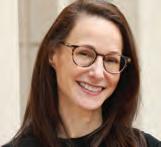
DANIELLE K. CITRON’S book “The Fight for Privacy: Protecting Dignity, Identity, and Love in the Digital Age” was published in October by W.W. Norton and Penguin Vintage UK. She pub lished several articles in the spring and summer, including “Privacy In junctions” in the Emory Law Journal and
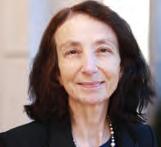
FACULTY NEWS 60 U VA LAWYER | Fall 2022
—Jane Kelly
“Privacy Harms” with Daniel Solove in the Boston University Law Review. She authored several opinion pieces in Slate, gave 15 talks and appeared on CNN and PBS’ TV program “The Open Mind.”
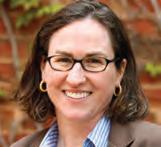
ANNE COUGHLIN’S Sound Justice Lab earned $1 million in grant funding from UVA’s Democracy Initiative. Coughlin co-directs the lab with the School of Music’s Bonnie Gordon and Nomi Dave (see sidebar)
GEORGE COHEN served as faculty consul tant to the Adminis trative Conference of the United States on a project regarding the regulation of represen tatives in agency adju dicative proceedings. He authored a report discussing the rules of conduct for attor neys and non-attorneys representing parties in proceedings before federal agencies. The report led to a series of recommendations adopted by ACUS in December, including convening a working group to promulgate model rules of conduct for representatives before federal agencies. Cohen will serve as a voting member of the working group.
Cohen wrote a brief article discussing this work for the Univer sity of Pennsylvania’s Regulatory Review and wrote a chapter on rules of conduct for representatives, which will be published in the newest edition of the ABA’s Guide to Federal Agency Adjudication.

As part of UVA Law Alumni Weekend, Cohen made a CLE pre sentation on “Knowl edge, Willful Blind ness, Due Diligence and the ABA.”
Cohen also submit ted and presented com ments regarding pro posed amendments to the ABA Model Rules of Professional Conduct concerning client due diligence obligations for lawyers.
Coughlin co-au thored, with MOLLY BISHOP SHADEL , “The Gender Participa tion Gap and the Pol itics of Pedagogy,” in the Virginia Law Review Online. With NAOMI CAHN, Cough lin published an op-ed in The Washington Post, “Texas is tram pling parents’ rights in its investigations of trans kids.”
COUGHLIN CO-DIRECTS UVA’S NEW SOUND JUSTICE LAB
For Professor ANNE COUGHLIN, the law is about much more than rules and doc trines—the law is a discourse that relies on storytelling for its descriptive claims and prescriptive guidance. For example, she pointed out, the holdings of cases are like “punchlines whose meanings emerge from the stories that judges tell to support them.” Yet, she said, lawmakers over the generations have been inatten tive and even hostile to the stories of women and girls, as well as those of people of color, LGBTQ individuals and Native Americans.
ASHLEY DEEKS returned from her time at the White House, where she advised the national security adviser and other officials at the National Security Council on legal issues related to the use of force, armed conflict, sanctions, intelligence activities, declassification and a range of other topics. Late last year, she published a book chapter titled, “Will Cyber Autonomy Undercut Democratic Accountability?,” which examines how the increased use of machine learning in cyber operations will challenge the ability of policymakers and the public to understand and oversee cyber decisions.
In the spring, Deeks and co-author ANDREW HAYASHI published “Tax Law as Foreign
Those are the concerns targeted by the Sound Justice Lab, a new interdis ciplinary gender justice initiative at the University of Virginia, co-directed by Coughlin and music professors Nomi Dave and Bonnie Gordon.
The lab, which launched July 1, received a three-year, $1 million grant from UVA’s Democracy Initiative to locate, listen to, and amplify voices and experi ences that have been neglected by the institutional actors and processes that are charged with dispensing justice.
“One of our most basic objectives is to influence pedagogy both in law school classes and elsewhere,” Coughlin said. “Think about whose voices have the most power in public spaces, which include classrooms. What do those voices sound like? Whose claims and interests are heard and considered relevant, and whose are not? Our lab will study what justice sounds like and looks like when some voices are given a hearing and others are not.
“Those voices will rise somewhere, and we are committed to hearing, listen ing and advocating for them,” she added.
Among the initiative’s first events, Coughlin and Gordon held a public talk and discussion of the U.S. Supreme Court decision Dobbs v. Jackson Women’s Health Organization on June 29 at the Law School. The ruling overturned Roe v. Wade and said there was no constitutional right to abortion under the 14th Amendment. (Coughlin is teaching a course on the law post-Dobbs with Profes sor NAOMI CAHN this fall.)
Coughlin, who clerked at the Supreme Court, joined the Law School faculty in 1996 and is the Lewis F. Powell, Jr., Professor of Law. Her primary research and teaching interests are in the areas of criminal law, criminal procedure, feminist jurisprudence, law and public service, and law and the humanities.


The Democracy Initiative was established in 2018 by the College and Gradu ate School of Arts & Sciences and the Miller Center for Public Affairs. It is designed to engage a wide audience in examining the challenges confronting democracies today.
—Mike Fox
FACULTY NEWS Fall 2022 | U VA LAWYER 61
CURTIS NAMED ASSOCIATE DEAN,
RECOGNIZED FOR PAPER
Professor QUINN CURTIS was named associate dean for curricular programs at the Law School, effective July 1.

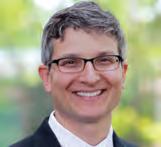
His responsibilities include managing the Law School’s varied curriculum and serving on the Curriculum Committee, recruiting and supporting adjunct and short-course instructors, and overseeing and coordinating experiential and dual-degree programs.
“UVA Law offers a huge array of courses and clinics, and I’m looking forward to working with our faculty to make sure our students continue to have access to phenomenal classroom and real-world experiences,” Curtis said. “One of the wonderful things about this law school is how dedicated it is to quality teaching. I’m proud to help carry forward this tradition in this new role.”
Curtis, a former Microsoft engineer who holds both a J.D. and a doctorate of finance from Yale University, joined the faculty in 2011. He has written extensively on the regulation of mutual funds and retirement accounts, and he currently teaches courses on corporate law, securities and venture capital.
Curtis succeeds Professor GEORGE COHEN, who assumed the newly created position in 2019 and will return to full-time teaching and research.
“George has done a remarkable job in this new role,” Dean RISA GOLUBOFF said. “He has guided our curriculum, improved our academic policies, and kept the trains running on time during a challenging period. We all owe him our thanks.”
Additionally, Curtis’ co-authored paper “Do ESG Mutual Funds Deliver on Their Promises?” was named one of the top 10 corporate and securities articles of 2021. A poll of academics conducted for Corporate Practice Commentator selected Curtis’ paper, published in the Michigan Law Review, and other honorees from more than 400 candidates.
The paper, co-authored by law professors Jill E. Fisch of the University of Pennsylvania and Adriana Robertson of the University of Toronto, examines whether mutual funds focused on environmental, social and corporate governance goals live up to their label—and concluded that they do.
Curtis’ research and writing focuses on empirical work on 401(k) plans, mutual fund governance and fee litigation, as well as corporate governance and corporate litigation. He is affiliated with the John W. Glynn Jr. Law & Business Program.
—Mike Fox
Policy” in the University of Pennsylvania Law Review, analyzing how Congress and the president could make greater use of the income tax as a foreign policy tool. Her book chapter, “Coding the Law of Armed Conflict: First Steps,” was published in an edited volume that explores how the law of armed conflict will look in the year 2040.
KRISTEN EICHENSEHR, who writes and teaches about national security and foreign relations, appeared on several panels discussing the Russian invasion of Ukraine and accountability in cyberwarfare, including presenting a guest lecture for a legal course at the U.S. Naval War College in May. She discussed cyberattacks on the Lawfare and “Common Law” podcasts and moderated a conversation with journalist Nicole Perlroth for the UVA National Security Law Center in February.
She published “Ukraine, Cyberattacks, and the Lessons for International Law” in the American Journal of International Law Unbound, and contributed a book chapter to “The United States’ Cyber Strategy and ‘Defend Forward’: A Comprehensive Legal Assessment.”
She presented a forthcoming essay, “National Security Creep in Corporate Transactions,” coauthored with CATHY HWANG, at the Harvard-Yale Stanford Junior Faculty Forum and the Council on Foreign Relations (see p. 66)
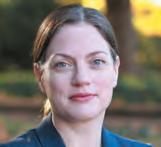
AMANDA FROST, who joined the faculty in August, had her most recent book short-listed for the Mark Lynton History Prize, which is awarded by the Neiman Foundation and the Columbia Journalism School for the “narra tive history that best combines intellectual distinction with felic ity of expression.” The book, “You Are Not American: Citizenship Stripping from Dred Scott to the Dreamers,” was published in 2021. She discussed the book on Texas Public Radio in September.
She testified before the Senate Judiciary Committee’s hearings on transparency and accountability in the federal judiciary and discussed her research into birthright citizenship on NPR’s “Throughline” on June 9.
Her article “The Rise of Reparative Citi zenship” was published in the 25th anniversary volume of the peer-re viewed journal Citizen ship Studies in August.
MAURICIO
and MICHAEL WEISBUCH ’19, received the 2022 Special Mention award from the International Society of Public Law.
Gilbert gave a lecture titled “Justice, Constitutional Courts, and Economics” to faculty and students at the Pontificia Uni versidad Católica del Ecuador, and he presented “Po litical Corruption,” co-authored with DEBORAH HELLMAN, at a virtual conference on election law.
With MICAH SCHWARTZMAN ’05, he organized a conference at UVA Law, “Judging Hard Cases.”
MICHAEL GILBERT’S book, “Public Law and Economics,” co-au thored with Robert Cooter of the University of Califor nia, Berkeley, was pub lished by Oxford Uni versity Press. He presented material from the book at a meeting of the Interna tional Association of Constitutional Law in Córdoba, Argentina.
RISA GOLUBOFF moder ated a June panel at the Inaugural Civil Rights Law Institute at Monti cello, “The Law of Ex cessive Force and Legal Remedies: Building Winning Arguments as They Relate to the Dis proportionate Impact on People of Color.”
She served as a pan elist about Justice Stephen Breyer’s career at the Federal Judges Association Quadren nial Conference in May; she also served as a panelist for the Jewish Theological Seminary’s Bernard G. Segal Me morial Lecture in Law and Ethics, “Hate on Trial: The Charlottes ville Case,” in March.
In September, she taught a National Humanities Center webinar as part of a series on the First Amendment, and inter viewed Harvard Uni versity law professor Mark Tushnet, for a Constitution Day event at the Law Library of Congress.

Other speaking en gagements include a presentation to the Federal Bar Associa
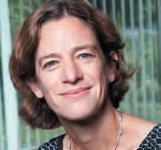
FACULTY NEWS 62 U VA LAWYER | Fall 2022
His paper “Con stitutional Locks,” co-authored with GUIM S.J.D. ’18
tion’s Western District of Virginia about law schools and the free ex change of ideas, and ap pearing as the plenary speaker at Amazon Pro Bono Week and the annual meeting of the American Society for Legal History.
Police Practices Con sortium about develop ing courses on policing and the law based on her 2021 seminal case book, “The Law of the Police.” She is an asso ciate reporter for the American Law Insti tute’s project on po licing, which was ap proved by the ALI’s membership in May.
crimination at Aarhus University in Denmark.
ENRIGHT ’92, GIVENS WIN PUBLIC SERVICE AWARD


RACHEL HARMON gave the Mastrofski Lecture at George Mason Uni versity in March re garding the basis for her draft paper, “Law and Orders: The Problem of Police Commands.” Over the summer, she presented a draft of the paper at the Law of the Police Roundtable at the University of South Car olina and the UVA Law faculty workshop.
She presented another paper, “Force and Flight,” at faculty workshops at the Uni versity of South Caro lina Law School and Penn State Law School in spring. Co-authored with former UVA Law professor Kimberly Kessler Ferzan, the paper considers when force that is necessary to achieve legitimate state ends is nevertheless unjustifiable. It is part of a two-paper series Harmon and Ferzan are writing considering philosophical justifica tions for police prac tices.

She was inter viewed in February for TalksOnLaw as part of a panel, “Race, Police and Imperfect Justice”; in March, she spoke about police reform as part of UVA’s Life time Learning panel on criminal justice reform; and in May, she spoke at a roundtable on police unions and police ac countability at the Lawyers’ Committee for Civil Rights.
She spoke in April to the American Bar Asso ciation Legal Education
ANDREW HAYASHI presented his article “The Law and Economics of Animus” at the University of Chicago Law School in May. The article is part of a broader research agenda that involves revisiting law and economics analysis to incorporate a broader set of individual motivations. He is currently working with MICHAEL GILBERT on an article about these themes, called “Law and Economics for Empaths and Angels.” He is co-editing a volume about theology and taxation, and he hosted a conference at the Law School in September for contributors to that volume.
A. E. DICK HOWARD ’61 was honored by the Rhodes Trust in June at a black-tie dinner at Oxford’s Ashmolean Museum. The George Parkin Award for service to the trust honored his 29 years of service as Virginia sec retary of the Rhodes Trust, and his 40 years of service on the board of directors of the American Association of Rhodes Scholars.
Howard was elected as a Rhodes Scholar while he was a second-year law student at UVA. During his Rhodes fellowship, he studied philosophy, politics and econom ics at Christ Church, Oxford, earning Ox ford’s B.A. and M.A. degrees. He has re turned to Oxford about a dozen times to present lectures. The board of governors of Christ Church has elected Howard a member of the college’s High Table and of its Senior Commons Room.
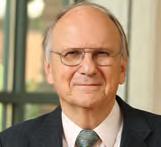
The Innocence Project at UVA Law is a picture of highstakes collaboration in action, with 14 clinic students, two directors and multiple witnesses, prosecutors and defense attorneys working together— against time—to free the wrongly con victed.

The University’s Public Service Awards Committee recognized the clinic’s achievements when it awarded its longtime leaders
Professors DEIRDRE ENRIGHT ’92 and JENNIFER L. GIVENS one of this year’s Collaborative Excellence in Public Service Awards. The duo were recognized at a reception May 9.
Enright started the Innocence Project at UVA Law in 2008; Givens joined her as legal director in 2015, and now serves as director. After step ping down from the clinic over the summer, Enright moved over to run a new criminal justice policy clinic she launched in January, the Project for Informed Reform. (JULIET HATCHETT ’15 joined the Inno cence Project as associate director in August.) Enright is also director of the Law School’s Center for Criminal Justice, alongside Professor RACHEL HARMON
In the past calendar year, the project won the release or exoneration of nine clients and won millions in compensation for six who were completely exonerated, representing the culmination of many years of work by the clinic.
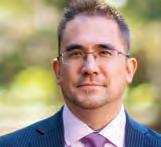
DEBORAH HELLMAN pub lished “The Algorith mic Leviathan” with Kathleen Creel in the Canadian Journal of Philosophy. She also presented work vir tually at Gästehaus Goethe University, in Frankfurt, Germany, and at Dartmouth College. In October, she delivered a keynote address at a conference hosted by the Centre for the Experimental-Phil osophical Study of Dis
CATHY HWANG publshed “Contractual Depth” in the Minnesota Law Review with Matthew Jennejohn; “Collab orative Intent” in the Virginia Law Review; “Cleaning Corporate Governance” in the University of Penn sylvania Law Review with Jens Frankenre iter, Yaron Nili and Eric Talley; and “Comment on the Limits of Public Contract Law” in Law & Contemporary Problems.
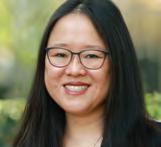
“Collaboration is the soul of any good innocence project,” Enright wrote in a statement to the awards committee. “[W]e have little power to compel anyone to cooperate with us. The cases are not active in court, so we have no subpoena power. We are left to find ways to collaborate, some obvious and some obscure.”
In her own personal statement, Givens noted, “The failure to work collaboratively can stop a case in its tracks. Establishing relationships with police, prosecu tors and crime victims is crucial to the ability to fully investigate our cases.”
Enright and Givens each received a $3,000 prize for the public service award, and the Innocence Project will receive an additional $3,000 to support the pro gram’s continuing efforts.
—Melissa Castro Wyatt
FACULTY NEWS Fall 2022 | U VA LAWYER 63
She presented the “Collaborative Intent” paper at a Columbia Law School conference in April, and presented, with co-author KRISTEN EICHENSEHR, “National Security Creep in Corporate Transactions” at the 2022 Harvard/Yale/ Stanford Junior Faculty Forum (see p. 66).

Hwang and her coauthors Nili and Jeremy McLane presented “The Lost Promise of Loan Covenants” at the Penn-NYU Empirical Contracts Workshop in June and the Law & Society Association’s annual meeting in July.
She also presented a forthcoming University of Pennsylvania Law Review article, “Nonparty Interests in Contract Law,” at a faculty workshop at Washington University in St. Louis in April.
HARMON HONORED WITH ALL-UNIVERSITY TEACHING AWARD
Professor RACHEL HARMON was named a recipient of one of this year’s AllUniversity Teaching Awards, marking the seventh time in the past 10 years that a member of the school’s faculty has been honored for their passion and skill in the classroom.
When Harmon started teaching her class Law of the Police in 2011, she would tell her students not to think of it as a practical course, but rather as a critical perspective on the laws and policies that regulate police activity and conduct. But as she and her students delved into the cases, history and commentary that later became her 2021 seminal casebook of the same name, the students had other ideas.
“Students started immediately pushing back and saying, ‘No, we’re going to use this in the real world!’” Harmon said. “So I’m not only trying to teach them doctrine, I’m trying to give them tools to help them change the world.”
Harmon, a former federal prosecutor with the Department of Justice Civil Rights Division and a director of the school’s Center for Criminal Justice, is the Harrison Robertson Professor of Law. She joined the faculty in 2006.
She is a member of the American Law Institute and serves as an associate reporter for ALI’s project on Principles of the Law of Policing. She regularly advises nonprofits and government actors on issues of policing and the law.
In addition to teaching Law of the Police, Harmon teaches a battery of more conventional criminal justice classes, including criminal law, criminal procedure and courses examining the Supreme Court’s approach to criminal jurisprudence.
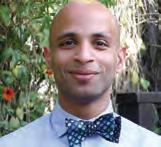
Harmon’s courses are a hot commodity at the Law School, and students come into the classes with a wide spectrum of political perspectives and life experiences.
As Dean RISA GOLUBOFF noted in her nomination letter, “These are difficult and controversial subjects. The cases are ripped from the headlines, and they involve deeply troubling facts about violence, racism and discrimination.”
Harmon manages these challenges with singular skill, Goluboff said, and called Harmon’s ability to create space for a free and respectful exchange of ideas about such controversial issues “miraculous.”
—Melissa Castro Wyatt
In July, CALE JAFFE ’01 was promoted from associate professor to full professor, general faculty. Over the summer, Jaffe and students in the Environmental Law and Community Engagement Clinic filed an amicus brief in the U.S. Supreme Court case Sackett v. EPA, a major Clean Water Act case out of Idaho that considers the federal government’s jurisdiction over wetlands, streams and other aquatic resources adjacent to traditionally navigable waters. Jaffe’s team represented the Idaho Conservation League. Earlier in the spring, Jaffe and clinic students represented the Sierra Club in a Virginia State Corporation Commission proceeding on a proposed wind farm, which would be the largest such project
in the U.S., generating enough electricity to power 660,000 homes.
CRAIG KONNOTH was named the Univer sity of Virginia John T. Casteen III Faculty Fellow in Ethics, a program that supports integrating ethical analysis and rea soning into courses. At the Law School, Konnoth was named a Martha Lubin Karsh and Bruce A. Karsh Bicentennial Profes sor of Law.
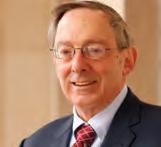
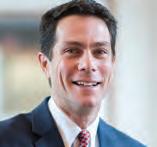
DOUGLAS LAYCOCK filed an amicus brief with the U.S. Supreme Court in Carson v. Makin, in which the court held that a state that pays tuition for students at tending private schools cannot discriminate between religious and secular schools. He spoke in Febru ary to UVA’s Feder alist Society chapter about his amicus brief and to the Yale Fed eralist Society about the Supreme Court’s shadow docket. In March, he spoke on re ligious liberty to the Washington and Lee University School of Law Federalist Society.
He spoke at the Reli gious Liberty Scholars Summit in Washing ton, D.C., on litigat ing as an academic and dealing with the press (sponsored by Becket Law), and on religious liberty issues arising from COVID-19 and other public health regulations in a Current Issues in Judging course as part of the ju dicial LL.M. program at
FACULTY NEWS 64 U VA LAWYER | Fall 2022
Duke University School of Law.
In April, he taught a class on Rosenberger v. Rector and Visitors of the University of Vir ginia for a UVA course, A History of Religion at UVA. In June, he spoke on the religious liberty work of Sanford Levin son at LevinsonFest, an event celebrating Levinson’s 40 years at the University of Texas. He spoke at an Associa tion of American Law Schools webinar on “Teaching Remedies” in July.
He recently pub lished “Restatement (Third) of Torts: Rem edies,” with Richard L. Hasen and the Ameri can Law Institute; “On Friendship, Tolerance, and Religious Liberty” in Balkinization; and the 2022 Teachers’ Update to “Modern American Remedies: Cases and Materials.”
Institutes for Advanced Study, with its theme of “Intelligence and Arti ficial Intelligence,” and he will participate in a weeklong conference on this topic in Brazil in November.
In December, Liver more will present work at Hebrew University in Jerusalem on textas-data analysis of legal decision-making. He continues to host the podcast “Free Range with Mike Livermore,” which can be found on Apple Podcasts, Spotify and other plat forms. Guests in recent months have included Pulitzer Prize-win ning author Elizabeth Kolbert; University of California, Davis, econ omist Francis Moore; and philosopher Ronald Sandler of Northeast ern University.
amicus brief at the Supreme Court in Na tional Pork Producers Council v. Ross, arguing that California violated the dormant Commerce Clause with its extra territorial and unduly burdensome regulation of hog farming.
Over the January term, she taught a course on transfer pricing with former Treasury official Michael McDonald. She served on a panel at Harvard regarding the new global tax framework and a panel at the Tax Policy Council Institute’s annual meeting in Washington on “Multilateralism: The New Mode.” She was inducted into the American College of Tax Counsel and hosted the Oxford-Virginia Legal Dialogs, an online webinar series.
DANIEL R. ORTIZ , director of the Supreme Court Litigation Clinic, filed a cert reply as counsel of record in Jones v. Hendrix, which asks whether habeas relief is available to federal inmates who did not file timely challenges to their convictions when statutes or judicial deci sions decriminalized the activities at issue after they were convicted of the activity. Ortiz spent the summer drafting the opening merits brief and supervised the students’ drafting of the merits reply brief earlier this semester. They are cur rently preparing for oral argument.
In February, the Pennsylvania Law Review published a paper by SAIKRISHNA PRAKASH, “The Peace Powers: How to End Wars.” The article was co-written with AVERY RASMUSSEN ’21 In January, Prakash pre sented a paper to the Harvard Public Law Workshop, regarding the president’s power to remove appointees. In June, he spoke at a con ference held by the National Constitution Center.
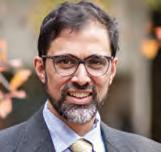
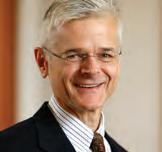
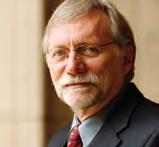
March and frequently appeared in the media to discuss Jackson’s nomination.
She served as a pan elist at the American Constitution Soci ety’s national conven tion in June, regarding the “weaponization of ‘parental rights.’”
She presented as a guest lecturer on “School Funding and a Federal Right to Edu cation” at Georgetown University’s Edunom ics Lab in June, and as the keynote speaker on Title IX inequity in higher education to the American Association of University Women of Virginia in March.
In June, MICHAEL A. LIVERMORE presented new work on environ mental ethics and en dangered species law at the Society for En vironmental Law and Economics workshop, which was held at New York University School of Law. He also partici pated in the Journal of Institutional and Theoretical Econom ics workshop sponsored by the Max Planck In stitute for Research on Collective Goods, this year held in Stral sund, Germany, on the theme of judicial deci sion-making. In May, he presented work on environmental federal ism at the Sustainability Conference of Ameri can Legal Educators at Arizona State Univer sity. Throughout the summer, he continued as a fellow of the Inter continental Academy of the University-Based
tive
provost, became presi dent of the University of Pennsylvania on July 1. She is now David and Mary Harrison Dis tinguished Professor of Law Emeritus at the Law School.
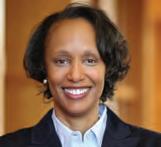
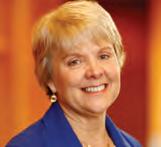
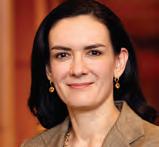
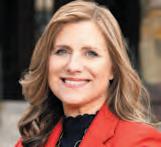
JOHN T. MONAHAN recently coauthored an article in the Journal of Criminal Justice, “The Predictive Performance of Criminal Risk Assessment Tools Used at Sentencing: Systematic Review of Validation Studies.”

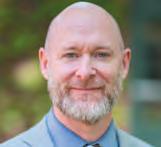
Ortiz also helped draft a cert reply in Flowers v. United States, which asked whether conduct that law-abid ing members of the general public routinely engage in can establish reasonable suspicion justifying a Terry stop merely because the be havior was observed in a high-crime area. (The petition was denied.)
RUTH MASON advised the school’s moot court team, which placed second in this year’s In ternational and Euro pean Tax Moot Court competition in April, while winning a major ity of the prizes awarded in the qualifying rounds: Best Pleading Applicant Team, Best Pleading De fendant Team, Best De fendant Brief and Best Oralist for the Applicant.
Mason filed an
He also co-authored a manuscript currently under review at another journal, “Pretrial Risk Assessment, Risk Communication, and Racial Bias.” Monahan directs a research project for the John D. and Catherine T. MacArthur Foundation on ways to improve pretrial risk assessment. He also serves on the advisory board for Advancing Pretrial Policy & Research, a project supported by Arnold Ventures.
He helped file a cert petition and cert reply in Spade v. United States Department of Justice, which asks whether federal courts have sub ject-matter jurisdiction to determine which inju ries fall within the scope of the Federal Employ ees’ Compensation Act.
Ortiz also published an article, “Voting Rights and the 1971 Virginia Constitution,” in the UVA Law student-run Journal of Law & Poli tics. He spoke at several events marking Justice Stephen Breyer’s retire ment, including a UVA Law webinar, “Justice Breyer’s Legacy: Four Decades on the Bench,” and participated in a Wisconsin Public Radio program on mandatory arbitration.
RICHARD RE published “The Peril and Promise of SCOTUS Resigna tions” in the Iowa Law Review Online. He wrote about the paper in an op-ed for The Boston Globe, “Here’s a Way for Justice Jackson To Reform the Supreme Court on Her First Day.”
He also published “Personal Precedent in the Supreme Court” in the Harvard Law Review, and the article was featured by The New York Times in “The Problem of ‘Per sonal Precedents’ of Supreme Court Justices.”
Other speaking en gagements included UVA Law’s Center for the Study of Race and the Law in March on “Teaching Race in K-12 Schools: Cultural, Legal and Policy Per spectives”; the Thur good Marshall Lecture at Roger Williams University School of Law in March on “A Roadmap to Edu cational Excellence and Equity for Rhode Island”; a confer ence at the Univer sity of South Caro lina School of Law in February on “Rule of Law and Civics”; the Rumi Forum in Char lottesville in February on “Legal Pathways to Ensuring All Chil dren Receive a HighQuality Education”; and at the Education Law Association’s 67th annual confer ence in October on “San Antonio v. Ro driguez: Past, Present and Future.”
KIMBERLY JENKINS ROBINSON published “The Hope of Ketanji Brown Jackson’s Nom ination” as a guest column in Richmond Times-Dispatch in
She also served as a moderator for a panel at the Shaping Justice Conference at the Law School in February on “Safe Schools for All Students: Protecting the Rights of LGBTQ+ Youth in the K-12 Edu cation System” and for a litigation workshop on remedies and en forcement at the Edu cation Law Center last November.
FACULTY NEWS Fall 2022 | U VA LAWYER 65
M. ELIZABETH MAGILL ’95, former UVA execu
vice president and
FACULTY HONORS IN BRIEF
AHDOUT WINS EMERGING SCHOLAR AWARD
PAYVAND AHDOUT won The Yale Law Journal’s inaugural Emerging Scholar of the Year Award in March. The award recognizes the achievements of earlycareer academics who have made significant contributions to legal thought and scholarship, according to the journal. It seeks to promote scholarship that has the potential to drive improvements in the law and to spotlight the exceptional work of its honorees. The winner was selected by the journal’s editors.

SPOTIFY COUNCIL ADDS CITRON
DANIELLE CITRON, director of the school’s LawTech Center, will help Spotify improve policies and products while respecting creator expression as a founding member of the media services provider’s Safety Advisory Council. “Our council members will advise our teams in key areas like policy and safetyfeature development as well as guide our approach to equity, impact and academic research,” the company said in a statement June 13.
Citron was also named a 2022 Fastcase 50 award honoree for her advocacy and innovation in cyberlaw on July 12.
CITRON, ROSS JOIN CENTER’S ADVISORY BOARD
DANIELLE K. CITRON and BERTRALL ROSS have joined the advisory board of the new Fair Elections and Free Speech Center at the University of California, Irvine School of Law. Launched July 20, the center is dedicated to advancing an understanding of, and offering means to counter, threats to the stability and legitimacy of democratic governments exacerbated by the unregulated growth of digital media and other technological changes in mass communication.

EICHENSEHR, HWANG PRESENT AT FACULTY FORUM
A paper co-authored by KRISTEN EICHENSEHR and CATHY HWANG was accepted to the 2022 Harvard/Yale/Stanford Junior Faculty Forum. Eichensehr and Hwang pre sented “National Security Creep in Corporate Transac tions,” forthcoming in the Columbia Law Review, during the June 9-10 confer ence at Harvard Law School. Their article examines na tional security’s rapidly ex panding influence on corpo rate transactions in the United States. The Harvard/ Yale/Stanford forum was created to encourage the work of scholars recently appointed to tenure-track positions. Eichensehr directs the National Security Law Center, and Hwang directs the John W. Glynn Jr. Law & Business Program.




NICOLETTI WINS AWARD FOR ARTICLE
CYNTHIA NICOLETTI, a legal historian, won the George and Ann Richards Prize for the best article published in The Journal of the Civil War Era in 2021, the journal announced July 19. Her essay, “William Henry Trescot: Pardon Broker,” appeared in the December issue. She details the efforts of Trescot, “executive agent” for South Carolina, to secure pardons in order to facilitate the restoration of land the federal government had seized from low country planters during the war.
PRAKASH CONTRIBUTES TO ELECTORAL REFORM PROJECT
SAIKRISHNA PRAKASH was part of an American Law Institute project exploring reforms to the Electoral Count Act. The group, co-chaired by New York University law professor BOB BAUER ’76, unanimously agreed that Congress should reform the ECA, passed in 1887, in time for the 2024 election. The project proposed principles “in an effort to contribute to a constitutionally sound bipartisan consensus in Congress.” Among the suggestions were limiting objections to electoral votes to those grounded in explicit constitutional requirements; moving the Electoral College meeting date to account for recounts and legal challenges; and affirming that states cannot disregard votes or electors contrary to laws in place on Election Day.

FACULTY NEWS 66 U VA LAWYER | Fall 2022
UVA LAW ARCHIVES
—Mike Fox
Ahdout
Citron
Ross
Eichensehr
Hwang
Nicoletti
Prakash
BERTRALL ROSS pub lished “Inequality, Anti-Republicanism, and Our Unique Second Amendment” in the Harvard Law Review Forum and “Voter Data, Democratic Inequality, and the Risk of Political Violence” in the Cornell Law Review.
Ross presented “Toward Democracy: The Evolving Meaning of Republican Form of Government” at the University of Wiscon sin Law School confer ence “Interpretation in the States” in May. At the Duke-Harvard symposium “Guns, Violence, and Democ racy” in March he pre sented “Inequality, Anti-Republicanism, and Our Unique Second Amendment.”
He served on three panels at the Association of American Law Schools annual conference in January: “Election Subversion: Assessing the Dangers to American Democracy”; “What Research Can Tell Us About How Law Schools, Lawyers and Leaders Can Nourish Democracy”; and “Redistricting, Gerrymandering, the Voting Rights Act.”
He also served as a panelist for the AALS Faculty Focus webinar in April, “Creating an Inclusive Classroom,” and for the Univer sity of Washington’s “Voting Rights Under Attack” webinar in January, sponsored by the Washington Insti tute for the Study of In equality and Race.

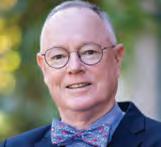
He provided comments for a paper titled “Election Emergencies” at the Federalist Society’s national symposium at the Law School in March.
GEORGE RUTHERGLEN is working on a book, “The Contentious Past and Uncertain Future of Employment Dis crimination Law,” about the likely effects of the Supreme Court’s decisions in Dobbs v. Jackson Women’s Health Organization and in upcoming affir mative action cases on the law of employment discrimination.
Rutherglen is also working on an article about choice-of-law principles for the online edition of the Virginia Journal of Interna tional Law, “A Choice by Any Other Name: Ad Hoc Substitutes for Choice of Law.”

of Law in the Decision of Hard Cases,” at the Karsh Center for Law and Democracy’s May conference at the Law School, “Judging Hard Cases.”
The 2022 edition of “Leading Cases in Constitutional Law,” which he co-authored with Jesse H. Choper, Michael C. Dorf and Richard H. Fallon Jr., was released this year, along with a supple ment to “Constitutional Law: Cases, Comments, and Questions” by the same authors.
Schauer gave Zoom lectures on “free speech justifications” for a graduate-level course on freedom of expres sion in Warsaw and on legal reasoning for a doctoral program in São Paolo. He gave the keynote lecture at a conference on experi mental jurisprudence at the University of Michi gan Law School.
spectives,” sponsored by the American As sociation of University Professors; spoke about “Emerging Leaders,” at the African-Amer ican Mayors Associa tion meeting; and was a panelist for “Through the Looking Glass: Living With COVID19 in 2022,” presented at the Virginia Bar Association’s annual meeting. He and MICAH SCHWARTZMAN ’05 wrote a critical review of Adrian Vermeule’s book, “Common Good Constitutionalism,” that appeared in the April issue of The American Prospect.
revamped trial system that now includes lay judges as decision-mak ers in some criminal cases.
A 2017 University of Chicago Law Review article by Spellman and FREDERICK SCHAUER about the use of analogy in legal decisions was cited in Justice Clar ence Thomas’ major ity opinion in New York State Rifle & Pistol Asso ciation Inc. v. Bruen Schauer and Spell man had a paper on precedent and similar ity accepted for publi cation as a chapter in “Philosophical Founda tions of Precedent,” to be published by Oxford University Press.
national Law awarded PAUL STEPHAN ‘77 and his co-editor, Sarah Cleveland of Columbia Law School, the 2022 Robert E. Dalton Award for Outstanding Con tribution to the Field of Foreign Relations Law for their book, “The Re statement and Beyond: The Past, Present, and Future of U.S. Foreign Relations Law.”
Over the summer, he was scholar in resi dence in the London office of WilmerHale.
FREDERICK SCHAUER’S book, “The Proof: Uses of Evidence in Law, Politics, and Every thing Else,” was pub lished by Harvard Uni versity Press in May. It explores the use of evi dence in courts, medi cine, art, history and beyond, helping the reader derive truth in different contexts.
He responded to commentators at a sym posium about the book at the International Congress on Evidence and Proof in Girona, Spain, in May.
Schauer also pub lished “Kelsen, Kletzer, and the Differentiation of Law” in the Ameri can Journal of Juris prudence and “Statis tical Evidence and the Problem of Specifica tion” in Episteme.
He presented his new paper, “A Frame Without a Picture: On the Relevance (or Not)
RICHARD C. SCHRAGGER co-sponsored a confer ence in Tel Aviv titled “Regionalisms: Shift ing Scales Beyond Cities and States” and presented his paper “Seeing Like Region.” He presented “The City in the Future of Feder alism” at a conference on federalism spon sored by Northwestern University Law School, and he was a panelist on “NIMBYism: Triumph of an Illusion II,” pre sented at the annual Urban Affairs Associa tion meeting.
Schragger pre sented “The Perils of Land Use Deregula tion,” which was pub lished in the University of Pennsylvania Law Review, to the Califor nia Alliance of Local Electeds; was a panelist on “Teaching Race in K-12 Schools: Cultural, Legal, and Political Per
MICAH SCHWARTZMAN ‘05 wrote “The Politics of Proportionality” with Cornell University law professor Nelson Tebbe for the Michi gan Law Review and co-authored a piece with Dahlia Lithwick titled, “Is the Reli gious Liberty Tent Big Enough to Include the Religious Commit ments of Jews?”
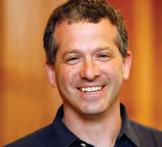
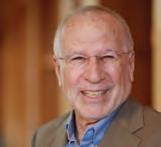
As director of the Karsh Center for Law and Democracy, Schwartzman co-hosted with MICHAEL GILBERT the conference “Judging Hard Cases” at the Law School, and he orga nized the second annual May Gathering, which brought together schol ars and practitioners focused on poverty law and social movements.
Spellman has been working with the Or ganization of Scien tific Area Committees for Forensic Science, a division of the Na tional Institute of Stan dards and Technol ogy, to help improve forensic science pro cedures. She was a coeditor of a special issue of the journal Forensic Science International: Synergy. Each article became a chapter in the book, “The Human Factors in Forensic Science Sourcebook.”
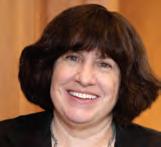
Spellman was the lead author of a chapter called “Challenges to Reasoning in Forensic Science Decisions.” The co-editors produced a one-hour webinar to in troduce the book.
Spellman was one of 50 authors to con tribute to “Psychologi cal Science in the Wake of COVID-19: Social, Methodological, and Meta-Scientific Con siderations,” a forth coming paper in the peer-reviewed journal Perspectives on Psy chological Science.
In July, Stephan tes tified before the Senate Judiciary Committee on legislation to autho rize some forfeiture of frozen assets owned by Russian oligarchs. He also lectured re motely at the Brazil ian International Law Winter Program in Belo Horizonte, Brazil.
He took part in two seminars for U.S. gov ernment personnel on the design of Russian sanctions, one orga nized by the Brookings Institution to assist congressional staff, and another related to the U.S. State De partment’s Office of the Legal Adviser. The sanctions regime work appeared in a number of blog posts and media interviews, including The New York Times, Izvestiya and Brazilian and Chinese television, and was summarized in his article, “Seizing Russian Assets,” to be published in the Capital Markets Law Journal in July.
Stephan co-au thored an amicus brief in Animal Science Products, Inc. v. Hebei Welcome Pharmaceuti cal Co. Ltd., urging the U.S. Supreme Court to grant certiorari.
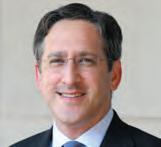
In April, the Ameri can Society of Inter
The European Journal of Interna tional Law published his article, “The U.S. Context of the Restate ment (Fourth) of the Foreign Relations Law of the United States,” as well as an interview with Stephan about the Fourth Restatement.
(continued on p. 70)
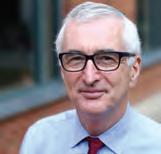
FACULTY NEWS
BARBARA SPELLMAN’S co-authored book, “The Psychological Founda tions of Evidence Law,” was translated into Japanese for use in a
Fall 2022 | U VA LAWYER 67
BOOK SHELF
PUBLIC LAW AND ECONOMICS
MICHAEL GILBERT AND ROBERT COOTER OXFORD UNIVERSITY PRESS
WHEN RONALD COASE AND GUIDO CALABRESI pioneered the application of economics to law in the early 1960s, they pushed efficiency, incentives and the iconic “rational actor”—one who behaves rationally to pursue his preferences—to the forefront of private law fields such as torts, contracts and property.
UVA Law Vice Dean Michael Gilbert has teamed up with his mentor and former professor, Robert Cooter of the University of California, Berkeley, to take that analy sis one step further by applying economic theory to the realm of public law in their new textbook, “Public Law and Economics.”

While it may seem counterintuitive to apply economic analysis to fields that don’t involve a focus on money or numbers, the book is an extension of the past 60 years of law and economics scholarship, Gilbert said.
“Many people believe that economics has no place in public law because it’s concerned with dollars and cents, but that’s a misunder standing,” Gilbert said. “Economics is built on a much deeper conception of the social good than that. Even if you reject that con ception, you should still care about econom ics because of its focus on incentives. Law usually aims to change people’s behavior, and it’s easier to accomplish that with a thorough understanding of incentives.”
The book was written over the course of six years, and much of the authors’ time was spent figuring out how to organize the text into coher ent and digestible topics that apply universally.
“If you understand the economic forces behind these fundamental processes of law making—bargaining, voting, entrenching, delegating, adjudicating and enforcing— you’ll understand a lot about public law.”
Gilbert and Cooter’s goal is not necessarily to lay out policy prescriptions but rather to use economic analysis to equip readers to think about why public laws and regulations are enacted and whether they are likely to achieve their goals.
Cooter is a pioneer in law and economics and a recipient of the Ronald H. Coase medal, which is awarded in recognition of major contributions to the field.
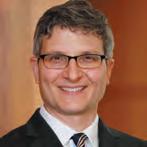
Gilbert was the inaugural director of the Law School’s Center for Public Law and Political Economy, and is a member of the Democracy Initiative’s Corruption Lab for Ethics, Accountability, and the Rule of Law. He has won UVA’s All-Uni versity Teaching Award and the Student Council Distinguished Teaching Award.
Gilbert already incorporates economic theory into his political law classes, in cluding Regulation of the Political Process, and Constitutional Law and Econom ics, but the new book is designed to make the economic insights and tools available to professors and their students and also a broader audience, including research ers, scholars and policymakers. To accomplish that goal, Cooter and Gilbert ar ranged for an open access agreement to make the book available online for free. Ironically, they spent six years laboring on a book for no economic return, sug gesting that the rational actor may indeed be mythical. But Gilbert explains that tension through the same lens he and Cooter have applied to analyzing public law: The arrangement satisfies each party’s preferences.
“This was never going to be a money-making enterprise—we don’t care about that,” Gilbert said. “We don’t want the money; we want people to use the book. The open access agreement is an investment, and we think it’s a pretty good one.”
—Melissa Castro Wyatt
FACULTY NEWS 68 U VA LAWYER | Fall 2022
❱
Michael Gilbert’s co-authored book provides an economic analysis of public law— for free.
THE FIGHT FOR PRIVACY PROTECTING DIGNITY, IDENTITY AND LOVE IN THE DIGITAL AGE
DANIELLE KEATS CITRON W.W. NORTON AND PENGUIN UK
WHEN PROFESSOR DANIELLE K. CITRON first started working on privacy issues in 2005, our intimate lives were still relatively free from digital surveillance, with Facebook in its infancy, and Google Maps and the iPhone not yet in existence.

What began first as a slow erosion has since gathered into a landslide, so when the MacArthur Foundation gave Citron a $625,000 “genius grant” in 2019, she took a sabbatical to write a book that would frame the stakes for people who still don’t understand why intimate privacy matters.
“The Fight for Privacy: Protecting Dignity, Identity and Love in the Digital Age” surveys the damage done to privacy rights around the world, makes the case for understanding intimate privacy as a civil and human right, and offers a roadmap for law, industry and individuals to protect those rights.

“The book is about the central role that intimate privacy plays in our lives, and why we need privacy around our bodies, our health, our reading habits, our thoughts, our close relationships, our sexual orientation, sex and gender,” Citron said.
Citron interviewed 60 people who understand what’s at stake because their lives were upended by violations of their intimate privacy. One such victim, a lawyer Citron calls “Joan” in the book, spent three years picking up the pieces of her life after someone secretly taped her showering in a hotel bathroom and then tried to extort her for more nude images. When she refused, the person posted clips of her using the bathroom on thousands of adult sites and adult hookup sites.
“In addition to posting the video online, the extortionist emailed the video to her work colleagues and friends from graduate school, and presumably he got all that information from her LinkedIn account,” Citron said.
She shuttered her social media accounts as she tried (unsuccessfully) to erase the nonconsensual damage to her online identity. She lost contact with friends, delayed her wedding by two years and gave up certain career aspirations.
“All the ways that social media allowed her to connect with other people was the way he was exploiting her,” Citron said. “It changed the arc of her life, and Joan’s experience is resonant with so many people’s experiences. It’s just a wholesale disruption of how you feel about yourself and your emotional
safety and physical safety.”
As Citron explains in her book, there are more than 9,500 sites whose very existence is predicated on exploiting intimate privacy violations. Some sites make a game of it, offering rewards and prizes for popular “nudes.” Sites get away with the abuse because federal law gives them immunity from liability for content posted by third parties.
“We have Section 230 of the Communica tions Decency Act to thank for that,” Citron writes. Citron argues in her book that courts have read the law so broadly that it makes a mockery of its stated purpose, which was to incentivize websites to self-monitor online abuse and other “offensive” material.
Citron writes and teaches about privacy, free expression and civil rights, and serves as the inaugural director of the school’s LawTech Center, which focuses on pressing questions in law and technology.
Companies are spying on people’s intimate lives in ways that are hard for the average person to begin to comprehend.
“Unfortunately, we have so little protection around the collection and sale of our intimate information that when period-tracking apps sell our information to data brokers who then sell it to law enforcement, it’s now a problem for women’s safety and their freedom, because there will soon be over 25 states that have laws criminalizing abortion,” Citron said.
Citron is working with staff for U.S. Sen. Elizabeth Warren on the Health and Location Privacy Protection Act and with U.S. Rep. Sara Jacobs on the My Body, My Data Act. Both bills aim to prevent the collection and storage of intimate health and location data, and to prevent the sale of it to law enforcement without a subpoena or warrant.
She advocates for amending Section 230, which immunizes websites trafficking in nonconsensual porn, to exclude bad actors specializing in intimate privacy violations and stalking. She also recommends creating a “duty of care” that websites must meet in order to qualify for immunity in cases involving intimate privacy violations and cyberstalking.
—Melissa
Castro Wyatt
FACULTY NEWS Fall 2022 | U VA LAWYER 69
❱
MacArthur Foundation fellow Danielle Citron’s new book makes the case for a civil right to intimate privacy.
ROSS LAUNCHES PROJECT EXPLORING WAYS TO INCENTIVIZE VOTER OUTREACH
Professor BERTRALL ROSS is betting he can help fix the way low-income voters have been inadvertently shut out of the voting process because of how campaigns use voter history data.

When campaigns canvas, they target those houses with people who are most likely to vote for their candidate.
“But that results in this contact gap between more wealthy and poor people, because those with low income tend not to vote,” said Ross, the Justice Thurgood Marshall Distinguished Professor of Law.
Ross and a co-author, University of Colorado law professor Douglas M. Spencer, outlined this theory in “Voter Data, Democratic Inequality, and the Risk of Political Violence,” a paper published in the Cornell Law Review in August.
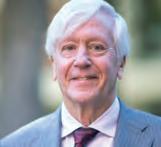
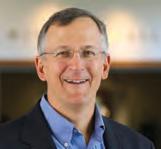
Voter outreach has become more crucial as mass-media advertising has become obsolete, Ross argued, because that face-to-face conversation might be the only opportunity a low-income voter has to learn when and where to vote, and how the ballot issues and candidates’ positions will affect their lives. In fact, one study found that face-to-face canvassing increased turnout by nearly 10 percent.
Conversely, because voting is often logistically difficult for low-income voters, the lack of contact from a campaign decreases the likelihood of them voting in the next election, Ross said. That “vicious cycle” then leads to their needs going ignored because there are no electoral consequences for shutting them out.
Moreover, that sense of alienation can lead to political violence when the mar ginalized feel they no longer have a voice in the decisions being made. A Washing ton Post analysis cited in Ross’ paper looked at 125 people arrested for breaking into the Capitol during the Jan. 6 insurrection; of those, nearly 60% had histories of financial struggles, from unpaid taxes to bankruptcy and foreclosure.
“So how do we make it rational for campaigns to use resources in ways that might reduce alienation and marginalization,” Ross asked, rhetorically. “You can imagine a voucher system that gives low-propensity voters cash vouchers they can give to campaigns that contact them. Would that change the campaign’s cal culation, knowing that they might not only earn a vote, but they might also earn money for their campaign by identifying and targeting these individuals?”
After laying out the idea in his paper, Ross will now be exploring the use of vouchers and other incentive systems as part of his upcoming Designing Democracy: Participation lab course sponsored this spring by UVA Law’s Karsh Center for Law and Democracy, which Ross co-directs with Professor MICAH SCHWARTZMAN ’05
In the course, eight lab students will identify patterns of problems and begin proposing solutions through model legislation. Next fall’s lab students will lobby for the model legislation at the state and federal levels.
The Karsh Center at the Law School was established in 2018 as part of a record $44 million gift from MARTHA ’81 and BRUCE KARSH ’80.
—Melissa Castro Wyatt
Cambridge Uni versity Press will publish his book, “The World Crisis and In ternational Law: The Knowledge Economy and the Battle for the Future,” later this year. He submitted the man uscript for the third edition of his case book, “Doing Business in Emerging Markets: A Transactional Course,” co-authored with Richard Dean ’80 and James Skelton, to Foundation Press.
MEGAN T.
won a $200,000 grant from the Arnold Foun dation to study the long-term socio-eco nomic impacts of in carceration (see p. 58). Her article “Does Cash Bail Deter Mis conduct?” will be published in the American Economic Journal: Applied Economics.
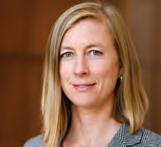
She presented at the National Bureau of Economic Research’s Summer Institute, the Harvard Program on Criminal Justice, the Harvard Roundta ble on Racial Dispari ties in Massachusetts Criminal Courts and the annual meeting of the American Law and Economics Associa tion. She appeared on Virginia Public Radio, WMRA, NBC29 and UVA Law’s “Common Law” podcast.
In January, she was elected chair of the Section on Law and Economics of the As sociation of American Law Schools; her term begins in 2024.
In the past year, she served on ALEA’s finance com mittee, and on the bestarticle prize commit tee for the American Law and Economics Review.
LEON SZEPTYCKI co-au thored two environ mental law articles: one appeared in Envi ronmental Research Letters and focused on the Colorado River basin’s environmen tal water markets as an adaptation to drought, “Decoupling Environ mental Water Markets from Water Law”; the second, a report issued by UVA’s Environmen tal Resilience Institute, assessed the poten tial for carbon seques tration in Virginia, “Leading the Way on Climate Restora tion: Environmental and Economic Oppor tunities for Virginia.”
In September, G. EDWARD WHITE and KENNETH S. ABRAHAM participated in a UVA Law panel discussion of their recently pub lished book, “Tort Law and the Construction of Change.”
The two presented a forthcoming paper about Justice Benjamin Cardozo’s classic, “The Nature of the Judicial Process,” at a March conference at Yale.
The paper, “Doctri nal Forks in the Road: The Hidden Message of ‘The Nature of the Judicial Process,’” will appear in a forthcom ing issue of the Yale Journal of Law and Hu manities.
The two also wrote the introductory chapter of a forthcom ing book about the American Law Insti tute, “The Work of the ALI in Historical Context.”
FACULTY NEWS 70 U VA LAWYER | Fall 2022
STEVENSON
UVA LAW ARCHIVES
IN MEMORIAM: ROBERT SAYLER LITIGATION STAR WHO GREW UVA LAW’S ORAL ADVOCACY PROGRAM
ROBERT N. SAYLER, a renowned litigator who turned to teaching insurance and oral advocacy courses at UVA Law later in his career, died Sept. 7. He was 82.

Sayler joined the faculty in 1995 as the John A. Ewald, Jr., Distinguished Visiting Professor of Law when Professor KENNETH S. ABRAHAM asked him to co-teach an advanced seminar on the practical side of liability insurance. Sayler was then a partner with Covington & Burling, and the “leading policyholder lawyer in the country,” Abraham said.
“He was in a sense one of the founders of the bar in that field, having litigated the first ‘mega-coverage’ cases involving as bestos and pollution liability insurance,” Abraham said. “These cases led to important precedents that are still the seminal cases in the field.”
Sayler found that he enjoyed teaching so much that he moved to Charlottesville to join the faculty in the early 2000s. In the succeeding years, he launched much of the school’s coursework in oral advocacy and public speaking.
“His courses were incredibly popular, intellectually chal lenging and very practical, all at the same time,” Abraham said. “He took the material and his teaching seriously, but never took himself too seriously, although he was one of the great lawyers of his time. We were very lucky to have him here for so long.”
Sayler helped recruit Professor MOLLY BISHOP SHADEL , a
former Covington mentee, in 2004, when she was looking for a job in Charlottesville following work in the Justice Depart ment.
“Bob said, ‘Let me help you get a job at the Law School,’” she recalled. “He was that kind of person, so generous and so in vested in helping other people succeed.”
The pair regularly co-taught public speaking and oral ad vocacy courses until Sayler’s retirement in 2017, and to gether wrote and worked on two successive editions of a book, “Tongue-Tied America: Reviving the Art of Verbal Persua sion.” (Sayler continued to teach occasionally at the Law School through 2021.)
Though Sayler had designed the courses he asked Shadel to join, he soon asked her to add on to the course to incorporate her own experiences. (continued on p. 72)
FACULTY NEWS Fall 2022 | U VA LAWYER 71
“That’s how he was at Covington & Burling, too,” she said. “He would take on young lawyers to mentor and would help them in their careers, never asking for any sort of acknowledge ment of what he had done. He was just in your corner.”
At Covington, she added, Sayler was “a star.”
“Bob was one of first people to recognize that insurance cov erage was a really fruitful place for litigators to explore,” she said. “Because of his expertise, Covington & Burling became known for insurance coverage litigation, and he brought that kind of real-world expertise into the classroom.”
Sayler spent three decades at the firm, eventually becom ing head of the litigation department, and served on the firm’s management committee.
As a young lawyer, he argued before the Supreme Court in Richardson v. Wright in 1972, advocating for the rights of in dividuals facing termination of disability benefit payments.
In the 1980s and 1990s, he served as lead counsel on multiple cases holding insurance companies liable for claims exceeding $1 billion, including the Exxon Valdez disaster, environmental cleanup claims incurred against Boeing and defective breast implant claims.
His most notable win may have been the yearslong Califor nia case Sayler described as the “mother of all trials.” In Coor dinated Asbestos Insurance Cases, he succeeded in forcing in surance companies to pay billions of dollars in asbestos claims, which would have bankrupted his manufacturer clients other wise.
Sayler never lost a case as lead counsel while at Covington & Burling, and he was consistently cited as one of the “100 Most Influential Lawyers in America” in the National Law Journal’s triennial surveys.
Despite the heights he reached as a litigator, Sayler focused on helping others, Shadel said. Sayler and his wife, Marty Sayler, took Shadel and her husband out multiple times when she was new to town, and shepherded them to football and bas ketball games.
“Some of my fondest memories are of going to the basket ball games to cheer on UVA or going to those football games and getting to enjoy his really terrific parking space, which was right by the stadium,” she said. “If you talk to lawyers at Cov ington & Burling, you would encounter many who experienced the same kind of generosity of spirit—young attorneys who were mentored by him who now are senior partners in posi tions of power and who still think very fondly of their interac tions with Bob.”
C. BENJAMIN COOPER ’11 , a partner at Cooper & Elliott, was a former student of Sayler and Shadel’s who eventually taught public speaking courses alongside both his former professors. He remembered Sayler’s sense of humor, whose jokes came “with a wry smile and a twinkle in his eye.”
“More than a decade later, I still remember a story Bob told
about trying an insurance coverage case against All state,” Cooper said. “Bob’s argument to the jury was about how Allstate had promised coverage, prom ised his client would be ‘in good hands,’ but that the ‘good hands of Allstate came for their neck!’ It’s such a vivid and effective line, un derscored with Bob’s sense of humor.”
Another former student and co-instructor, BEN SACHS ’09, said Sayler under stood, and wanted students to understand, the power of words to change minds.
“He wasn’t just teaching students to deliver speeches; he was teaching how to make a connection,” said Sachs, who teaches Negotiation and Professional Responsibility at UVA Law and is the president of The Landing Group. “More than that, he showed how easily that connection can be broken by leaders who were unable or unwilling to consider the perspectives of those who disagreed with them. In that way, his classes were not merely about the craft of public speaking but about lead ership itself, and the responsibility we all have as attorneys to embody the best of both.”
A graduate of Harvard Law School, Sayler joined Covington directly after his graduation in 1965. The firm offered oral ad vocacy courses to young associates because law schools seldom taught the subject to students then. Sayler, who had a 57-year career at the firm, eventually led those courses himself.
A statement the firm released called Sayler “unfailingly thoughtful, fair and focused on the firm’s best interests. As a mentor, he was extraordinarily generous in launching or boost ing the careers of others, invariably deflecting credit away from himself.”
Sayler’s leadership extended beyond the firm. He had served as chair of the American Bar Association’s Litigation Section and as a member of the Coalition for Justice and Ad Hoc Com mittee on State Justice Initiatives. He also served as president of the board of the Legal Aid Society of Washington, and as a fellow of the American College of Trial Lawyers and of the American Bar Foundation.
The foundation for Sayler’s courses in oral advocacy was his undergraduate education at Stanford University, where he re ceived a degree in rhetoric in 1962.

Each course started by covering Aristotle’s classical rhetori cal values—ethos (credibility), pathos (emotional engagement) and logos (logic). “Those [qualities] are what we’re ultimately trying to project,” he said in the interview.
Shadel said he persuaded her that it was a helpful way to think about public speaking and advocacy.
“The students who are currently enrolled in classes like Hallmarks of Distinguished Advocacy or Oral Presentations In and Out of the Courtroom may never have met Bob Sayler in person, but they are being influenced by him because those are the principles that I continue to teach today,” Shadel said. “The fact that UVA has a robust public speaking program now is due to Bob Sayler.”
Sayler experienced a little pathos himself after seeing how far his students progressed during his courses.
He said in the 2017 interview that when the students give their final argument to the class, “they are so darned improved, I literally, literally have had tears in my eyes a couple of times.”
Mary Wood with reporting by Alec Sieber
FACULTY NEWS 72 U VA LAWYER | Fall 2022
❱ Bob Sayler teaches a class in 2009.
TECH BOOM IGNITED MANAGING PARTNER’S CAREER
Place,Right TimeRight
Elizabeth Espín Stern ’86

ELIZABETH ESPÍN STERN ’86 (COL ’83) WAS IN THE PROVERBIAL RIGHT PLACE AT THE RIGHT TIME TO LAUNCH A CAREER IN IMMIGRATION LAW.
Her first job out of UVA Law was as an associate with Shaw Pittman in Wash ington, D.C. It was the mid-1980s, a time when the tech sector around the nation’s capital was just starting to catch fire, and those fast-growing firms needed talent from abroad.

Fall 2022 | U VA LAWYER 73
VITA
COURTESY MAYER BROWN
“Immigration was something I had dabbled in,” said Stern, the daughter of Ecuadorian immigrants and now office managing partner of Mayer Brown in Washington, D.C. “I fell into it because of my in ternational background. I’m not even sure I knew it was an area of practice at the time.”
The 1986 Immigration Reform and Control Act had passed the same year she joined Shaw Pittman. It included amnesty for undocu mented individuals based on their tenure in the U.S. and, for the first time, imposed sanctions on employ ers who hired ineligible workers.
“Immigration was very much in the spotlight, the tech sector was burgeoning in the D.C. area,” Stern said. “The timing led to many more significant opportunities for me. Suddenly, this young associate had to advise all these clients on the new laws.”
Stern gained exposure to tech CEOs and “innovative tech types” while she was still an associate. It didn’t hurt that many of the entre preneurs were also young.
It was the start of something big. Stern remained for 19 years at Shaw Pittman, where she started the busi ness immigration practice and launched one of the earliest versions of an online immigration case man agement and tracking solution for clients.
Hailed as a trailblazer and the recipient of many honors, she is recognized today as one of the fore most authorities in helping multi national companies position their corporate and professional employees where they’re most needed while complying with the im migration regulations of any number of countries.


After Shaw Pittman, Stern spent nine
years at Baker McKenzie, where she helped lead the development of an integrated global mobility and migration service, and joined Mayer Brown in 2014. In addition to leading the firm’s global mobility and immigration group, she was recently named office man
aging partner in Washington, D.C.—“a whole other full-time job,” as she puts it.
But then, Stern has become adroit at jug gling not only jobs, but also cultures and family roles.
VITA 74 U VA LAWYER | Fall 2022 VITA
CESAR ARTURO ESPÍN, Stern’s father, was an Ecuadorian diplomat with the Organization for American States. While home on leave, he married his wife, Cecelia, in Quito and they moved to Chevy Chase, Maryland. Elizabeth, or “Liz,” was the first of three daughters, and the family spent four months a year in Quito until she was 12.

“I was familiar with the concept of im migration because my father brought a lot
everything—the mountains, the town, the artsy-ness and, of course, the Grounds. It had a really convivial feel and the education, of course, was fantastic.”
She majored in political science and, already fluent in Spanish, minored in French.
“I had it in my mind that I really wanted to be a journalist,” she said. “I love writing, always have. Being a journalist in D.C.,
THESE DAYS, STERN IS JUGGLING the impacts of the pandemic, the divisiveness of Amer ican politics and lagging immigration reforms. Companies are facing ever more complex immigration issues—which, she noted, is good for Mayer Brown.
“We have a long pent-up problem that policies aren’t set up to address: refugees from Syria, Afghanistan, Ukraine,” she said. “The regulations haven’t caught up with reality, and there is not a practical reform where, if things weren’t so politically polar ized, we could deal with practical solutions.”
In an increasingly borderless world, im migration regulation has become more re strictive, Stern said.
“One of the areas we’re trying to influence is the Dreamers; they’re one small segment of a gigantic global problem.”
The firm has submitted amici briefs in court hearings to support ongoing benefits for Dreamers and has engaged in pro bono work to assist individuals with options in case DACA benefits are curtailed.

of family members here and helped friends apply for visas,” she said.
Family comes first for Stern. Her sisters, Ana Cristina and Katerina, live nearby in Northern Virginia. Ana Cristina cares for their mother, who was widowed when Cesar Espín died from COVID-19 at age 99.
Stern and her husband, Michael Stern, a constitutional lawyer who works on Capitol Hill, have two sons, Alex and David, who both graduated from UVA’s School of En gineering and Applied Science and also live and work nearby.
The desire to stay close to home—and the fact that she was selected to be an Echols Scholar—led Stern to attend UVA.
“Once I lived in Charlottesville, I loved
maybe covering international relations or the White House, was my dream.” Of course, she worked for The Cavalier Daily.
Two things during her undergraduate years changed her course of direction: Henry Abraham’s constitutional law class and a congressional internship. “That really made me think it was worth adding law school. I thought, ‘Well, I could go to law school and still be a journalist.’”
Stern ended up “succumbing” to the law, went to work at Shaw Pittman, met her future husband and began juggling her jobs as a mother and a lawyer, with her own mother on hand to help out.
“I was on speed dial for clients and col leagues, but I set limits,” she said.
“A more proactive immigration reform along the way would have been helpful, but businesses find ways,” she said. “The next big reform might be special provisions for STEM talent because we desperately need STEM. We could move to a point system based on high academic achievement, sig nificant skills like STEM, and extraordinary awards.”
With constantly shifting landscapes and new challenges, Stern said she relies on the vulnerability she embraced in the early days of law school, as she and her classmates wondered what constituted a tort or a con tract.
“I found out how much I didn’t know, and I was a very educated person—a Phi Beta Kappa for goodness’ sake!” she said. “I was allowed to start from nothing and build up my knowledge. If you look for the right sources and talk to the right people, you can gain knowledge and understanding.”
—Marian Anderfuren
VITA Fall 2022 | U VA LAWYER 75
“IF YOU LOOK FOR THE RIGHT SOURCES AND TALK TO THE RIGHT PEOPLE, YOU CAN GAIN KNOWLEDGE AND UNDERSTANDING.”
❱ Stern and her father, Cesar Arturo Espín, at her May 1986 graduation from the Law School.
Chris Gaskill ’08
THIS MAY GO WITHOUT SAYING, BUT ROCK, SAND AND GRAVEL ARE VERY HEAVY, AND MOVING THEM IS VERY EXPENSIVE.

That means that the materials used in building roads and other big construction projects must come from relatively close to the places where they are being used. Having to transport materials even 100 miles can turn a contractor’s balance sheet from black to red.
This is how Chris Gaskill ’08 explains the nature of his business. He has learned these lessons over seven years at Summit Materials, where he is the executive vice president, chief legal officer and secretary. Summit, a huge

76 U VA LAWYER | Fall 2022
EXECUTIVE FOR MATERIALS COMPANY TURNS INTERSTATE BUSINESS INTO LOCAL PRESENCE In the Aggregate
NICK NEUMANN
publicly traded construction materials company with nearly $2.5 billion in annual revenue, does pretty much everything, from mining aggregate and producing asphalt to paving roads and pouring foundations. The company also makes cement and ready-mix concrete. Summit is headquartered in Denver but operates in 26 states and British Columbia.

The simple economics of the construction materials business force Summit to be a “hyperlocal business,” Gaskill said. He em braces that.
“Of necessity, we’re close to where the work is being done,” he explained. “We’re part of the communities in which we work, and we’re helping to build those communities.”
One of his goals is to help the company become more involved in the social, economic and philanthropic aspects of the communi ties where they do business.
“That’s something I’m particularly excited about,” Gaskill said. “It gives you a sense of purpose and makes you excited to come to work every day.”
Heading a team of four lawyers besides himself, Gaskill works closely with his board on compliance with the Securities and Ex
It has also contributed to a labor shortage, which has raised costs. On the other hand, Gaskill believes the bipartisan Infrastructure Investment and Jobs Act, which Congress passed last year, will help in many ways.
“We’re very pleased that Congress took the action that has been needed for a long time to upgrade our infrastructure around the country,” he said. “It will be beneficial to us as a company and the industry as a whole, but also [to] the communities that will benefit from better roads and safer bridges.”
A native of Cleveland, Gaskill went to Bowdoin College and spent his college summers interning in Washington, D.C., for the late Ohio Rep. Stephanie Tubbs Jones. Watching up close how laws get made convinced him to apply to law school, but Gaskill had other mentors closer to home. His mother, Kathleen Burke, was a com mercial litigator at Jones Day and director of the Ohio Lottery Commission. (She later served as a U.S. magistrate judge from 2011-2021.)
When he got to UVA, Gaskill said, “The place felt like home already.” He credits a securities law class with former Dean Paul Mahoney for inspiring him to work for public companies. After
change Commission’s regulations, and on issues related to corpo rate governance, mergers and acquisitions, executive compensation, commercial support, litigation and environmental compliance.
SINCE ITS FOUNDING IN 2009, Summit has acquired dozens of smaller construction and raw materials companies throughout North America. Gaskill works hard to make his legal group more than the company’s “Department of No.” Outside counsel once described him, in an article for Modern Counsel magazine, as specializing in “hospitable takeovers,” as he works to smooth the rough edges of the negotiations involved with the mergers and acquisitions that have driven Summit’s growth.
Over the past few years, COVID-19 has played havoc with the supply chain, forcing Summit to plan much further ahead to make sure that it can purchase needed machinery and keep it in repair.
three years as an associate at Simpson Thacher & Bartlett, where he worked in their public company advisory practice, Gaskill decided to go in-house. He joined Cardinal Health in Columbus, Ohio, in 2011 and three years later moved to Englewood, Colorado, to become counsel and assistant secretary for Western Union. Gaskill joined Summit as deputy general counsel in August 2015 and assumed his current job in March 2021.
In addition to making Summit a more engaged local partner, Gaskill said that he wants to help them become more sustainable, as well.
“We are committed to being the most socially responsible con struction materials company,” he insisted. “That means being cog nizant of our effect on the environment, as well as being very pur poseful about our position in the communities in which we operate.”
—Mark F. Bernstein ’89
VITA Fall 2022 | U VA LAWYER 77
“WE’RE PART OF THE COMMUNITIES IN WHICH WE WORK, AND WE’RE HELPING TO BUILD THOSE COMMUNITIES.”
❱ Summit’s aggregate quarry in Buda, Texas.
At Home in Alaska
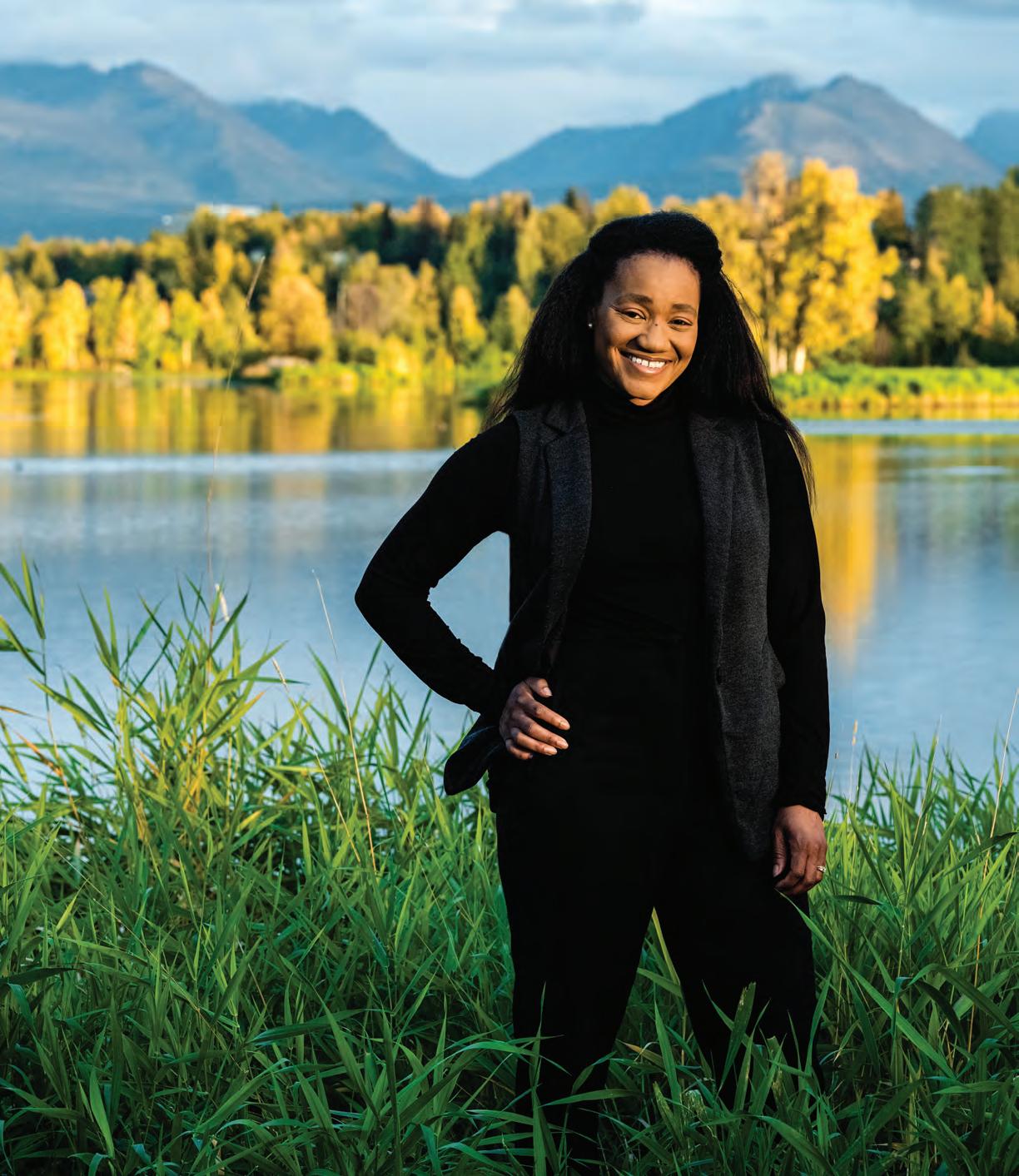
VITA 78 U VA LAWYER | Fall 2021 2022
DELAWARE SOFTBALL STAR GOES TO BAT FOR NATIVE-OWNED CORPORATIONS
FORMER
Canfield is a partner in the Anchorage office of Stoel Rives, a large regional law firm with nearly 400 attorneys. She is a mergers and acquisitions specialist, with a wide and diverse practice that includes advising smallto medium-sized businesses, and handling debt and equity financings. But her work with Alaska Native corporations adds an unusual dimension and purpose to her work.
Alaska Native corporations were created in 1971 by the Alaska Native Claims Settle ment Act, or ANCSA. It divided the state into 12 regions, each of which has its own privately owned, for-profit corporation to which all qualifying Alaska Natives belong. ANCSA also created more than 200 village corporations. Much of the revenue these corporations earn comes from natural re sources, but they can invest it anywhere.
And, by all accounts, they have a lot to invest. In 2020, the three largest regional Native corporations each had revenues of well over a billion dollars. Those regional Native corporations also comprised 18 of the 20 largest businesses in the state by gross revenue, according to Alaska Business mag azine.
Big or small, they all need legal and busi ness advice to help them diversify, which Canfield and her firm provide. To pick just two examples, in 2020 she represented Afognak Native Corp. in its acquisition of Brown Jug, the largest retailer of liquor, beer and wine in the state. The purchase helped Afognak diversify its commercial business
Andrea Canfield ’14
portfolio and provide a new revenue stream for its Alaska Native shareholders. She later represented a subsidiary of Bristol Bay Native Corp. in its acquisition of all the assets of several fuel and lubricant distribution companies based in the Pacific Northwest.

As merger and acquisition attorneys, “we specialize in acquiring and divesting assets, but we also manage transactions to get to closing,” Canfield explained. That can mean anything from preparing contracts to con necting representatives of the Native cor porations with tax, labor or intellectual property specialists in her firm.
OUTSIDE OF HER WORK for Alaska Native cor porations, Canfield has also been part of a team working on a restructuring deal for a huge ranching group operating in 15 states, and another representing a biofuels company based in Minnesota. In 2014, she assisted Atlantic Tele-Network Inc. in its $64 million asset acquisition of Green Lake Capital, which owns solar power systems in Mas sachusetts, California and New Jersey.
Hailing from Eagle River, a small com munity just outside Anchorage, Canfield earned a scholarship to play softball at Del aware State University. She graduated in three years, majoring in political science with a minor in business administration, and used her final year of athletic scholarship eligibility to obtain an MBA.
At UVA Law, she was the community service chair for the Black Law Students
Association, served as digital editor of the Virginia Journal of International Law and— naturally—played in the North Grounds Softball League. But her best experience, she said, came in the spring of 2013, when she and a group of five other BLSA members traveled to Freetown, Sierra Leone, for eight days to provide support to the legal com munity in that country.
When it came time to pick a place to build her legal career, Canfield says she and her husband were torn between Alaska and Mas sachusetts, where their families are located. Alaska won out, of course, and Canfield has been at Stoel Rives ever since.
Seven years after beginning her legal career, Canfield became the first associate to be promoted to partner in her firm’s An chorage office, which has been open since 2010. At the time of her promotion, she was the youngest partner at the firm. Though she has traveled the country and the world, Canfield always knew she wanted to do the kind of work she is doing.
“I was fortunate enough that I found the specialty that I wanted to practice, and I went straight for it,” she says. “It’s something that I tell folks who are coming out of law school. It helps when you know what you want to do, and you focus on that practice area.”
VITA Fall 2022 | U VA LAWYER 79
—Mark F. Bernstein ’89
“I WAS FORTUNATE ENOUGH THAT I FOUND THE SPECIALTY THAT I WANTED TO PRACTICE, AND I WENT STRAIGHT FOR IT.”
CHUGACH PEAKS PHOTOGRAPHY
RAISED IN ALASKA, ANDREA CANFIELD ’14, TRAVELED EAST TO PLAY SOFTBALL AND COMPLETE HER EDUCATION, BUT SHE CAME HOME TO APPLY HER SKILLS TO BUILDING WEALTH FOR THE NATIVE-OWNED CORPORATIONS THAT NOW DOMINATE ALASKA BUSINESS.
FORMER LAW FIRM LAWYER IS BEHIND 2 OF D.C.’S HOTTEST NIGHTCLUBS

David Chung ’98
Adding Life to the Party
IT MUST HAVE BEEN A HECK OF A PARTY.
David Chung ’98 still remembers that Charlottesville blowout, which he organized at his apartment just a few weeks before graduation—the party which, in a sense, planted the seeds for his future career. Chung is behind two of Washington, D.C.’s hottest nightclubs, St. Yves and Abigail. But back in the spring of 1998, he decided to throw a bash and invite dozens of other University of Virginia grad students—pretty much at random—to join him.
In law school at UVA, Chung, whose parents emigrated to the United States from South Korea when he was 2, had been active in the Asian Pacific American Law Students Association. Equally relevant to this story, he had also been in a fraternity at Virginia

80 U VA LAWYER | Fall 2021
2022
Commonwealth University and thought it would be fun to have a party for all the Asian grad students in Charlottesville before ev eryone left town. So he went through a student directory, picking out anyone with a stereotypically Asian last name, and sent them an email. About 150 people showed up. “It was a great way for all of us to meet each other and learn where everyone was coming from and what their plans were after graduating,” he recalled.
A few months later, Chung joined the BakerHostetler firm in D.C. Like many young associates, he went out a lot after work, often with his friend and fellow UVA Law alum KiJun Sung ’94. Standing in a D.C. club one night, Chung and Sung thought, “We should open one of these things ourselves. It shouldn’t be that hard.”
With the insouciance of youth, the two spent the next few weekends riding their bikes around Washington hot spots looking for “For Lease” signs. They found a spot just off McPherson Square, less than two blocks from the White House; negotiated the lease themselves; turned to Sung’s sister, an ar chitect, to help them design the space; and maxed out their credit cards.
“When you’re young, the less you know the braver you are,” Chung laughed now.
Their first club, Daedalus, was a success. Located in a basement with no sign outside, it grew by word of mouth. Although Chung and Sung initially opened only on weekends (they both, after all, were lawyers by day), they soon found that there was enough demand to open throughout the week. They also dis
covered they could not run a successful night club as a hobby and got their firms’ blessing to pursue their ventures full time. They have remained business partners ever since.
Their next venture, the K Street Lounge, drew national attention by offering amenities, such as bottle service, that were common in nightclubs around the world but as yet unknown in Washington’s staid environs. Located in an office building at 13th and K streets NW—where Chung, ironically, had once been a summer associate upstairs—the K Street Lounge drew crowds to an area that had once been plagued by crime after dark and helped revitalize the entire neighbor hood, Chung has said.
IN THE DECADES SINCE, they have opened clubs in other parts of D.C., including Dupont Circle, Glover Park and Georgetown. Common to all has been an emphasis on gorgeous décor and high-end service.


“I want to be in the business of luxury, not commodities,” said Chung, a former member of the Law School Foundation’s Alumni Council. One of his two current clubs, St. Yves (which opened in 2017), offers caviar service and features a quartz-topped bar and a grand chandelier. The website Eater.com called St. Yves “a downtown stunner” and gushed over the “trippy, immersive light wall” at his other club, Abigail, which opened in 2018. The venues have also become beacons for celebri ties, including sports stars, movie stars and politicians.
From the low expectations and very loose structure he reveled in as a young entrepre
neur, Chung has become more formal. In fact, as he told Business Standard earlier this year, he now runs his clubs like a law firm. He holds weekly executive meetings with his top man agers to review old and new business and discuss what might be on the horizon. He emails, rather than texts. And Chung’s clubs have extensive employee handbooks that detail expectations for every aspect of the business.
“We like accountability, and we like trans parency,” he explained.
Two of his employees, a bartender and a DJ, have gone on to law school at UVA.
In some ways, the nightclub business has changed over the years. Offering valet service is less important, for example, as more people use ride-share services, and the ubiq uity of cell phones means that, unless the club is hopping all the time, patrons can easily coordinate with their friends and move on to another, more happening venue.
The COVID-19 pandemic was a big disrup tion for Chung, as it was for everyone in the service industry, but business is coming back. “We’re social creatures,” he reasoned, “and people want to be around other people. They’re tired of being isolated.”
Still, some things about nightclubs—such as the clientele—are eternal. “When you’re young, you want to have fun,” Chung said. “You want to escape from the 9-to-5. You want to meet people. You want to dance. And you want to get crazy.”

A man who once hosted a kegger for strangers in Charlottesville ought to know.
—Mark F. Bernstein ’89
VITA Fall 2021 | U VA LAWYER 81 Fall 2022
“WHEN YOU’RE YOUNG, THE LESS YOU KNOW THE BRAVER YOU ARE.”
FromCorporate Lawto Treating Cancer
Eric Broyles ’95
Broyles is the founder and CEO of Nanocan, an early-stage biotechnology company devel oping new ways to treat cancer. Nanocan holds the worldwide rights to a nanoparticle-sized drone that can carry slow-release immunotherapies to hard-to-reach cancer tumors and may have implications for Alzheimer’s and Parkinson’s diseases. The technology is currently in the early phases of clinical trials, and Broyles is arranging for developing countries to have affordable access to the treatment mode.
Nanocan is Broyles’ third startup since leaving his 10-year career as a corporate lawyer at Skadden Arps in Washington, D.C., and at AOL. He also owns ExpertConnect Litigation Support, which provides expert witnesses to American Lawyer 100 firms and Fortune 500 corporate legal departments.
“If I invest in a thing, I want to know how it will impact someone’s life,” he said. “My expert witness business impacts my friends in the legal community, including law school classmates and the people I practiced law with, by removing a friction point for them by finding experts. So that’s important to them.”
Broyles first dipped his toes into entrepreneurialism while still at Skadden, by investing $5,000 in a friend’s startup that ultimately grew into a billion-dollar enterprise. As that company grew, so too did Broyles’ ability to take new business risks—or “swing for the fences,” as he put it.

“For me to be fulfilled, I was willing to take the risk that I might not make as much money as at a firm versus trying my hand at entrepreneurship, where I could be more creative,” Broyles said. “For my first 10 years as an entrepreneur, it was very intrinsically rewarding, not so much financially. But what I eventually learned through persistence is that in business it only takes one hit.”
He’s maintained his investments in his friend’s firm and other early investments he’s
JULIA DAVIS
made but branched into health care about 10 years ago. As he pursued other health care investment opportunities, he met Professor Wil Ngwa, who was then a professor at Harvard’s medical school and held patents on the medical drone technology that would become Nanocan. (Ngwa is now a professor at Johns Hopkins University.)
Broyles’ father had died from lung cancer 20 years earlier, so he had a personal inter est in helping bring relief to cancer patients and making it affordable for patients around the world.

Ngwa decided to partner with Broyles based upon their similar philanthropic in terests and he encouraged the Dana Farber Cancer Institute to license Broyles the world wide rights to the drone technology “because he figured he could trust me to make sure his invention not only serves developed markets but that it gets to poor people on an economic basis that reflects the market conditions in their country,” Broyles said.
A natural problem-solver, Broyles has enjoyed the myriad challenges that come with launching a biotechnology company in a competitive space with large incumbents and better funded early-stage competitor compa nies. With so many moving parts—including keeping abreast of the evolving science, regu latory and legal landscapes, and the financial and political challenges—Broyles said he’s grateful to have critical thinking skills from UVA Law to apply to solving this puzzle.
If the technology works as well as it has worked in animal studies, he said, “we will probably have effective treatments for several cancer indications, including prostate, pan creatic, breast, liver and lung cancer, and potentially glioblastoma.”
Broyles addressed UVA Law’s Class of 2025 at orientation this fall. He shared advice from his father, a former steelworker, and about his deep and rewarding friendship with a man who was profoundly different from Broyles (see p. 10)
—Melissa Castro Wyatt
82 U VA LAWYER | Fall 2022
ERIC BROYLES ’95 LIKES SOLVING PUZZLES, AND THERE MAY BE NONE MORE COMPLEX THAN CURING CANCER.
ORIENTATION SPEAKER BUILT THE RESILIENCE TO TAKE BIG RISKS
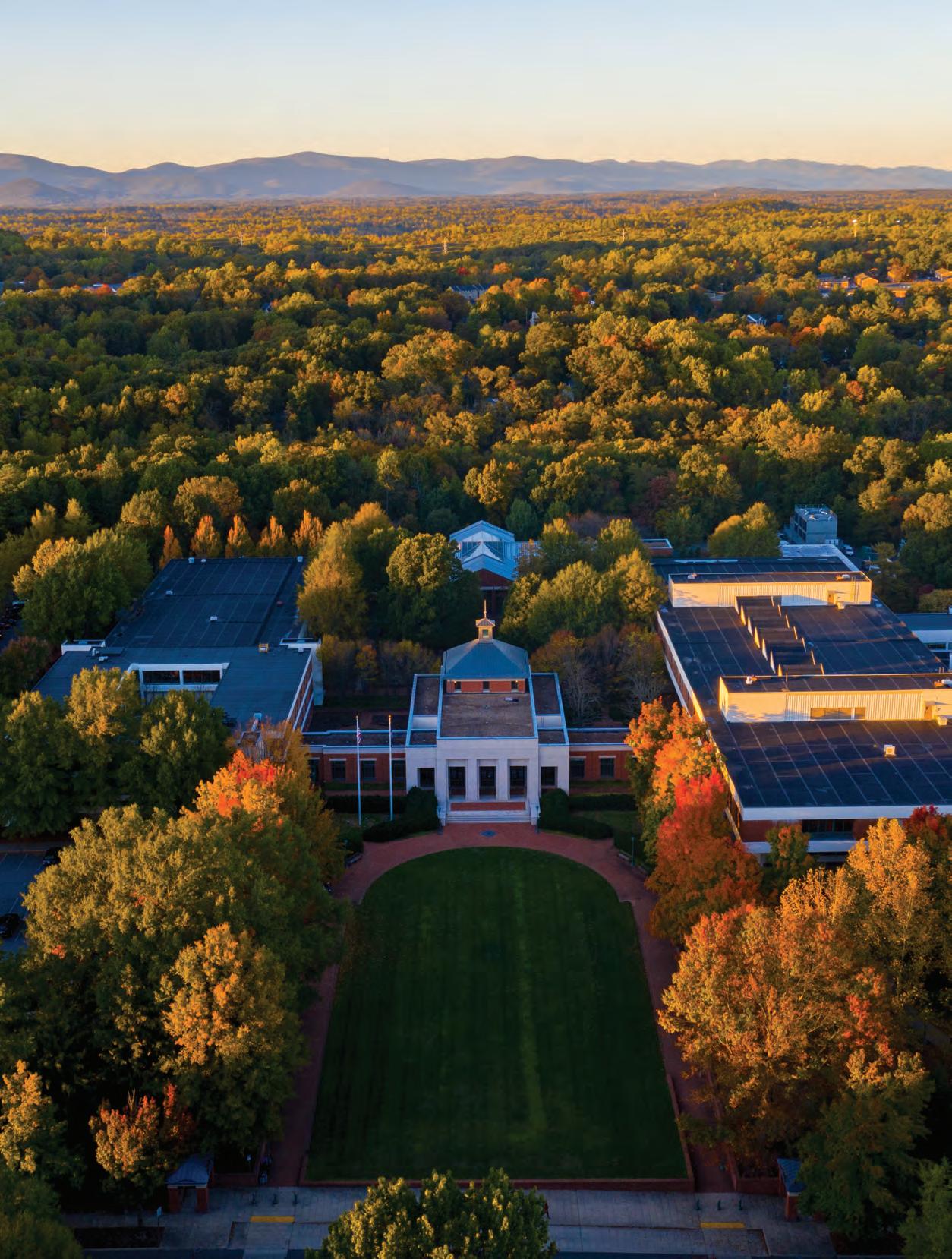
ROBERT LLEWELLYN ClassNotes
CLASS NOTES
SUBMIT A CLASS NOTE
EMAIL alumni@law.virginia.edu
MAIL UVA LAWYER
University of Virginia School of Law 580 Massie Road Charlottesville, VA 22903
Please send your submissions by Feb. 1, 2023 for inclusion in the next issue.
1954
ROBERT N. ROBINSON died May 17 in Char lotte, N.C. He prac ticed all his life with the North Carolina bar. He never retired, kept his license active and stayed current on con tinuing legal education.
His family noted that Robinson’s love of the law and his degree from UVA were some of his most cherished pos sessions. He was buried with his UVA hat on his chest.
Robinson spent his entire career in Char lotte, preferring to be a sole practitioner. He was well known in his specialty, bankruptcy, with many high-pro file cases, and prac ticed from New York to Florida and into South America.
Robinson’s family said they believe he may have been the only attorney in the city of Charlotte who never sent a bill to a client. He was not in it for the money and assumed people would pay him what they owed him.
1958
BY LARRY GRIM CLASS SECRETARY
jlawrencegrimjr@ gmail.com
JIM ATKIN wrote, “My granddaughter gradu ated from UVA Law School this year. In doing so she followed her father, Class of 1985, and her grandfather. I have [been] retired for 20 years and find that the world is full of good people (except for a few evil ones) and the future looks lovely once the corrupt gov ernments on the planet are eliminated. Hope to stay around to see if it happens.”
BILL BUNTING called after the spring ’22 notes came out to correct my error claiming HOBART MCWHORTER was a battery commander for artillery forces in Hok kaido, Japan, during World War II. It was the Korean War, not WWII, obviously. Bill and I had a fine long chat in which he reported he may be the largest prop erty owner on Nassau Street in Princeton, N.J., except for the univer sity. He says he goes to his office daily. Kathy and I hope to accept his invitation to drop by when we return from Stone Harbor, N.J., to Perkasie, Pa.
past couple of weeks. There have been 17 or 18 positive tests of COVID … which re sulted in total lockdown of the floor … I’m told if there are no new posi tive cases [soon], things will open up. I sure hope so. I’m set for jury trial on Aug. 8. I would hate to see COVID or mon keypox get in the way. One District Court was shut down completely last week because of the number of positive tests among staff and jurors. And with all the courts trying to catch up on criminal cases, the civil dockets have suf fered. My case on the 8th is either the fifth or sixth setting for the case. I have my fingers crossed.” He later added: “The defense just raised the table stakes to about $600,000.”
the federal bench in Norfolk. Bob was a fra ternity brother when we were undergrads at UVA … .”
BILL GRIESAR’S first wife and mother of their three children died in 1994, but after “five years of wilderness” he married Jane. She was a professor of art when they met and still does some teaching today— including schooling Bill about art history. She wrote this about how they met:
a bit of time in France for art history research, and as Bill and I were leaving I took him by the shoulders and gave him one of those left-cheek, right-cheek pecks that is the French equivalent of shaking hands common in the U.S. today, that simply was not done here among us older folks in 1998, but Bill re covered nicely.
WANT TO BECOME A CLASS SECRETARY?
CONTACT alumni@law.virginia.edu if you would like to help collect class notes from your class.
NATHAN CHERRY ’07 read our spring notes and complimented the “How-We-Met” stories! How many times, Dear Reader, do you read class notes from a class not your own? (FYI: Nathan added, “I met my wife, MELISSA (MC WILLIAMS) CHERRY ’09), when I was a 3L and she a 1L (at the Dan delion Parade no less). We practiced in D.C. for a time and then I went back to school... Darden … began a new career in energy invest ment across London and Houston. We have three kids, 11, 9 and 6.
DAVID CARTER, who left our class before we graduated for an excit ing career in London, wrote: “I’ve been in the United Kingdom for 50 years, have four children either currently em ployed or finishing off their formal education. Thankfully the Carter gang live just miles from me and keep me amused and out of trouble. Life is pretty good … despite a few political problems that are fascinating and troublesome!”
Vickie Cooper says: “I am up in Maine at our camp on Long Lake near Bridgton. I have many wonderful memories of vacationing with LEN [COOPER] at this camp that has been in his family since the 1940s.”
BILL EDWARDS: “Things have been rough for the
WALTER JERALD FORD reminisced about BERT SACHS’ recent death. “He was such a great friend and always full of life. He was just a good person to be around, and he was the perfect judge. For many years Bert, JACK CLARKSON and I met every month at our regional judicial meeting. It was some thing I looked forward to. I got to know Bert’s lawyer son who had the same wonderful per sonality as his dad. I never heard Bert speak ill of any living soul and he was one of the most entertaining persons I have ever known. I prac ticed law before ‘Judge Bert’ when he was in the District Court and lis tened to many cases he ruled on before he got to my case. He got all of them right. I stayed a while to say hello and he said he was constrained not to call me Jerry— rather than Lawyer Ford from the bench. I sat in the Norfolk Circuit (Virginia) a lot as a visiting judge, and we had several of our classmates who prac ticed in the area appear on our docket. It was a fun time. We also had BOB DOUMAR ’53 on
“Fall 1997. I was a professor of art history at Hunter College and taught an honors course with a colleague from the history depart ment—she handled the politics, I covered the painting, sculpture and architecture. She was married to a scientist, who among other things had totally bizarre ideas about the development of Egyptian culture. He did, however, have con nections to Rockefeller University.
“Just before Christ mas, my colleague called me from JFK [airport] to say that she had given my phone number to Bill Griesar, who was serving as general counsel at Rockefeller. ‘He’ll probably call you after the holidays,’ she said, ‘but if he doesn’t, you should give him a call. He is definitely a keeper.’
“Bill called after the New Year, but I was leaving to spend a week in Aruba with my daughter Katherine. I can’t remember who called whom when I got back, but Bill and I ar ranged to have dinner together in Manhattan. He was then living in Dobbs Ferry, and I was on East 87th Street. We met at a restaurant on Madison and 70th—I don’t remember the name, but I do recall a lovely, relaxed dinner with a man of great charm. We agreed to get together again, but as we were parting I made a nearly fatal mistake. You see, I’d spent quite
“We dated through the spring, but both of us went traveling that summer. Bill took a walking tour through the Czech Republic with his son Bill, and I spent the summer in Paris with my daughter Kat. Newfangled email had come into use, so we were able to keep in touch, and when we reconnected in the fall, Bill and I knew a lot more about each other. When we decided to get married, we turned to one of Bill’s friends and former colleagues, who had become an Episcopal minister after he retired—he always joked that he embraced the ministry to atone for the sins committed while practicing law. He married us in Connecti cut on June 10, 1999, and we had a reception at the UVA Club in NYC.
“Summer 2022. We share four children and five grandchildren, and we’re the opposite of snowbirds, whatever that’s called. We spend the winter months in White Plains, N.Y., and head north to Chamber lain, Maine, around midMay, usually staying there till mid-Septem ber. Back in 1976, Bill had the astounding fore sight to buy a house on the Maine coast, and though it’s since been updated and expanded, it maintains its cottage simplicity.”
Griesar preceded Grim alphabetically and academically from when we entered the UVA College in 1951 through law school. No one ever came between us al phabetically. I first saw his name on the dean’s list in the spring of 1952
CLASS NOTES 84 UVA LAWYER | Fall 2022
when mine made a rare appearance. I learned much of his youth was spent in the Naples, Fla., area where my lady, Kathy O’Dea, and I live. Kathy, like Bill’s wife Jane, has a serious in terest and background in art. So, your secretary has asked Kathy to offer her tale of how we met:
“I always loved learning and school. A full scholarship to the College of New Jersey followed with earning a M.S. at the Univer sity of Pennsylvania gave me the creden tials to spend many happy years teaching. Along the way I met my future husband, John P. O’Dea (Jack). …
“I developed an in terest in art, began modest collecting and developed a friendship with a master-gilder/ framer, Peter Crafts. I was accepted as a student in the Barnes Foundation to study art in their fabulous collec tion and began, arguably, the best phase of my ed ucation. Then, suddenly, Jack died at 58 of a totally unexpected heart attack and our world was upside down.
“I was able to raise our teenage children alone. I continued to complete the two-year course of study at the Barnes Foundation and pursue more art creden tials at New York Uni versity and Bryn Mawr College. NYU was fo cusing on the study of and historic significance of frames. A Barnes teacher recommended that I go to an all-day art symposium on the art of Bucks County, Pa., at the Berman Museum at Ursinus College in Col legeville, Pa. So, on June 6, 1998, at 8:30 a.m., I entered the museum and saw on an easel a painting of a snow scene and man in a blue blazer and bow tie. Curious, I strolled up, listened and found the man had just purchased the picture from a lady in her 80s who was telling its origin. … The frame on the picture was not ap
propriate. The artist was [the well-known Penn sylvanian impressionist] Walter Emerson Baum. I chimed into the con versation, then suddenly thought to say: ‘Excuse me, am I interrupting a private conversation?’ I was welcomed to stay. Then a whistle blew, sig nifying the start of the symposium in a class room. On the walk to it, I tagged along with the man in the bow tie and found his name was Larry Grim. I asked what he did and he said ‘gardener,’ and conspicu ous dirt under his fin gernails backed that up.
“The first of the four lectures at the sym posium was given by Missy Saxton, [who had a] Harvard Ph.D., on Baum, whose work was on display throughout the museum. She was articulate and fascinat ing. At the break when she finished, I bought the biography she wrote on Baum before I found out the artist was Larry’s grandfather. The next lecture was on Walter Elmer Schofield, another impressionist artist. I was sitting next to Larry during the lec tures and we chatted, then separated.
“I went into the very crowded lunchroom and put my backpack on the chair besides me. A little while later, Larry appeared, looking for a seat. By that time, the only one left was under my backpack. So, I invited him to join me. I asked what he was going to do with the frame on the paint ing he’d just bought. I suggested it could be improved by switch ing to one of the famous Bucks County frame makers and named a few. After lunch, I sug gested looking at it and some of the other frames on paintings in the museum; it became clear Larry knew or cared little about frames. But, Suzanne Smeaton, a frame expert from Eli Wilner of New York, the first afternoon lecturer,
woke him up with slides and accounts of frames and framers for Penn sylvanian impressionist art. She dwelt at length on the Bucks County framers I’d mentioned. He was so impressed, by the end of the day, my ‘fine art consultant’ card was in his pocket and I was ‘hired’ to inspect his collection and make suggestions on frames.
“We met a few days later. I saw his collec tion and met his wife, Nell. Later, he traveled to Stone Harbor and we met Peter Crafts as we debated frames. This was purely a business opportunity for me. I earned the business-like nickname of ‘Framing Lady’ and his interest in and spending on frames increased dramatically. Sometime later, for reasons and causes ex isting before my arrival, Larry and Nell divorced. He shopped for a house and found one not far from the Bay Pony Inn, in Lederach, Pa. It was on a hilltop overlooking a park and the Perkio men Creek. He bought it and hired an architect to expand it. Art galleries were added with ample garages and storage space.
“Meanwhile, I had some health issues that put me in the hospital. Larry provided comfort in addition to what I re ceived from family and friends. I spent much of my recovery time in his new house, deco rating it with a passion. Three years later I sold my home in Wayne and moved into Larry’s house. Then we were able to combine the rest of our art and furniture.
“The house became a mecca with our com bined art. I enjoyed the dream of living with wonderful art. We en tertained a lot, includ ing boards of directors at the Berman, where I became active (and still am) and of the Baum School of Art in Al lentown where Larry was active. He also served two terms on the James A. Michener
Art Museum board in Doylestown. My daugh ter had her wedding there.
“At 85, Larry retired, we sold that house and moved to a condo in Naples, Fla., where, in our 24th year, we live in winter, return ing to Stone Harbor in summer. Both are filled with as much of our art as possible. Our mutual interest in art has made our life fun and it has been a luxury to be sur rounded by it.
“It has been a full, interesting and always challenging ride with Larry. I have been so blessed (or, Larry says, cursed).”
GEORGE HARRIS wrote: “As the comings and goings of children and grandchildren seems if not written in stone, then at least confirmed by all involved. ... Pres ently recovering from COVID. Not the same in our age bracket as what I hear from the younger generation.”
Here’s a note from JOE HILTON: “… am still working in real estate. My wife still works in interior design and my granddaughter has been admitted to Duke. My first daughter is a successors residential broker and my second has her Ph.D. in child psychology. One grand son is finishing high school. Cheers.”
I asked DOUG MACKALL about his commuting friendship with a lady from my daughter’s backyard [wedding] and, alas, got: “My friend [Emily Slingluff] from Virginia Beach died in January, after being courted 18 years. At 91, I am on the lookout again. C’ville is a wonderful place to retire. Espe cially when you have season football, basket ball and women’s bas ketball tickets. Come on down!”

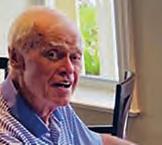
Ellen McWhorter wrote from Alabama: “I am learning to live on my
own and still missing my better half a lot. Cooking for one is not the same, especially when HOBART [MCWHORTER] was such a good eater! I am going to visit friends in the North Carolina moun tains next week and look forward to cooling off there. I now have two great grandchildren and expecting a third in October. Hobart did not get to meet young Hobart Amory King Jr. He would have been so proud!”
TOM OTIS belongs or be longed to every impor tant fine club in Massa chusetts, so I asked him about the Somerset Club in, Beacon Hill, Boston. He replied: “I have never been a member of the Somerset Club, but it has a splendid reputa tion. I do know the food is excellent. You will be comfortable there …”
BEN PHIPPS and JJ command: “Fall visit to [Tallahassee] is manda tory. Late fall or mid winter? ... You all stay in our (JJ’s) downtown pied-a-terre. I’ll conduct a tour of the ‘other Florida,’ with hills and Spanish moss.” We will comply!!!
“On a snowy, sunny Saturday morning in 1958, I was eating breakfast at the home of my beau, Chuck, when into the kitchen walked Ted Torrance. Ted and Chuck were old boyhood friends and unbeknownst to me, Chuck had invited Ted to be a guest at the ski house we had rented with a bunch of pals at Mount Snow, Vt., for the winter.
“After breakfast, the three of us piled into the car, all three in the front seat, and headed for the mountain. The skiing was wonderful, and afterwards back at the house dinner, long charades games and drinks were a blast.
“The ski house had some eccentricities, including a shower in the kitchen, as well as a player piano. There’s an old saying, ‘They always fall for the piano player,’ and I was no exception. Not only could Ted play the player piano, but he could also play very well himself. I loved it. As the winter wore on, several of my ongoing romances faded and Ted became ‘the one.’
TED TORRANCE, our most highly revered secretary emeritus, has called his wife, Connie, “long-suffering” fre quently in the past and indeed it is apt today as she must, in his words: “push around all the nurses, docs, etc.” at tendant upon him as he fights his battles with imbalance and dizzi ness. Connie is remark able in that she has su perbly decorated their lovely digs on North Hutchinson Island in Vero Beach, Fla., and taken the time to craft this account of how they met:
“Skiing showcased one of Ted’s finer qualities—patience. The only skiing I had done had been on neighborhood hills as I was growing up, and I found real mountains a bit challenging. You couldn’t just point your skis downhill and let go on the mountain. I didn’t even know how to snowplow or do proper turns. However, with time-consuming patience, Ted got me going and we continued skiing for many years.
“Fortunately, skiing wasn’t the only thing we enjoyed together; we found we shared a number of common interests, friends and particularly the outof-doors. In October of 1960 we married, and now, 61 years later, we continue living happily ever after.”
CLASS NOTES
100 Fall 2022 | UVA LAWYER 85
HENRY WILLIAMS’ widow Barbara Dimmick is “so
IN MEMORIAM: DAVID H. IBBEKEN ’71, LONGTIME LEADER OF UVA LAW SCHOOL FOUNDATION

DAVID H. IBBEKEN ’71 , who led the Law School Foundation for 28 years and continued to work there as president emeritus, died June 27 after a battle with cancer. He was 80.
Ibbeken retired as president and CEO in 2007, but in all spent more than 40 years working at the foundation.
“In his many years of service, Dave turned the Law School Foundation into a professional fundraising effort. We are still building on his legacy in its remarkable success today,” Dean Risa Goluboff said. “He also led with a gentle spirit that touched colleagues and the many other people he con nected with over the years. I am so grateful for his friend ship and leadership. He was one of a kind, and he will be missed.”
Under Ibbeken’s watch as president, the foundation’s endowment grew from $5 million in 1979 to more than $300 million when he stepped down. Begun as a trust in 1952 and incorpo rated in 1968, the founda tion receives and manages private gifts from alumni and friends for the benefit of the Law School, providing more than $30 million each year to the school’s operating budget.
Raised in Haddon Heights, New Jersey, Ibbeken played on the football team as a student at Princeton. After college he served as a lieu tenant in the Army Field Artillery during two years of active duty and later as a captain in the New Jersey National Guard. He coached football and taught at Mercersburg Academy in Pennsylvania, and married and started a family with his childhood sweetheart, Sunny, before turning to law school.
“I think my thought was that a law degree could be helpful in any direction you would go. And that in the end, it has proven to be so,” he said in an interview in August for a story marking his 80th birthday for UVA Lawyer.
To help make ends meet in law school, he worked as a student assistant for Admissions Associate Dean AL TURNBULL ’62 and as a research assistant for Professor Mason Willrich.
After law school he worked as general counsel for a title insur ance company while also teaching a night course to real estate agents at Rutgers University. Then, in 1979, UVA Law Dean Emerson Spies made a job offer that appealed to all of Ibbeken’s interests—leading the still-new Law School Foundation, teaching real estate law (which he would do for 13 years), and helping the Admissions Office.
At the foundation, Ibbeken built a new reunions program
and volunteer structure by convincing the foundation’s Board of Trustees that staff, rather than alumni volunteers, should be primarily responsible for fundraising and the affairs of the Alumni Association.
In 2002, his Law School classmates gathered gifts and pledges to establish the David H. Ibbeken ’71 Research Professorship, which was announced at the class’s 30th reunion as a surprise to Ibbeken. The gesture was meant to recognize his role in the classroom from 1980-1993 in addition to his work at the foundation.
Ibbeken was co-founder and past president of the As sociation of American Law Schools’ Section on Insti tutional Advancement. He was a former member of the Planning Committee for the American Bar Association Section on Legal Education, Law School Development Conferences.
He received the J. William Elwin, Jr. Award, given by the Development Committee of the ABA Section on Legal Education to recognize out standing lifetime achieve ment in law school develop ment, in 2005. In celebrating Ibbeken, the committee said he was “known for his hu mility, lack of ego, and gen tlemanly comportment” and was “a consummate profes sional [who] guided the Law School through the largest, completed Capital Campaign in the history of legal educa tion thereby setting a stan dard for all.”
In the UVA Lawyer in terview, Ibbeken said when he looked back on his work, he most remembered the people he worked with and the graduates with whom he engaged.
“It gives me great pleasure to reach out to alumni and to be in periodic contact with them, either in person or through email or by phone,” Ibbeken said. “My work revolves around building and maintaining relationships.”
Ibbeken took care to pass on his knowledge to others, particu larly foundation staff. LUIS ALVAREZ JR. ’88, who succeeded Ibbeken as president and CEO, said, “Dave set the tone for how we do business. Service, integrity and civility were Dave’s values, and they remain ours.”
Ibbeken is survived by his wife, Sunny, and their children, G. DAVID IBBEKEN ’00 and Suzanne E. Ibbeken, among other family and friends. A memorial service will be held at the Law School on Nov. 11 at 4 p.m. in the Purcell Reading Room.
—Mary Wood
CLASS NOTES 86 UVA LAWYER | Fall 2022
JULIA DAVIS
glad we came up with the idea of how-we-met stories! They read like a treat and add ‘some romance’ and in all cases a sense of joy in life!”
She adds: Henry reports that he “was happiest on a sailboat; water was his natural environment. So, I am having the fol lowing put on the back of his headstone. It’s from “The Wind in the Willows.” He would have loved it! He loved humor.
“Believe me my young friend, there is nothing— absolutely nothing—half so much worth doing as simply messing about in boats.”
—LARRY GRIM, (215) 896-1120 jlawrencegrimjr@ gmail.com
in 1990 and is now an emeritus director.
1966
Although retired from the federal judiciary, PAUL MICHEL maintains a full schedule of con sulting, mediation, arbi tration and moot courts in intellectual property law, the federal circuit court’s specialty. Michel publishes dozens of ar ticles each year to inform policy and policymakers.
1967
RONALD W. DOUGHERTY received the 2021 Clayton G. Horn Award of Excellence for his decades of service to his hometown, Canton, and to Stark County, Ohio.
Returning to Canton after graduation, Dougherty became a community fixture over the next 60 years. In addition to his legal practice with Krug liak, Wilkins, Griffiths & Dougherty, where he served as managing partner for 17 years, his efforts spanned a broad range of organizations and agencies.
Dougherty helped with United Way cam paigns, Pro Foot ball Hall of Fame fes tivals and Canton Regional Chamber of Commerce projects, as well as leading the Canton Jaycees when it had more than 500 members.
Dougherty served the city as an assistant so licitor for several years during the 1960s. He held a seat on the Stark County Board of Elec tions. He served as a di rector and member of the executive commit tee of the Pro Football Hall of Fame beginning
1960WILL MACHT died peace fully March 15 at his home in Vancouver, Wash., surrounded by his partner Sylvia Skarstad and his sons, Marlow and Madison. He was 80.
Macht was born in Syracuse, N.Y., in 1941 to Milton Macht and Sylvia Smith Macht. He grad uated from Deerfield Academy and Princeton University’s School of Public and International Affairs before attending UVA Law.

Macht began his career as an assis tant counsel, first to U.S. Sen. Jacob Javits and then to Sen. ROBERT F. KENNEDY ’51 While with the U.S. Treasury he worked with international de velopment banks. He then became interna tional counsel for the Gates Corp. in Denver. Macht shifted his focus from international to national development when he became the development director of the Rouse Co. At the time, the company was building the new city of Columbia, Md., between Washington, D.C., and Baltimore.
Several years later, Macht and his wife,
Marieluise Vogt Macht, moved to Hood River, Ore., and raised their family in a former schoolhouse built in 1910. Sensing the po tential for mixed-use development of Hood River’s extensive wa terfront, Macht was elected port commis sioner. He was involved in numerous land de velopments in the Hood River and Portland areas. When Diamond Fruit closed its cannery, he championed the port’s purchase and redevelopment of its 800,000 square feet of buildings on 20 down town blocks. Macht urged the city to form an urban renewal agency that included the entire downtown, and he became one of its first members. Later, his company was se lected by the Vancou ver Area Development Authority to manage the adaptive reuse of its historic Officer’s Row.
He proposed a bistate, federally chartered Co lumbia Gorge Develop ment Bank, which drew heavy support from the region’s congressional delegation. He also ad vanced alternative solu tions to reuse the Me morial Coliseum and to provide sustainable Co lumbia River crossings.
In addition to his work in urban devel opment, Macht taught throughout his 44-year career at both Port land State University’s College of Urban and Public Affairs and the University of Oregon School of Architecture. His interests included urban real estate devel opment, public-private partnerships, micro politan development, retrofitting suburbia and competitive devel opment workshops. He published more than 200 articles in profes sional journals and books.
Outside of his pro fessional achieve ments, Macht pursued his passion for cre ative design, building mobiles and crafting
sculptures. He also lis tened to classical music, swam, and was an avid reader and writer of history. He wrote ex tensively of his fam ily’s history to ensure that the value he placed on education, engage ment in public welfare and dedication to family would be passed on to future generations.
drafting committees, including the com mittee to revise the Uniform Common In terest Ownership Act and the drafting com mittee on the Uniform Electronic Legal Material Act.
1969KARL W. BOYLES JR. was honored by the Florida Bar for 50 years of membership. Honorees were recognized at a luncheon in June.
DAVID D. BIKLEN, past executive director of the Connecticut Law Revision Commis sion, chaired the draft ing committee for the Uniform Unregulated Child Custody Trans fer Act. Drafted and ap proved by the Uniform Law Commission in 2021, that act has now been introduced in several state legisla tures and enacted in Utah and Washington.
The act highlights the lack of regulations around child custody transfers. Some parents find that after birth or adoption, they ex perience considerable difficulty or even in ability to care for their child. This sometimes leads families to trans fer the child to a person outside of the courts and the child welfare system. Without spe cific regulations, a transfer of custody goes unnoticed in the child welfare system and places the child at risk.
The act highlights different types of support available to these families to reduce the need for unregu lated transfers.
Biklen has been a member of the Uniform Law Commission since 1982 and was elected a life member in 2009. As a Connecticut commis sioner, in addition to the transfer act, he chaired the drafting commit tee on the Uniform Real Property Electronic Recording Act, which has now been enacted in 38 states. Biklen has served on several other
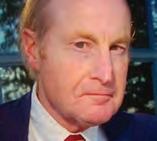
J. WILLIAM LEWIS’ debut novel, “The Essence of Nathan Biddle,” was among the winners of this year’s Feathered Quill Book Awards, which cele brates excellence in book publishing. The book was heralded as a time less, sweeping tale that unfolds on the Alabama coast in the 1950s.
1970
KENNETH M. GREENE of Carruthers & Roth in Greensboro, N.C., was named to the North Carolina Bar Associa tion’s Legal Practice Hall of Fame. The Hall of Fame recognizes out standing lawyers whose careers have served as models for other legal professionals by exhib iting the highest stan dards of ethics, profes sional competency and service to both the bar and the community.
1971
RICHARD J. BARRON, C. DEMING COWLES IV and WILLIAM D. TUCKER III were honored by the Florida Bar for 50 years of membership. The honorees were recog nized at a luncheon in June.
In April, retired Supreme Court of Penn sylvania Chief Justice RONALD CASTILLE took part in a workshop with the North Ameri can Judicial Consulta tion on Environmen tal Constitutionalism and the Environmen tal Human Rights De fenders subcommittee at the United Nations. Castille presented on Pennsylvania’s consti tutional amendment on environmental rights. The workshop focused on supporting, facilitat ing and expanding ju dicial consideration of environmental rights and legal protection of the lives and safety of those who defend envi ronmental human rights under constitutional and related laws.
MICHAEL R. FONTHAM was recognized in Cham bers USA for his work in energy and natural re sources. Fontham prac tices with Stone Pigman Walther Wittmann in New Orleans.
GILBERT E. “BUD” SCHILL JR. retired from McGuire Woods and is working on his second book, “Not Exactly Rocket Scien tists II: The Totally Un necessary Sequel,” coauthored by JOHN W. “MAC” MACILROY ’74 and Robert D. “Rob” Hamil ton III. The Law School is featured in one of Schill’s stories, “Ida’s Bar & Grill.”
1972
JAMES A. BLEDSOE JR., EDWARD E. HADDOCK JR., WILLIAM V. LINNE, ROBERT L. RHODES JR. and ROBERT A. SUGARMAN were honored by the Florida Bar for 50 years of membership. The hon orees were recognized at a luncheon in June.
GEORGE HOUSE was rec ognized in Chambers USA in the area of en vironmental law. House
CLASS NOTES 100 Fall 2022 | UVA LAWYER 87
practices with Brooks, Pierce, McLendon, Humphrey & Leonard in Greensboro, N.C.
1974
JOHN MACILROY’S col lection of eclectic short stories, “What ever Happens Probably Will,” was edited by the acclaimed writer T.D. Johnston. Several of the stories have received recognition, including as finalist in the 2021 Coker Fiction Fellowship and winner in the Amy Munnell competition. The collection was also named finalist in this year’s International Book Awards in the fiction short story category.
MacIlroy shared a backstory connec tion to UVA Law. “BUD SCHILL ’71—my lifelong friend, and a great friend of the Law School— was really the guy who awakened the ‘sleeping writer’ in my own retire ment when we collabo rated on ‘Not Exactly Rocket Scientists and Other Stories,’” MacIl roy wrote. “That book is a collection of zany and ‘mostly true’ stories about our youth,” which is being followed up with a sequel.
1979
On the advice of the British secretary of state for foreign and common wealth affairs, Queen Elizabeth II appointed FRANK MORGAN as an honorary member of the Most Excellent Order of the British Empire (MBE). The honor was conferred in recogni tion of Morgan’s services to British charities in New York.
nia’s Trademark Prose cution and Strategy, and California Trademark Enforcement and Litiga tion. Grace is a partner with Loeb & Loeb in Los Angeles.
C. STEVE MASON was recognized in Cham bers USA in the areas of real estate and real estate finance. Mason practices with Smith Anderson in Raleigh, N.C.
1982
JACK ROSS continues to teach courses on con stitutional law and the Supreme Court and fa cilitate a Supreme Court discussion group at As sumption University in Worcester, Mass., calling it a “pleasant diver sion” from his career as a tax lawyer in Washing ton, D.C. Ross returns to Charlottesville regularly to visit his father and son (UVA ’15).
& World Report consis tently recognizes Wa terman Law Centers as a Tier 1 Metropolitan Best Law Firm for plain tiffs’ personal injury and medical malpractice claims. Waterman has no plans to retire.
1983
MARK DAVIDSON was recognized in Cham bers USA in corporate mergers and acquisi tions. Davidson prac tices with Brooks, Pierce, McLendon, Humphrey & Leonard in Greens boro, N.C.
the Cleveland office of Hahn Loeser & Parks. His practice focuses on representing and coun seling established and growth-oriented com panies in mergers, ac quisitions, divestitures, enterprise governance, financing and licensing issues, both domestically and internationally.
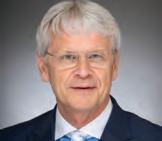
munities around the country.
AVERY TILLINGHAST
“SANDY” WATERMAN JR. has been listed in Best Lawyers in America for 17 consecutive years for two practice areas, plain tiff-side personal injury litigation and plaintiffside medical malpractice law. His Best Lawyers peers voted him “Lawyer of the Year” for three of the past four years and six of the last 10 for Southeast Virginia. He also has been named to Virginia Super Lawyers for 15 consecutive years and is a member of the Multi-Million Dollar Advocates Forum since 2010.
After 39 years of law practice in Virginia, PATRICK O. GOTTSCHALK retired as a partner from Williams Mullen in Richmond in July. Gott schalk served as secre tary of commerce and trade in Gov. Tim Kaine’s Cabinet from 2006-10. More recently, he served as chair of ChamberRVA, the greater Richmond area chamber of com merce, from 2018-19.
White, who lives in Russell Township, lec tures internationally on issues of global com merce and enterprise governance, delivering an annual series in subSaharan Africa, includ ing Zimbabwe, Zambia and South Africa. He also is the immediate past chair of the Trade Advisory Committee on Africa, a congressionally mandated committee ad vising the U.S. trade rep resentative on U.S. trade policy vis-à-vis sub-Sa haran Africa. He is also the immediate past vice chair of the International Senior Lawyers Project, an internationally ac claimed provider of pro bono legal services in developing countries in support of the rule of law and equitable economic development.
Hale leads the center after a career in corpo rate and nonprofit law. As a young adult in spired by the passion and involvement of his parents, Anne Shef field Hale and Bradley Hale, he took an in terest in history and historic preserva tion. After majoring in history at the Uni versity of Georgia and earning his law degree, he pursued a career as partner at Kilpatrick Townsend & Stock ton and later as chief counsel at the Ameri can Cancer Society. But he continued to develop his passion for history through statewide causes and organizations.
DAVID T. MALOOF was featured in the 2021 book, “Dooley Noted,” a collection of biographies of prominent Rhode Islanders. Maloof was featured for his work in promoting peace in the Middle East. Maloof spe cializes in international transportation law with Maloof & Browne in Rye, N.Y.
JEFF OLEYNIK was rec ognized in Chambers USA in the areas of an titrust and bankruptcy restructuring. Oleynik practices with Brooks, Pierce, McLendon, Humphrey & Leonard in Greensboro, N.C
1981
DAVID GRACE was recog nized as a leading lawyer in National Trademark Prosecution and Strat egy, as well as in Califor
After 32 years as a senior partner, Water man founded his own law practice in Williams burg, Waterman Law Centers, with offices in Newport News and Hampton, Va. U.S. News
CRAIG OWEN WHITE is the newest chairman of the board of trust ees of the Western Reserve Land Conser vancy, Ohio’s largest land trust. White manages
The Western Reserve Land Conservancy works on major conser vation, restoration and construction projects for the region.
1985
Atlanta History Center President and CEO SHEFFIELD HALE was awarded the Governor’s Award for Arts and Hu manities for his lifetime commitment to history and historic preservation in the state of Georgia.
Since joining the center in 2012, Hale has pursued landmark proj ects and initiatives, in cluding the move of The Battle of Atlanta cyclo rama to a newly con structed facility at the institution’s Buckhead campus and the creation of the Confederate Mon ument Interpretation Guide, which offered re search support to com
His civic involvement over the years includes, among other things, the Georgia Trust for Historic Preservation, Fox Theatre and Fox Theatre Institute, the University of Georgia Press, University of Georgia Jere Morehead Honors College and the National Trust for His toric Preservation. He also chaired the city’s advisory committee on monuments and street names associated with the Confederacy and as chair of the state’s judicial nominating commission.
Hale also plays an active role in com munity revitaliza tion efforts around Atlanta through the lens of historic preser vation. He received the Sweet Auburn Works Preservation Cham pion Award in 2016 and currently serves on the board of the organization.
& Wood. In 1994, he became an invest ment banker with A.G. Edwards & Sons, where he also spent time as an equity analyst. Later, Reynolds led the trust department of Midwest BankCentre before joining U.S. Trust in 2006. He then tran sitioned to JPMor gan’s Private Bank. In 2019, Reynolds became the executive vice president of Duncker Streett & Co., a wealth management firm. Reynolds supported and served on numer ous boards of chari table organizations in the community. He was a supporter and past president of Dance St. Louis. His classmate and longtime friend, BOYCE E. BRANNOCK , wrote, “Kent’s self-dep recating manner and keen humor equipped him as a masterful com municator who forged fast friendships and lasting memories.”
ELIZABETH CORR
SMEDLEY is currently living the semiretired life on a farm in Rappahannock County, Va., with her husband, Danny Smedley. Two adult children also live on the farm, Curt (with wife, Jill) and Emily. Her youngest son is doing an internship gap year with law school plans.
1986
KENT K. REYNOLDS of St. Louis died March 12. Following law school, where he served on the editorial board of the Virginia Journal of In ternational Law, Reyn olds began his career on Wall Street as a se curities attorney with Hawkins Delafield
DAVID J. TOSCANO wrote his second book on state politics, “Bell wether: Virginia’s Po litical Transformation, 2006-2020” (see p. 97) Toscano served seven terms in the Virginia House of Delegates’ 57th District until his retirement in 2020. He was the Democratic Leader in that body from 2011-19. Toscano’s Charlottesville practice specializes in family law and real estate.
CLASS NOTES 88 UVA LAWYER | Fall 2022
Maryland Gov. Larry Hogan named E. GREGORY WELLS chief judge of Maryland’s intermediate appel late court, the Court of Special Appeals, in Feb ruary. Wells is the first African American to serve as chief judge of the court and is the first openly LGBTQ person to serve as chief judge of either of Maryland’s appellate courts.

Wells has served on the court since 2019. Prior to his appoint ment, he was a judge on the Circuit Court for Calvert County, a judge on the District Court of Maryland for Calvert, Charles and St. Mary’s counties, and a master for domestic relations and juvenile causes for Calvert County. Wells also served as an assis tant attorney general in the Criminal Appeals Division of the Office of the Attorney General and was the first African American to serve as Calvert County state’s attorney.
and acquisitions. Goettel practices with Smith Anderson in Raleigh, N.C.

KATIE SCHWAB, manag ing director of Cozen O’Connor’s public strat egies group in New York, was selected as a recipient of City & State magazine’s Above & Beyond awards, rec ognizing women who exhibit exemplary lead ership in their fields and have made impor tant contributions to society in the sectors of business, public service, media, nonprofit and organized labor.
Schwab advises non profits, trade organiza tions and major corpo rations on how to build community support and navigate New York City’s complex regu latory, legislative and procurement systems. Prior to joining Cozen O’Connor, she served in city government across three mayoral adminis trations, and as deputy commissioner for com prehensive planning for the Nassau County Planning Commission. She also served as the director of government and corporate affairs for Cemusa, an interna tional street furniture and outdoor advertising company.

ALUMS ELECTED TO AMERICAN LAW INSTITUTE

LYNDA BUTLER ’78, ROSCOE JONES JR. ’03, MELISSA SAWYER ’00, JAMES Y. STERN ’09 and ANDREW WRIGHT ’00 were elected to the American Law Institute.
Butler is the Chancellor Professor of Law Emerita and director of the William & Mary Property Rights Project at William & Mary Law School. She was the 2019 recipient of the college’s Thomas A. Graves, Jr. Award for Sustained Excellence in Teaching, and served as vice dean from 2000-08 and acting dean from 2008-09. She is also past president of the college’s Faculty Assembly and co-author of “Virginia Tidal and Coastal Law.”
Jones is a partner in the Washington, D.C., office of Gibson, Dunn & Crutcher and cochairman of the firm’s public policy group. Prior to joining the firm, Jones served for al most a decade in senior-level roles on Capitol Hill, most recently as chief of staff to U.S. Rep. Abigail Spanberger, as legislative director to U.S. Sen. Dianne Feinstein, as senior counsel to U.S. Sen. Cory A. Booker, and as counsel and then senior counsel on the U.S. Senate Judiciary Committee for then-Chairman Patrick Leahy.
Sawyer is global head of Sullivan & Crom well’s mergers and acquisitions group and is co-head of the firm’s corporate governance and activism practice. She serves on the board of advisers for New York University School of Law’s Institute for Corporate Governance & Finance, is an adviser on the American Law Institute’s Corporate Governance Restate ment project and is a member of the editorial board of Insights: The Corporate and Securi ties Law Advisor.
1987KIM BOYLE was ap pointed to the Louisi ana State Law Insti tute’s employment law committee. Committee members act as advis ers to the state’s legis lature, researching and recommending reforms and increasing the com munity’s understand ing of civil law. Boyle is a partner with Phelps Dunbar in New Orleans and practices in the areas of labor and em ployment, civil rights, constitutional law, and commercial, tort and general litigation.
TIMOTHY GOETTEL was recognized in Cham bers USA in the areas of corporate mergers

DAVE SPIRO was named to the Pro Bono Service Honor Roll by the Vir ginia Supreme Court’s Access to Justice Com mission. Spiro prac tices primarily bank ruptcy law with Spiro & Browne in Richmond.

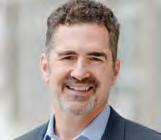
DAVID SUTHERLAND was honored by the board of trustees of the National Debate Tournament with the 2021 Laurence H. Tribe Award for Excel lence in Public Advocacy.
Stern is a professor at William & Mary Law School, where his scholarship centers on property and private law theory and on intellectual property and privacy issues. He is a recipient of the Thomas Edison Innovation Fellowship from the Center for the Protection of Intellectual Property and the Temple Bar Scholarship from the American Inns of Court Foundation, as well as the Phi Beta Kappa Society’s Rockefeller Award for the Advance ment of Scholarship and the Plumeri Award for Faculty Excellence at William & Mary.
Wright is a partner at K&L Gates’ Wash ington, D.C., office and a member of the public policy and law practice group. He rejoined K&L Gates after serving as director of legal policy for the Biden administration transi tion team. He previously served as associate counsel to President Barack Obama and as sistant counsel to Vice President Al Gore. In Congress, Wright served as staff director of the Subcommittee on National Security and Foreign Affairs of the U.S. House Committee on Oversight and Government Reform.
Professor Aditya Bamzai was also elected to the American Law Institute (see p. 59). —Mike Fox
CLASS NOTES 100 Fall 2022 | UVA LAWYER 89
Butler
Jones
Sawyer
Stern
Wright
ALUMNI ASSUME FEDERAL EXECUTIVE, JUDICIAL ROLES
In recent months, President Joe Biden chose several alumni to fill high-profile positions in the executive branch and in the courts, in roles that require Senate confirmations.
EXECUTIVE BRANCH
MARY BOYLE ’91 was sworn in as commissioner of the U.S. Consumer Product Safety Commission in June. She was previously executive director of the CPSC and a member of the Senior Executive Service. Before joining the CPSC, Boyle developed affordable housing programs for the city of Gaithersburg, Maryland; worked in private practice at a major international law firm; and served on Capitol Hill as a staff mem ber for Rep. Steve Solarz, and for the Asia and Pacific Subcommittee of the House Foreign Affairs Committee.
JOHN GLEESON ’80 and U.S. Judge CARLTON W. REEVES ’89 were confirmed in August to serve on the U.S. Sentencing Commission. Reeves is the first Afri can American to chair the committee.
Gleeson is a partner at Debevoise and Plimpton, where he has practiced since 2016. From 1994-2016, he served as a U.S. District Court judge for the East ern District of New York. He previously served as an assistant U.S. attorney in the U.S. Attorney’s Office for the Eastern District of New York. Reeves has served on the U.S. District Court for the South ern District of Mississippi since 2010. He was previously a partner at Pigott Reeves Johnson & Minor and served as chief of the Civil Division for the U.S. Attorney’s Office for the Southern Dis trict of Mississippi. Gleeson and Reeves are recipients of the Thomas Jefferson Foundation Medal in Law.
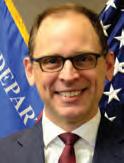
KEVIN RITZ ’04 was confirmed as U.S. attorney for the Western District of Tennessee in September. He had served as an assistant U.S. attorney in the U.S. Attorney’s Office for the Western District of Tennessee since 2005. He started in the narcotics unit and later held various leadership positions in the office, including serving as appellate chief and special counsel for over a decade. From 202021, he chaired the Tennessee Bar Association’s Appellate Practice Section; he served as president of the Federal Bar Association’s Memphis Chapter in 2017.
PENDING CONFIRMATIONS
Several more alumni have pending nominations as of press time. Updates will be posted in the next issue.
ROBERT STEWART BALLOU ’87 (COL ’84) has been nominated to serve as a judge on the U.S. District Court for the Western District of Virginia. VIJAY SHANKER ’99 has been nominated to serve as a judge on the District of Columbia Court of Appeals. JAMAR WALKER ’11 (COL ’08) has been nominated to serve as a judge on the U.S. District Court for the Eastern District of Virginia.
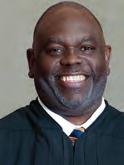
—Mike Fox
The award, named after 1961 NDT cham pion (and Harvard law professor) Laurence H. Tribe, is given an nually to a tournament alumnus who has taken advocacy skills ac quired through inter collegiate debate and become an exemplary public advocate who makes a real difference in the world.
Sutherland was a decorated debater for the University of Lou isville from 1978-82. He qualified for the national tournament four times, reaching the semifinals in 1981 and winning in 1982.
Sutherland began his career in the fi nancial industry, most notably serving in the U.S. Treasury Depart ment and as Morgan Stanley’s chief finan cial officer in the Asia Pacific region. In 1999, he became chair of the board of Interna tional Care Ministries, a nonprofit organiza tion with a mission to bring innovative, ho listic solutions to the wide range of needs faced by families living in ultra-poverty, or less than 50 cents per person a day.
During Suther land’s 23 years of lead ership, the ICM team has successfully built a focused, effective, ef ficient and scalable set of solutions that have changed the lives of over 1.5 million indi viduals in the Philip pines. In response to the COVID crisis, ICM pivoted to provide es sential hunger relief to the poor in the Phil ippines, distributing over 14 million meals and providing essen tial COVID health education.
RANDY TINSLEY was recognized in Cham bers USA in environ mental law. Tinsley practices with Brooks, Pierce, McLendon, Humphrey & Leonard in Greensboro, N.C.
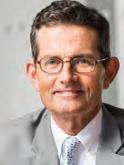
DEBRA SABATINI HENNELLY was interviewed by MARIA LEONARD OLSEN, for Olsen’s “Becom ing Your Best Version” podcast.
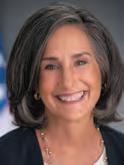

Hennelly founded Resiliti in 2004 to provide ethical leader ship, culture and com pliance consulting and training to organiza tions. Hennelly is also an adjunct professor in Fordham Univer sity School of Law’s Program on Corporate Ethics and Compliance. Her book, “Presence in Chaos: 365 Mindful Moments,” contains inspiring daily quotes set against her original photography.
of two recipients of the 2022 Outstanding Jurist Award, selected based on their joint leader ship of the court system during the pandemic. Taylor has served the Los Angeles superior and municipal courts for 21 years. He served as assistant presiding judge in 2018 and has been the presiding judge of the Superior Court since Jan. 1, 2021.
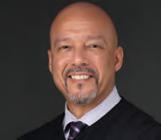
1989
After 14 years, DEBORAH PLATT MAJORAS is re tiring from Proctor and Gamble (see p. 28) Majoras joined the global consumer goods company as senior vice president and general counsel in 2008 and was named chief legal officer and secretary in 2010. Previously, Majoras served as chair of the Federal Trade Commis sion, as a federal prose cutor and as a partner at Jones Day.
RANDY PARKS was ap pointed chair of the executive committee at Hunton Andrews Kurth. Parks succeeds GEORGE C. HOWELL III ’81.
Parks is recognized for his work in complex corporate transactions, especially enterprise in formation technology and outsourcing transac tions, as well as corpo rate governance, capital markets, and mergers and acquisitions. He has served as co-chair of the firm’s corporate team, head of the global tech nology and outsourc ing practice group, and co-chair of its retail and consumer products industry group.
JOSEPH M. PERKINS JR. joined Indianapolisbased Citizens Energy Group as senior vice president and general counsel. Perkins over sees legal, regulatory and external affairs, human resources, health safety and security, in ternal audit and envi ronmental stewardship.
1990
In February, Oklahoma legislators requested Reed Smith investigate the 1998 capital murder conviction of Richard Glossip. Partner STAN PERRY led the firm’s team of more than 30 attorneys. In June, after spending more than 3,000 pro bono hours on the case, Perry an nounced their find ings: “No reasonable jury hearing the com plete record and the un covered facts … would have convicted Richard Glossip of capital
CLASS NOTES 90 UVA LAWYER | Fall 2022
1988
Los Angeles Superior Court Presiding Judge ERIC C. TAYLOR was one
Boyle
Gleeson
Reeves
Ritz
murder.”
The team unearthed missing and destroyed evidence, an allegedly false confession and a lack of physical proof. Oklahoma halted ex ecutions in 2015 after Glossip was almost put to death with the wrong chemical—one used to de-ice airplane wings. Recently, new proto cols were enlisted and Glossip was among the first rescheduled to be put to death. His most recent execution was stayed three hours before he was to be exe cuted. Glossip’s defense team will file a request for a hearing with the Oklahoma Court of Appeals so Reed Smith’s new evidence can be ex amined in court. Perry, based in Houston, is global director of pro bono and community service for the firm. He was widely quoted in national media about the investigation and its findings.
on Access to Legal Ser vices in the 2022-23 bar year. Su is a partner with Bradley Arant Boult Cummings in Washington, D.C.
1991
CHARLES DURANT retired as assistant general counsel for Science Ap plications International in 2020. Durant now serves as an adjunct pro fessor at the University of South Carolina Law School and was recently appointed to a four-year term on the Richland County Planning Com mission. He lives near Columbia, S.C.
VERNON F. INGE JR. was recognized in Chambers USA for general com mercial litigation. Inge practices with White ford, Taylor & Preston in Richmond, Va.
1992
CHRISTINE SAMSEL, a shareholder in Brown stein Hyatt Farber Schreck’s Denver office, was appointed to a three-year term on the board of trustees of Colorado Children’s Chorale, an organiza tion that presents pro fessional choral con certs and educational programs to enter tain, inspire, and bring joy to audiences and communities.
She got involved with Colorado Chil dren’s Chorale through her young son’s par ticipation with the organization.
HENRY SU will serve as chair of the ABA Stand ing Committee on Pro Bono and Public Service and as a member of the Virginia State Bar Standing Committee
DAVID S. DENIOUS joined Davis Graham & Stubbs in Denver. His prac tice continues to have an emphasis on lever aged acquisitions and dispositions, and cor porate finance transac tions. Denious is admit ted to practice in New York, Pennsylvania and Wyoming.
Prior to joining DGS, Denious was a partner in the Philadelphia offices of two international law firms. He has been ranked by Chambers USA in the areas of corporate mergers and acquisitions and private equity since 2004.
Through his roles as ex ecutive director of Blan chet House, Kerman works with other social services leaders to bring life-saving aid to people experiencing homeless ness, addiction and food and housing insecurity. Kerman is partnering with local government to build an innovative peer support team to address the mental and physical health needs of people experienc ing homelessness in Portland, Ore.
MICHAEL C. WU or ganized a panel, “‘Empathy is Very Im portant’: How Top Legal Chiefs Weath ered Cascade of Crises,” for the Georgia Asian Pacific American Bar Association in May. The panel was made up of chief legal officers of Bath & Body Works, Amazon, Uber and other top companies, and received coverage from Corporate Counsel magazine.
1993
GREGORY SALATHÉ joined PAG as a partner and group general counsel and has relocated to Hong Kong. PAG is one of the leading alter native fund managers focused on the Asia-Pa cific region, with ap proximately $50 billion of assets under man agement in its private equity, credit and markets, and real asset strategies. Salathé has practiced law for nearly 20 years in Asia, includ ing as a partner in Jones Day’s Tokyo office and Sidley Austin’s Sin gapore office. He has worked closely with PAG for over 12 years as outside counsel on a variety of investments, transactions and related matters.
Street Journal in March (see p. 96). “Books about fathers and sons are fairly common, books about fathers and their daughters somewhat less so. A book about a father, three daughters, several horses, social demographics, and the teaching and practice of both law and riding must surely belong to a genre of one.
“Oldfather is a pro fessor at Marquette University Law School in Milwaukee and the father of three horsecrazy girls (now grown). ‘A Man Walks Into a Barn’ is his witty, often wistful take on parent ing, pedagogy, and life lessons learned while navigating the insular and expensive world of horses and ‘horse people.’”
1994
ZEBULON D. ANDERSON was recognized in Chambers USA for his labor and employ ment law practice with Smith Anderson in Raleigh, N.C.
JORDAN KROOP, who practices with Pachulski Stang Ziehl & Jones in New York, was named to Lawdragon’s “500 Leading U.S. Bank ruptcy & Restructur ing Lawyers” guide for 2022. This year’s guide describes those selected as lawyers who “dazzle in financial restructur ings, whether in court or out” and are “the best at what they do.” Kroop represents debtors, of ficial committees, ac quirers and significant creditors in Chapter 11 matters involving pub licly traded and pri vately held companies throughout the nation.
1995
SCOTT KERMAN was named an Executive of the Year by Port land Business Journal.

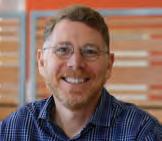
firm she is affiliated with, Alterity ADR, was named the best alterna tive dispute resolution firm. The firm launched last year in Atlanta.
1997
LAURA DEDDISH BURTON was named a 2022 Out standing Women in Business honoree by Triad Business Journal. This annual award fea tures businesswomen in the (North Carolina) Triad for accomplish ments within their in dustries and the wider business community.
An immigration law partner in Fox Roth schild’s Greensboro office and a certified immigration law spe cialist by the North Carolina State Bar Board of Legal Special ization, Burton helps some of the state’s most prominent employers in the health care, science and engineering sectors bring talented doctors, teachers and scientists to the United States. She works with clients to navigate the rigorous processes of securing visas and coordinates directly with federal agencies and senators’ offices to work out the wrinkles that can arise.
Burton is active in the North Carolina Bar Association. She serves on the Interna tional Law & Practice Section Council as the law school liaison, a post that entails creat ing international law programs for all the
state’s five law schools, and as chair of the nom inating committee for the NCBA’s Women in the Profession Com mittee. She also previ ously chaired the N.C. State Bar’s Board of Legal Specialization, which certifies attor neys as specialists in designated areas of law. In addition, Burton is a member of the Women’s Professional Forum, an organiza tion devoted to empow ering women and girls in the community, and is involved with Back pack Beginnings, which works to provide relief to elementary school students who struggle with food insecurity.
COLBY WALTON, chair man and CEO of Cooksey Communica tions, a North Texasbased public relations firm, was named to The 400, Fort Worth Inc. magazine’s list of the most influential figures in the Greater Fort Worth area. The fifth annual class of The 400 was recognized during an awards ceremony in May.
During his 24-year tenure at Cooksey, Walton has helped es tablish and grow the agency’s proficiency in professional services marketing and munici pal communications for clients facing an array of complex, high-stakes public relations issues.
Walton has also been involved in numerous professional and commu nity service organizations
CHAD M. OLDFATHER’S book, “A Man Walks Into a Barn,” was re viewed in the Wall
The Daily Report named LEAH WARD SEARS LL.M. best individual media tor/arbitrator, and the

CLASS NOTES 100 Fall 2022 | UVA LAWYER 91
Colby Walton ’04, right, stands alongside longtime business partner Jason Meyer, left, during the awards ceremony at the Fort Worth Club.
outside the agency, in cluding volunteer work on behalf of Leadership Fort Worth, the Uni versity of North Texas Health Science Center at Fort Worth, the City of Colleyville, the IrvingLas Colinas Chamber of Commerce, the Duke University Alumni Club of North Texas and the Virginia Morris Kincaid Foundation.
After three years at the Silicon Valley Bank, JENA BRIDGES WATSON joined Seattle-based HomeStreet Bank as senior vice president, assistant general counsel and assistant corporate secretary. Bridges Watson and her husband, Eric Watson, live in Belvedere, Calif., with two children, two Labradors, two cats and many bicycles.
1998
NEALE T. JOHNSON was named co-chair of Fox Rothschild’s litigation department. Johnson is a partner in the Charlotte, N.C., office. Johnson focuses his practice on construc tion law (transactional and dispute resolution), title insurance claims and coverage, real estate litigation, finan cial services litigation and general commer cial litigation.
1999
MICHAEL TAD CARITHERS retired after more than 20 years as a special agent with the Federal Bureau of Investiga tion. Carithers served in New York City and the Washington, D.C., area, working primarily on na tional security matters. His final assignment was with the FBI’s Office of the General Counsel as a legal instructor for new agent trainees at the FBI Academy in Quantico, Va.
2000
MARK MCKENNA joined UCLA’s Institute for Technology, Law & Policy as faculty co-di rector in June. McKenna is a leading intellec tual property scholar, widely published on a range of IP and technol ogy law topics. Although his core expertise is in trademark law, his re search interests also include privacy, copy right, design patent, the right of publicity and more general inquiries into the regulation of new technologies.
2001
ANDREW BOUTROS and his co-authors wrote “Betraying the Bench: Could the SCOTUS Leaker Face Criminal Charges?” for Bloom berg Law in May. Boutros, a former as sistant U.S. attorney in Chicago, is a partner at Dechert and serves as the regional chair of the firm’s white-col lar practice. He is also a lecturer at the Uni versity of Chicago Law School.
2002
CARTER BURWELL was appointed to serve on the Public Interest De classification Board, which advises the U.S. president on issues per taining to national clas sification and declassi fication policies. Senate Minority Leader Mitch McConnell appointed Burwell, who currently serves as counsel in the white-collar and regu latory defense practice at Debevoise & Plimp ton. Before joining the firm in 2021, Burwell spent more than 15 years in various senior roles across the federal government.
at the same ground breaking in Vermont for a major affordable housing project and the announcement of an ex panded public-private investment pool for af fordable housing. Getz is owner and CEO of Summit Properties, and Smith is president and CEO of the Vermont Community Foundation. Smith said, “Tom’s been on the front edge of some really creative affordable housing development, and I run the community foundation, which has been an active impact investor in housing and downtown revi talizations, in addition to a few other things.” The groundbreaking in June announced major federal funding for a mutual partner, Vermont Housing Finance Agency.
versaries, private-sec tor data breaches, the opioid crisis and inter national money laun dering and sanctions evasion.
MICHAEL DORE’S article, “How an NFT is Like a $5 Milkshake,” was published in the Los Angeles and San Fran cisco Daily Journal in late 2021. The article lays out both sides in the federal lawsuit between Miramax and Quentin Tarantino over the director’s plan to sell portions of his orig inal handwritten “Pulp Fiction” screenplay.
state and federal courts across the nation.
Gieseler has appeared frequently in the media and authored journal articles on the First Amendment, property rights, environmental law and international relations. His 2004 American Diplomacy article, “Debate on the Democratic Peace: A Review,” has been cited by the U.S. Army and the Heritage Foundation and is studied at universities around the world.
the last decade, Chief PeaceKeeper, was rec ognized as a trade mark. Levin has served as editor of the Ameri can Bar Association’s dispute resolution newsletter, “Just Reso lutions.” This spring he published an article in the newsletter on the ever-growing area of “gray divorce,” which refers to the rising rate of typically longmarried, older adults getting divorced.
TOM GETZ ’04 and DAN SMITH found themselves
2003ANDREW DOCKHAM joined the Strategic Risk and Crisis Man agement Group with Wilson Sonsini Go odrich & Rosati in Washington, D.C. Pre viously, Dockham served as chief counsel and deputy staff direc tor for U.S. Sen. Rob Portman, the ranking member for the Com mittee on Homeland Security and Govern ment Affairs.
Dockham led Port man’s team to produce a bipartisan report on the security and intel ligence failures that led to the Jan. 6 attack on the U.S. Capitol. From 2017-21, he served as chief counsel and staff director for thenChairman Portman on the Permanent Sub committee on Inves tigations, the Senate’s premier investigative entity. Under his leader ship, PSI issued several bipartisan reports and held hearings, tack ling important issues facing the country, in cluding prescription drug prices, research and intellectual prop erty theft by foreign ad
Dore is a litigation partner with Gibson, Dunn & Crutcher’s media, entertainment and technology prac tice, as well as its law firm defense and white -collar defense groups in L.A. He is a former federal prosecutor with extensive experience in high-stakes crimi nal and civil matters across a broad range of practice areas.
In February, ROSCOE JONES JR. was selected as one of the 500 leading lawyers in America by Lawdragon and in July he was elected to be a member of the American Law Institute (see p. 89). Jones is a partner with Gibson Dunn in the Washington, D.C., office and co-chairman of the firm’s public policy group. He is also a core member of the firm’s congressional investigations practice group.
2004
STEVEN GIESELER joined Bartlett Loeb Hinds & Thompson in Tampa, Fla. Gieseler concentrates his practice on property rights, election law and constitutional law. He has authored numerous briefs in the U.S. Supreme Court and has handled litigation in
In 2012, Gieseler was appointed by Gov. Rick Scott as a member of the Judicial Nominating Commission for Florida’s 19th Circuit. He was appointed to a second four-year term in 2017.
YALONDA T. HOWZE, ex ecutive vice president and chief legal and compliance officer with Codiak BioSciences, was named a 2022 InHouse Leader by Mas sachusetts Lawyers Weekly. Howze spent a decade in private prac tice, primarily focused on the biotech indus try before moving inhouse with Codiak two years ago.
SCOTT LEVIN is an at torney whose practice with San Diego Divorce Mediation & Family Law is dedicated to mediation and alterna tive dispute resolution. Recently the moniker Levin has gone by for

MEGHAN OLIVER, a member with Motley Rice, was recognized by Benchmark Litiga tion for her role as trial counsel for Twitter shareholders, citing the firm’s lead role in negotiating an $809.5 million settlement.
Plaintiff sharehold ers had alleged that the social media giant and two of its former senior executives concealed the company’s declin ing daily user growth metrics to inflate its stock price between February and June of 2015. The Motley Rice team negotiated the $809.5 million agree ment days before trial was set to begin in Sep tember 2021. Oliver practices in Mount Pleasant, S.C.
CHRIS OBENSHAIN is running for a seat in the 41st District of the Virginia the House of Delegates, in Mont gomery and Roanoke
CLASS NOTES 92 UVA LAWYER | Fall 2022
2006
Scott Levin ’04 and his family recently went to Disneyland.
counties. Obenshain serves as an assistant commonwealth’s at torney in Montgom ery County. The elec tions are scheduled for November 2023.
J. AUSTIN CURRY earned board certification in patent litigation from the National Board of Trial Advocacy. Curry, a principal at Caldwell Cassady & Curry in Dallas, was recognized on the 2022 Texas Rising Stars list; he’s been named for mul tiple years based on his work in intellectual property litigation. He also earned recognition as one of 100 attorneys in the state to be named to the Up-and-Com ing list of Texas’ elite lawyers 40 or younger.
2007tive reforms to enhance the independence of the inspectors general, reduce improper pay ments and improve fi nancial management across the federal gov ernment. She also led efforts to strengthen oversight of federal COVID-19 relief funding. Moreover, Motley has been instru mental in expanding GAO’s Center for Audit Excellence and advising on an array of gover nance issues that sup ported improvements in financial reporting.
2008
PATRICK J. MCCANN JR. was promoted to share holder with Chamber lain Hrdlicka in Atlanta. A member of the tax controversy and litiga tion practice, McCann represents taxpayers at all stages of tax con troversy including ex amination, appeals and litigation.

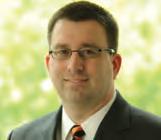
2010
LISA (HOVEY) MOTLEY, the managing associ ate general counsel with the U.S. Govern ment Accountability Office, was awarded the Arthur S. Flem ming Award in Wash ington, D.C., in June. Motley was honored for her leadership and legal counsel, which im proved overall govern ment performance and increased the audit ca pacity of domestic and international account ability organizations, according to officials.
Motley directs several teams of at torneys who handle matters spanning a range of government programs and activi ties. She played a key role in drafting legisla
JORDAN K. FIELD was named chair of Crowe & Dunlevy’s taxa tion practice group in Oklahoma City. A firm director specializing in business transac tions, Field’s experi enced tax law practice includes tax plan ning and tax contro versy matters relating to federal and state income taxes for enti ties and individuals, as well as estate and gift tax planning and taxexempt entity matters.
Earlier this year, FRANKIE JONES was se lected to complete the unexpired term of the late Guilford County (N.C.) Commissioner Carolyn Q. Coleman, who died in January. In May, Jones won the Democratic primary for a full four-year term and will progress to the general election in No vember. In addition to his role as a Guilford County commissioner, Jones is a vice president and managing direc tor in the investments real estate department at Lincoln Financial Group.
SUTTON ANSLEY and his wife, Karen, welcomed a daughter, Emerson Elizabeth, on Dec. 6. The couple’s other daughter, Archer, 3, loves being a big sister. The family continues to live in Washington, D.C. Ansley is a partner at Weil, Gotshal & Manges and specializes in patent litigation.
STEVEN GARRETT was named a partner with Boulette Golden & Marin in Austin, Texas. Garrett’s practice is focused on labor and employment law, spe cifically litigating non compete and trade secret matters, defend ing employment dis crimination and harass ment claims, advising clients on work sepa ration agreements, as sisting with federal and state agency compliance and investigations, ne gotiating collective bar gaining agreements and representing clients in corporate immigration matters.
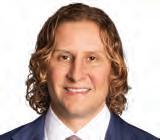
Following years of service as a career pros ecutor, LISA H. MILLER was selected to serve as a deputy assistant attorney general of the Depart ment of Justice’s Crimi nal Division. Miller, the
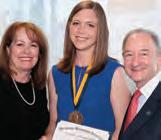
COOK ’05 TAKES SEAT AS DELAWARE VICE CHANCELLOR
NATHAN A. COOK ’05 (COL ’02) was sworn in July 21 as vice chancellor of Delaware’s Court of Chancery, which adju dicates legal disputes for more than 1 million incorpora tions in the state.
He was nominated by Gov. John Carney on June 3 and confirmed by the state Senate on June 22.
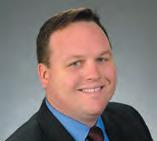
“Delaware’s my home and practicing as a member of the Delaware bar, and before the Court of Chancery in particular, has offered me more than I could have ever dreamed,” Cook said at his confirmation hearing. “I’m keenly aware of the critical importance of the Court of Chancery to the state of Delaware and its citizens.”
He had been litigating before the Court of Chancery for 16 years and was the first managing partner at the Delaware office of Block & Leviton. Cook was initially with Abrams & Laster (now Abrams & Bayliss) and then moved to Grant & Eisenhofer before joining Block & Leviton.
Among the cases he has litigated in the Court of Chan cery are a Dole Food Co. stockholder class-action and appraisal suit that resulted in a damages award of $148 million; a News Corp. shareholder derivative case that led to a $139 million settlement; and a Clear Channel Outdoor Holdings Inc. derivative suit that resulted in a deal that required the return of $200 million to company investors, Block & Leviton said in a statement.
“While we will deeply miss Nathan as a colleague, we couldn’t be happier for him and for the Court of Chan cery,” Block & Leviton managing partner Jeffrey C. Block told Law360. “We know that Nathan’s intelligence and judgment will make him an outstanding vice chancellor.”
—Mike Fox
CLASS NOTES 100 Fall 2022 | UVA LAWYER 93
2009
7 ALUMNI AMONG ‘RISING STARS’ FOR 2022
Seven alumni were among Law360’s Rising Stars for 2022, a list of attorneys under age 40 whose ac complishments as lawyers “transcend their age.”
Honorees were selected based on their career ac complishments in their respective disciplines.
ALEXANDRA GARRISON BARNETT ’10 of Alston & Bird was named a top employ ment attorney for playing a lead role in defending employer clients, includ ing UPS, from lawsuits by workers.
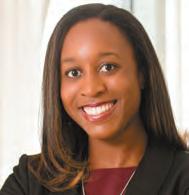

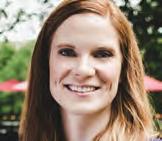
PEDRO BERMEO ’12 of Davis Polk was named a top capital markets law practi tioner for helping to advise billion-dollar underwriting.
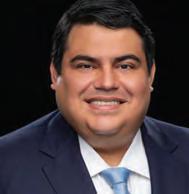

JAMES MCDONALD ’07 of Sulli van & Cromwell was named a top compliance attorney for his roles in cryptocur rency cases and a $6 billion settlement with regulators.
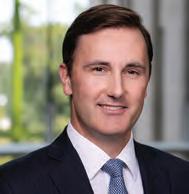
JASON MCMANIS ’13, the liti gation department head for Ahmad Zavitsanos & Mensing, was named a top trial attorney for his role in major cases, including one brought by a group of doctors against United Healthcare.
BRANDON MOSS ’11 of Wiley Rein was named a top whitecollar practitioner for her role in defending a former pharmaceutical executive.
BRIAN RABBITT ’08 of Jones Day was named a top white-collar practitioner for his accomplishments while at the U.S. Depart ment of Justice, including a landmark Foreign Corrupt Practices Act settlement.
JENNIFER ROY ’11 of Latham & Watkins was named a top environmental practitioner for guiding major utilities and energy companies on environmental policy and regulatory compliance.
—Mike Fox
first woman promoted from within the divi sion to hold her posi tion, is responsible for more than 170 prosecu tors in the criminal fraud section and more than 30 attorneys in the criminal appellate section.
Miller was the first woman to hold her prior position, chief of the market integrity unit within the DOJ’s Fraud Section.
JASON MORRIS was named Norfolk South ern’s vice president of labor relations in 2021. Morris joined Norfolk Southern’s law depart ment in 2010, handling safety, labor and em ployment issues. He moved to the company’s safety and environmen tal department, serving as system director for safety before being promoted to assistant vice president in 2018. Morris, a U.S. Air Force veteran, previously served as a legislative di rector in the U.S. House of Representatives and as a logistics readiness officer in the Virginia Air National Guard.
2011
Baltimore City in June. Glynn was appointed by Gov. Larry Hogan after working as chief solici tor in the litigation and appeals division of the Baltimore city solicitor’s office. She previously worked as an assistant attorney general in the contract litigation unit at the Office of the At torney General, as an assistant solicitor in the litigation division of the city’s solicitor’s office and as an associate at a law firm.
2012
MATTHEW HARVEY was elected to partner with Holland & Hart in January. Based in Boise, Idaho, Harvey focuses on patent prosecution, patent analysis, and in tellectual property due diligence matters across electrical engineering and standards-essential technologies.
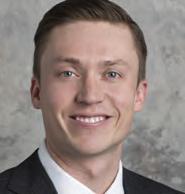
fraud and financial fraud. She is based in Raleigh, N.C.
BRENDAN M. STALEY was promoted to partner with Hunton Andrews Kurth in Richmond, Va. Staley focuses his prac tice on public finance, with emphasis on the areas of federal tax and securities law, state and local government law, economic development incentives and publicprivate partnerships. He has experience in ad vising, negotiating and documenting tax-ex empt bond transactions for governmental and 501(c)(3) entities, as well as in structuring public finance and project development transac tions for a wide range of public and private infra structure and economic development projects.
MEGAN F. ENGEL was promoted to partner at Reed Smith in Washing ton, D.C. A member of the life sciences health industry group, Engel’s practice focuses on as sisting health care pro viders faced with False Claims Act litigation and government or internal investigations. Her prac tice extends to compli ance with regulatory fraud and abuse issues in health care.
LYDIE ESSAMA GLYNN was sworn in as associ ate judge of the District Court of Maryland for
CAITLIN POE, a Williams Mullen partner, was named to Benchmark Litigation’s 40 & Under Hot List. This is the fifth consecutive year she was included on the list, which recognizes attor neys who are “among the top emerging talent in their respective litiga tion communities in the U.S. and Canada.”
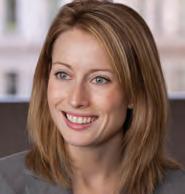


Poe is a litigation attorney and regu latory adviser who represents criminal and civil clients, with a particular focus on representing profes sional clients adverse to the state or federal government. Her experience includes criminal and civil cases involving se curities regulation, intellectual property, consumer protection, environmental com pliance, health care
2013LUCY DINKINS was named a shareholder of Wyche in Columbia, S.C. Dinkins focuses her practice on litiga tion, representing plain tiffs and defendants in a wide range of complex matters. She has ex perience in federal and state court with medical malpractice, personal injury, health care, products liability, shareholder disputes, trademark and copy right infringement, breach of contract, con struction, employment and dram shop liability.
Dinkins was named a leading lawyer by Best Lawyers and Super Lawyers. She has also been recognized for excellence in her area of practice by Colum bia Business Monthly in the magazine’s Legal Elite issue for the past three years.
CLASS NOTES 94 UVA LAWYER | Fall 2022
Barnett
Bermeo
McDonald
McManis
Moss
Rabbitt
Roy
S. JAE LIM and JESSICA
CUNNINGHAM LIM ’14 were thrilled to welcome their daughter, Harper Joy, to the family May 26. She joined her big sister, Kennedy, and brother, Connor.
investigations brought by various government agencies.
2014
WARREN J. MCCARTY was recognized on the 2022 Texas Rising Stars list. McCarty has been on the list for multiple years based on his work in intellectual property litigation with Caldwell Cassady & Curry in Dallas.
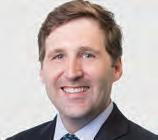
MICHAEL ALBERT was promoted to partner with Robbins Geller Rudman & Dowd in San Diego. His practice focuses on complex se curities litigation, and he is a member of the firm’s lead plaintiff advisory team.
S. JAE LIM ’13 and JESSICA CUNNINGHAM LIM were thrilled to welcome their daughter, Harper Joy, to the family May 26. She joined her big sister, Kennedy, and brother, Connor.
Benedicto represents and advises clients in a variety of litigation matters, including complex litigation, cybersecurity and data privacy, securities investigations and litigation, business and corporate disputes, insurance coverage litigation and toxic torts. He is dedicated to pro bono and is co-leader of the firm’s working group studying equality in law enforcement. In this capacity, Benedicto has contributed to several local police reform efforts in San Francisco and across the country.
faces, she wrote a book, “Therapy Isn’t Just For White People.” Imani and the nonfiction au tobiographical narrative book were featured in Essence and Forbes mag azines. Imani and two collaborators released a card game, LikeU, that celebrates human con nection and meaningful conversation.
2016
KATE SALTZ was pro moted to partner with Hunton Andrews Kurth in Richmond, Va. Saltz counsels clients on cor porate finance, public and private securi ties offerings (as both issuers’ and underwrit ers’ counsel), mergers and acquisitions, and other corporate matters, with a particular con centration on real estate investment trusts and other real estate related specialty finance companies.
EMILY FEDER led the discussion on the debt market outlook as part of a panel at Bisnow’s na tional capital markets and commercial real estate finance confer ence in May. Feder, an associate with Allen Matkins in Los Angeles, focuses on all types of real estate transactions, from acquisition and dis position to leasing and finance.
2015
As of August, JOEL JOHNSON is an associate professor of law at Pep perdine Caruso School of Law. Johnson previously served with the crimi nal appellate section of the Department of Justice. Johnson’s legal research focuses on constitutional limits on substantive criminal law and explores the impli cations of those limits for statutory interpre tation, criminal proce dure and federal courts. His most recent article, “Dealing with Dead Crimes,” is forthcoming in the Georgetown Law Journal.
LAUREN S. KRAMER was featured in Law.com’s “How I Got Into Law School” series in May. Kramer is an associate in the mergers and acquisitions group with Skadden, Arps, Slate, Meagher & Flom in New York.
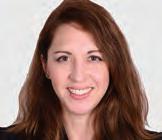
and investigations prac tice group. Williams has notable experience advising clients on po tential exposure under the U.S. Foreign Corrupt Practices Act and other anti-corruption laws in connection with internal and government inves tigations, as well as preand post-integration due diligence. Williams pre viously practiced with White & Case.
2018
JOSEPH HYKAN joined Lewis Roca as an as sociate in Denver. In the business litigation practice group, Hykan focuses on commercial litigation. He provides counsel to clients ad dressing disputes and class actions in various industries including life sciences and financial services.

at the intersection of technology, policy and law. Her courses will include internet law and policy and com puter crimes, and she will play a key role in the center’s Integrated Cybersecurity Studies program. Sharma is a member of the Internet Law Foundry and was a Yale Cyber Leadership Fellow.
ADAM YOST, an attor ney in Bradley Arant Boult Cummings’ Dallas office, earned the Certi fied Information Privacy Professional creden tial through the Inter national Association of Privacy Professionals.
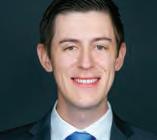
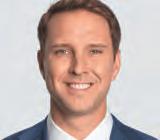
Yost is an associate in Bradley’s government enforcement and inves tigations practice group. He focuses his practice on helping corporations and individuals navigate regulatory investiga tions, civil enforcement actions and criminal
Morgan Lewis associ ate KEVIN BENEDICTO was unanimously confirmed by the San Francisco Board of Supervisors to serve as a member of the city’s police commis sion. As a commissioner, Benedicto oversees the police department and the Department of Police Accountability. The com mission sets policy for the police department and conducts disciplin ary hearings on charges of police misconduct.
In his practice,
In addition to KIARA IMANI’S (WILLIAMS) work as a business affairs con sultant, she is actively engaged in the creative world. Imani co-hosts a late-night talk show on Los Angeles radio station KBLA Talk 1580. Wanting to change the narrative around the unresolved trauma the Black community often

JAMES F. SMITH joined Caldwell Cassady & Curry in Dallas and pri marily focuses on intel lectual property litiga tion. He most recently served as a law clerk for Kimberly A. Moore at the U.S. Court of Appeals for the Federal Circuit. Smith previ ously represented intel lectual property clients at a California firm for several years.
2017
ASHLEY WILLIAMS joined Blank Rome’s Washing ton, D.C., office in the white-collar defense
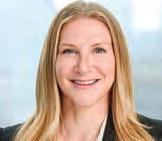
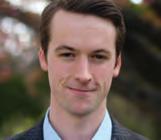
MICHAEL C. LEE has joined Vinson & Elkins as an associate in its Dallas office, where he joins his father, JAMES J. LEE ’76, who is a senior partner with the firm. Michael’s prac tice focuses on complex commercial litigation. 2019
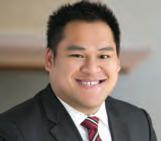
COLIN GIUSEPPE COX was named to the board of directors of the MiamiDade Bar Association and co-chair of its in ternational law com mittee. Cox is a member of Haynes and Boone’s International Practice Group in Dallas. He is licensed to practice in both Florida and Texas. In June he was ap pointed as secretary and treasurer of the business law section of the State Bar of Texas.
CHINNY SHARMA is a scholar-in-residence at the Strauss Center at the University of Texas at Austin. Sharma’s focus covers an array of topics
ROBERT PARADELA JR. joined the Fort Lau derdale, Fla., office of Stearns Weaver Miller in its labor and employ ment law group. Parad ela focuses his practice on representing em ployers before adminis trative agencies such as the Equal Employment Opportunity Commis sion and the National Labor Relations Board, and in federal and state courts in cases alleging discrimination, sexual harassment, wrong ful termination claims, retaliation, wage and hour claims, and charges of unfair labor practices.
CLASS NOTES
2020
100 Fall 2022 | UVA LAWYER 95
ALUMNI BOOKS
NONFICTION
NEED TO KNOW WORLD WAR II AND THE RISE OF AMERICAN INTELLIGENCE NICHOLAS REYNOLDS ’81
MARINER BOOKS
The U.S. spy industry was a late bloomer. Before World War II, the United States’ isolated location—coupled with puri tanical notions eschewing espionage—meant that spying on our enemies and allies was a relatively rare, often haphazard undertaking. But, as New York Times bestselling author and long-time intelligence officer Nicholas Reynolds ’81 details in “Need to Know,” the 1941 surprise attack on Pearl Harbor spurred an extraordinarily intricate web of spying which, postwar, would grow into our modern intelligence machine.
Reynolds has worked at the CIA, most re cently as the historian for the CIA Museum. The Oxford-trained author joined the Marine Corps in the 1970s, serving as an infantry officer and then as an official historian. Later, as a colonel in the Reserve, he was the officer in charge of field history.
“Before the war, American intelligence was a cottage industry, with a handful of craftsmen working on their own, mostly isolated from each other,” Reynolds writes. “American spies, code breakers and guerrillas created organizations and set precedents during the war.”
“Need to Know” is the first study to tackle the whole picture of the wartime birth of American intelligence, as well as the leaders and spies who would shape the nascent intelligence services.

With Britain’s back against the wall after the fall of France in 1940, it launched an intelligencebased campaign in the U.S. in hopes of quelling isolationist sentiments. (Ian Fleming, who would go on to create the James Bond franchise, played a seminal role in that British intelligence operation.) Sympathetic Americans used their influence to try to persuade President Franklin Roosevelt of the importance of intelligence in fighting the European enemy. One such American, lawyer William J. Donovan, went on to head the Office of Strategic Services, the wartime precursor to the CIA.
The book details dozens of inside stories about clandestine wartime efforts, internecine competitiveness and the unprec edented successes that helped bring victory to the Allies.
Reynolds sheds light on the vital roles played by Roos evelt and Winston Churchill, who had radically different approaches to intelligence.
The book analyzes the lingering controversy over whether intercepted Japanese messages forewarned of the attack on Pearl Harbor—and the role of the strike in shaping Ameri can intelligence ever after.
He also discusses how a 26-year-old female mathema tician quietly cracked Japanese diplomatic code in 1940; how a high school dropout climbed the U.S. Navy ranks to become responsible for “radio intelligence” at Pearl Harbor and enabled U.S. victory at the Battle of Midway; and how a Wall Street lawyer created a model for professionalizing American strategic intelligence.
Reynolds has taught at the Naval War College, Johns Hopkins University and the Osher Lifelong Learning In stitute. “Need to Know” is his fourth book.
—Melissa Castro Wyatt
THERAPY ISN’T JUST FOR WHITE PEOPLE A Memoir
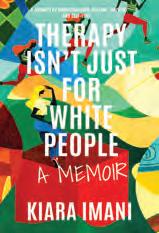 KIARA IMANI ’15 LIT RIOT PRESS
KIARA IMANI ’15 LIT RIOT PRESS
In a series of essays, Imani’s debut memoir chronicles her journey to understanding the racial trauma experi enced by many Black people in America and the underlying effect it has on their mental health. Through therapy, Imani was introduced to the concept of racial trauma and discovered how her own unrecog nized racial trauma affected her mental health, self-image and worldview. Spanning more than 20 years, Imani weaves together a multigenerational family portrait of her experiences growing up in the South to her career as a young Black professional, where she was often one of the few Black people in the room.
what awaited. He was soon enmeshed in the consuming subculture of barns, riding and horse shows, learning not just about the animals that so inexpli cably drew his girls but also about the people and personalities that populated the spaces around them. He re counts his struggles to be the best dad he can, supporting a child’s dreams in the face of long odds and extraor dinary expenses. Filled with the joys, heart breaks and life lessons that come from train ing, competition and time in the company of horses, this is mostly a book about family and the strong bonds that can form when parent and child join hands and pursue a passion together.
A MAN WALKS INTO A BARN
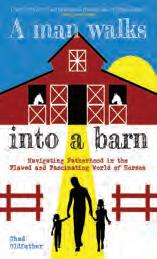
Navigating Fatherhood in the Flawed and Fascinating World of Horses
CHAD OLDFATHER ’93
TRAFALGAR SQUARE BOOKS
When Oldfather’s chil dren, out of nowhere, became obsessed with horses, he had no idea
COLONIAL LEGACIES AND THE RULE OF LAW IN AFRICA

Ghana, Kenya, Nigeria, South Africa, and Zimbabwe SALMON A. SHOMADE ’97
ROUTLEDGE
The legal system is intended to protect regular citizens, but within the majority of Africa the rule of law remains infused with Eurocentric cultural and linguistic tropes, which can leave its supposed beneficiaries feeling alienated from the structures intended to protect them. This book traces the impact, effect, opportunities and challenges that the colonial legacy poses for the rule of law across Ghana, Kenya, Nigeria, South Africa and Zim babwe. The book exam
96 UVA LAWYER | Fall 2022 ALUMNI BOOKS
ines the similarities and differences of the colo nial legacy on the current legal landscape of each nation and the intersection with the rule of law.
STANDARD BUSINESS CONTRACTS
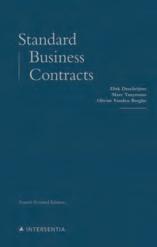
his service in the House in 2006 and became the Democratic leader of the body in 2011. He examines the special nature of Virginia poli tics, the demographic changes underpinning its shifting political fortunes, and the poli cies and personalities at the center of the state’s dynamics for the last two decades.
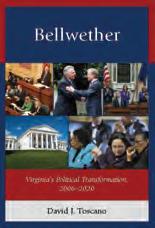
FICTION
GUIDE TO PRIVACY
This guide addresses online privacy and the intersection between privacy and corporate social responsibility. Advances in informa tion technology and ascendency of the in ternet have added im portant legal and social responsibilities relating to the collection, use and storage of personal information. Privacyrelated laws continue to evolve and affect busi nesses of all sizes and sectors. The “Guide to Privacy” identifies and explains the rel evant current issues, both domestic and in ternational, for privacy matters. It provides readers with references to the important laws, regulations and vol untary standards that are essential to counsel clients, develop inter nal processes, engage with stakeholders, and prepare reports and disclosures.
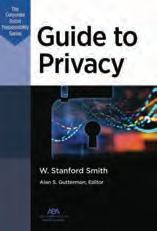
Though English is not the language of Belgian legal systems, English is frequently used to draft and execute contracts in Belgium. The latest edition of “Standard Business Contracts,” which first appeared in 2006, offers examples and clauses in English to guide legal practitioners in the corporate world.
In 2000, Republicans won Virginia’s gover nor’s race, held both U.S. Senate seats in the state, and had majori ties in both the House of Delegates and the State Senate. Toscano recounts the years leading up to 2020, a period when Demo crats rapidly turned Virginia blue by winning four of five gubernatorial contests, electing two U.S. sena tors and flipping the House to Democratic control. The state also began voting for Demo cratic presidential can didates. Toscano began
Inspired by the Kenne dys, Giffin offers a fic tional rewrite through the Kingsley family— American royalty, beloved for their mili tary heroics, political service and unmatched elegance. After Joseph S. Kingsley Jr. is killed in a tragic accident in 1967, his charismatic son inherits the weight of that legacy. Mean while, no one ever ex pected anything of Cate Cooper, who also grew up fatherless. After being discovered by a model scout at age 16, Cate uses her looks as a ticket out of her family’s cycle of disappoint ment. Yet she feels like a fraud, faking it in a world in which she’s never truly belonged. When Joe and Cate unexpectedly cross paths one afternoon, their connection is instant and intense. But can their relationship survive the glare of the spotlight and the socalled Kingsley curse?
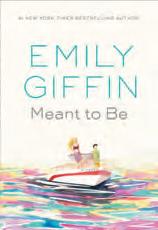
THE SISTERS OF LUNA ISLAND

Twelve-year-old Mari gold Lafleur is the last of a long line of aro mages, witches who blend scents into practi cal charms using aro magic. But ever since a terrible accident injured her father and damaged Luna Island, Marigold and her sisters have vowed to abandon their family legacy. When a secret curse threatens her family, it’s up to Mari gold and her best friend, Sam, to uncover the origins of the curse and break the spell. To do so, she must learn to trust her instincts and believe in her own unique magic, or risk losing her beloved sisters forever.
through a forgotten New England factory town; a colonial along a midwestern street lined with tall oaks, middling ambitions and short mailboxes; and a tired cemetery along the Mississippi where the hushed voices of the buried dance among the live oaks.
POETRY
MY NAME ON A GRAIN OF RICE
 RICHARD VOIGT ’74 ATMOSPHERE PRESS
RICHARD VOIGT ’74 ATMOSPHERE PRESS
Harry Travers walks away from the mani cured future his disin tegrating, moneyed family had envisioned for him so that he can feel the rush of making something out of nothing. After quitting his job with a software startup, Harry stum bles into working on a construction site—a dangerous environment in which he has no natural instincts. Blinded by his own intensity, he exposes others to tragedy. He also becomes involved with Minnie Sollis, an unadorned, self-pro pelled woman who demands serious things of him. He learns how vulnerability can make love possible.
THE PRESIDENTS IN QUIRKY ILLUSTRATED VERSE DAVID HOLLAND ’72
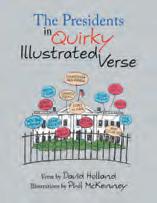 FULTON BOOKS
FULTON BOOKS
A few U.S. presidents have been leaders of accomplishment and distinction, perhaps most notably George Washington, Abraham Lincoln and Franklin Roosevelt. Others were generally successful but were not seriously chal lenged by the events of their times. Still others lost out in both catego ries. This book of quirky rhyme attempts no rankings but, while acknowledging serious events and conditions, mostly searches for a bit of humor.
WHATEVER HAPPENS, PROBABLY WILL JOHN W. MACILROY ’74 SHORT STORY AMERICA
In his debut collection of short stories, MacIl roy teases the moment when everything changes, when the reader suddenly and completely knows the heart of each character and the fullness of the human experience. Among other places, the book journeys
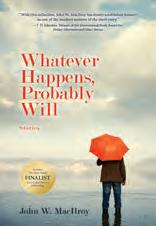
100 Fall 2022 | UVA LAWYER 97 ALUMNI BOOKS
The Corporate Social Responsibility Series
W. STANFORD SMITH ’88
EDITED BY ALAN S. GUTTERMAN ABA PUBLISHING
MARC TAEYMANS LL.M. ’81, DIRK DESCHRIJVER AND OLIVIER VANDEN BERGHE INTERSENTIA CAMBRIDGE
BELLWETHER Virginia’s Political Trans formation, 2006-2020 DAVID TOSCANO ’86 HAMILTON BOOKS
MEANT TO BE EMILY GIFFIN ’97 SIMON & SCHUSTER BOOKS FOR YOUNG READERS
STACY HACKNEY ’01 SIMON & SCHUSTER BOOKS FOR YOUNG READERS
IN MEMORIAM
H.A. Street ’50 GRUNDY, VA. June 25, 2022
Eugene J. Meyung ’51 CHARLOTTESVILLE May 15, 2022
James D. Atkinson Jr. ’52 GREENUP, KY. Feb. 13, 2022

Robert B. Bottomley ’52 LA JOLLA, CALIF. June 7, 2022
Henry M. Schwan ’53 NORFOLK, VA. Feb. 2, 2022
Robert N. Robinson ’54 CHARLOTTE, N.C. May 17, 2022
Marion S. Boyd Jr. ’56 MEMPHIS, TENN. March 20, 2022
Harold C. Buckingham Jr. ’57 BLOOMFIELD, CONN. June 5, 2022
Stanley Pitkin Christopher ’58 CHARLOTTESVILLE Nov. 22, 2021
Philip H. Elliott Jr. ’58 ORMOND BEACH, N.Y. Nov. 9, 2021
Herbert Davis ’59 WILMINGTON, DEL. Feb. 4, 2022
John C. Dew ’59 ST. PETERSBURG, FLA. Nov. 17, 2020
William F. Blue ’60 LUTHERVILLE TIMONIUM, MD. June 10, 2022
Thomas B. Eastman ’60 IDLEWYLDE, MD. April 10, 2022
Barry Kantor ’61 VIRGINIA BEACH, VA. June 19, 2022
David Milne IV ’61 WEST PALM BEACH, FLA. Feb. 17, 2022
William L. Person Jr. ’61 ANAHEIM, CALIF. Jan. 4, 2022
Ira G. Colby III ’62 CHESTER, CONN. July 3, 2022
Langhorne Bond ’63 MARSHALL, VA. Jan. 29, 2022
John D. Hansen ’63 RUTLAND, VT. Jan. 21, 2022
Howard I. Levine ’63 CHATTANOOGA, TENN. June 29, 2022
G. Kendall Sharp ’63 ORLANDO, FLA. March 24, 2022
Richard A. Bigger Jr. ’64 CHARLOTTE, N.C. May 23, 2022
Dolph Chianchiano ’65 POMPANO BEACH, FLA. May 21, 2022
James L. Sanderlin ’66 CROZIER, VA. Jan. 25, 2022
Anthony J. Thompson ’66 BOYNTON BEACH, FLA. May 31, 2022
Joseph R. Gladden Jr. ’67 ATLANTA March 15, 2022
Samuel P. Johnson III ’67 PETERSBURG, VA. March 3, 2022
IN MEMORIAM 98 U VA LAWYER | Fall 2022
ROBERT LLEWELLYN
ROBERT LLEWELLYN
Robert A.K. Welch ’67 NELLYSFORD, VA. May 4, 2022
Claude T. Sullivan Jr. ’68 HIGHLANDS, N.C. Feb. 27, 2022
Gilbert K. Davis ’69 FAIRFAX, VA. Feb. 13, 2022
Don Christian Meier ’69 TYRO, VA. June 7, 2022
Robert P. Kyle ’70 RICHMOND, VA. Feb. 6, 2022
David H. Ibbeken ’71 CHARLOTTESVILLE June 27, 2022
Carson Lee Fifer Jr. ’72 ALEXANDRIA, VA. April 21, 2022
Eugene W. Harper Jr. ’72 NEW ROCHELLE, N.Y. April 3, 2022
John H. Rust Jr. ’72 FAIRFAX, VA. Dec. 30, 2021
J. Peter Doherty ’73 VIRGINIA BEACH, VA. Jan. 20, 2022
Joe E. Forrester ’73 BURLINGTON, VT. March 31, 2022
Mary N. Humphries ’73 BALTIMORE Jan. 26, 2022
Stephen C. Walke Jr. ’73 MONTPELIER, VT. March 23, 2022
Frank E. Riggs Jr. ’74 ATLANTA April 3, 2022
Donald M. Rowe ’74 BEDFORD, VA. May 14, 2022
Virginius R. Shackelford III ’74 RICHMOND, VA. May 14, 2022
Kip Hawley ’80 PACIFIC GROVE, CALIF. March 21, 2022
Thomas Robert Cornish LL.M. ’82 OKMULGEE, OKLA. Feb. 2, 2022
Joseph P. Sullivan LL.M. ’84 NEW YORK March 12, 2022
Kent K. Reynolds ’85 ST. LOUIS March 12, 2022
Christopher P. Simpson ’85 AUGUSTA, MAINE July 9, 2019

Marianne G. Bundren ’88 HERNDON, VA. July 3, 2022
Robert J. Klees LL.M. ’90 MERAUX, LA. March 17, 2022
Jon M. Oden ’94 ORLANDO, FLA. July 10, 2022
Randy Holland LL.M. ’98 MILFORD, DEL. March 15, 2022
Henry C. Morgan Jr. LL.M. ’98 CENTER LOVELL, MAINE May 1, 2022
IN MEMORIAM Fall 2022 | U VA LAWYER 99
Bouton is co-founder of Halo Top Creamery, which stole the hearts and spoons of ice cream fans globally. By 2017, Halo Top was the No. 1-selling pint of ice cream, and soon other brands were imitating its low-calorie recipe for success. In 2019, Bouton led a sale of Halo Top’s U.S. and Canadian business in which he spun out Halo Top’s international operations and became CEO of Halo Top International. In addition to Halo Top International, he is focused on launching Gatsby Chocolate, the first-ever lowcalorie chocolate, looking to do to the chocolate market what Halo Top did to the ice cream category.

Like with anything in life, we didn’t do anything special. We worked hard, made the most of our lucky breaks, and did our best to get it right rather than worry about being right. In 2015, we reformulated so that our product was much better and retained virtually everyone who tried it, and we rebranded so that our brand was visually disruptive and would stand out on the shelf. We then got a lucky break with some PR, putting millions of eyeballs on our brand, after which the prod uct and brand itself became a viral sensation via word-of-mouth marketing.
It started as maniacal independence. I sim ply can’t stand if someone else can tell me what to do, when to do it, how to do it. It since has matured into the joy of helping to build and lead a team, to be part of something bigger than your self, working with other people for the greater good of the team. I don’t think there’s a more fulfilling manifestation of team-building than teams arising out of entrepreneurship. I could write a novel on what I’ve learned, but I’ll just say I’ve learned the importance of teams and building a foundation on
100 U VA LAWYER
 ROBERT LLEWELLYN
ROBERT LLEWELLYN

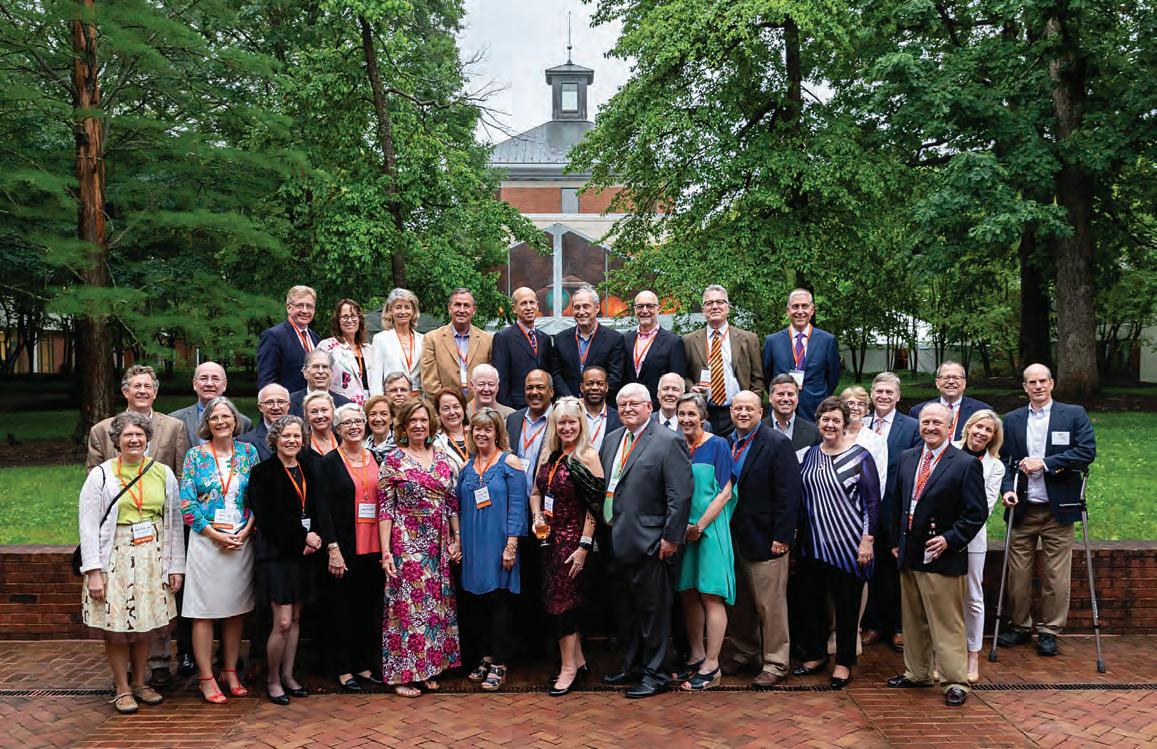
facebook.com/uvalaw youtube.com/uvalaw instagram.com/uvalaw twitter.com/uvalaw NONPROFIT ORGANIZATION U.S. POSTAGE PAID PERMIT NUMBER 164 CHARLOTTESVILLE, VA UNIVERSITY OF VIRGINIA SCHOOL OF LAW PO BOX 400405 CHARLOTTESVILLE, VA 22904 580 Massie Road Charlottesville, Virginia 22903-1738 VOICE 434.924.3466 TOLL-FREE: 877.307.0158 FAX: 434.296.4838 Events DEC. 7 NEW YORK Yale Club With Dean Risa Goluboff 11:30 A.M.-1:15 P.M. LUNCHEON DEC. 8 WASHINGTON, D.C. The Metropolitan Club With Dean Risa Goluboff 6:30-8:30 P.M. RECEPTION DEC. 13 RICHMOND, VA. The Jefferson Hotel 6-7:30 P.M. RECEPTION Alumni Weekend MAY 12-14 FOR THE CLASSES OF: 1963, 1968, 1973, 1978, 1983, 1988, 1993, 1998, 2003, 2008, 2013, 2018 and the Lile Law Society ALUMNI ARE WELCOME CONNECT WITH ALUMNI AT A RECEPTION NEAR YOU. law.virginia.edu/alumni

 ROBERT LLEWELLYN
From Dean Risa Goluboff
ROBERT LLEWELLYN
From Dean Risa Goluboff

























































 Mary Wood
Mary Wood




















 —TRISTAN DEERING
—TRISTAN DEERING







 THE FAIRFAX COUNTY COURTROOM THAT WAS THE SITE OF THE LEGAL FEUD between Johnny Depp and Amber Heard was teeming with Wahoos, not all of whom were swimming in the same direction.
THE FAIRFAX COUNTY COURTROOM THAT WAS THE SITE OF THE LEGAL FEUD between Johnny Depp and Amber Heard was teeming with Wahoos, not all of whom were swimming in the same direction.







 BY MELISSA CASTRO WYATT
BY MELISSA CASTRO WYATT






 BY MELISSA CASTRO WYATT
BY MELISSA CASTRO WYATT











































 By Marian Anderfuren
By Marian Anderfuren























































































































































 KIARA IMANI ’15 LIT RIOT PRESS
KIARA IMANI ’15 LIT RIOT PRESS







 RICHARD VOIGT ’74 ATMOSPHERE PRESS
RICHARD VOIGT ’74 ATMOSPHERE PRESS
 FULTON BOOKS
FULTON BOOKS




 ROBERT LLEWELLYN
ROBERT LLEWELLYN

